Extension Foundation Online Campus
Resultados de la búsqueda: 241
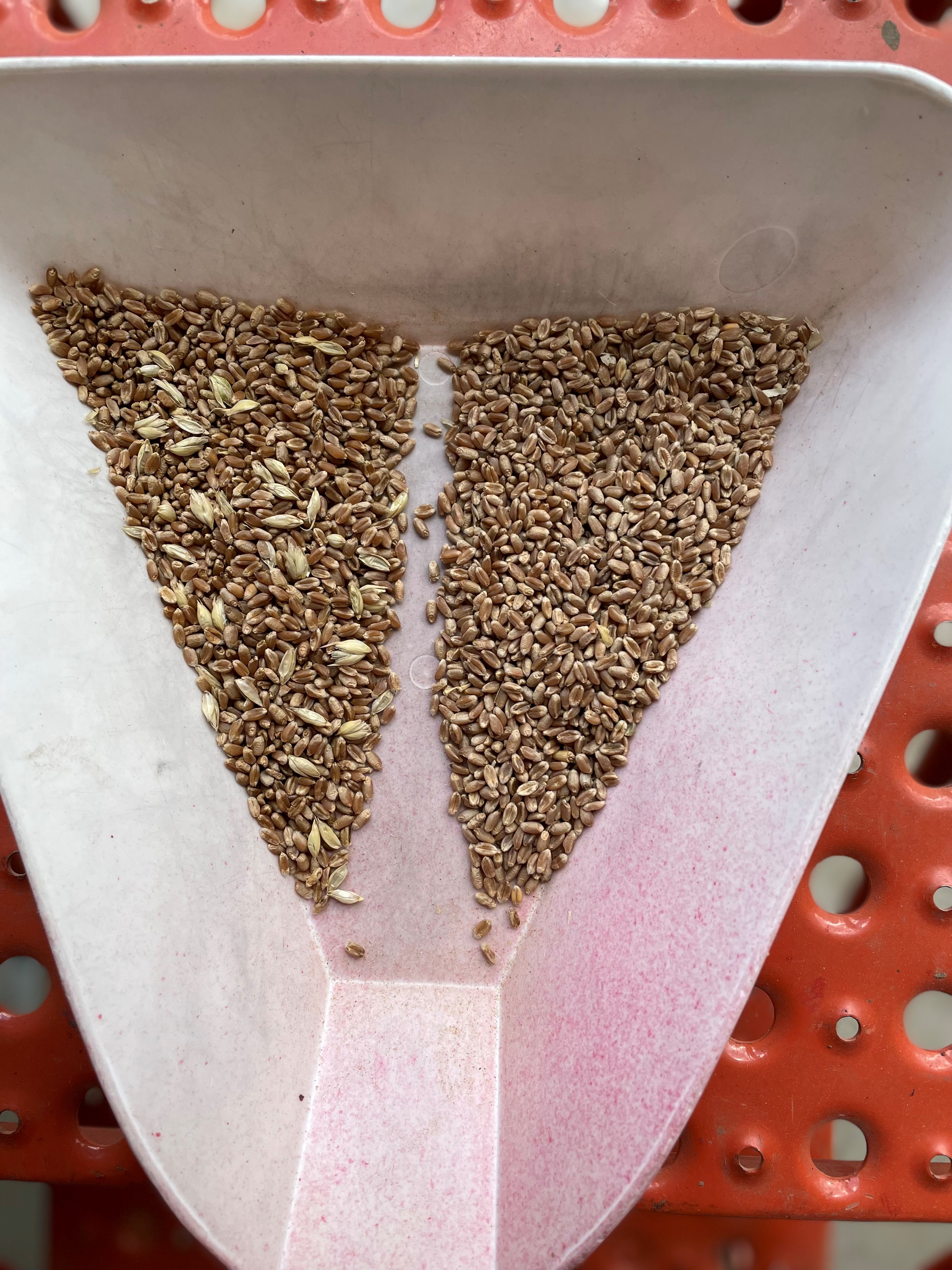
Summary: Seed that comes from the field is never pure, it contains sticks, stems, debris, soil, weed and other crop seeds, trash, and insects. In its simplest form, conditioning is the process of cleaning the seed and removing impurities and contaminates so that the end user receives pure, high-quality seed ready for planting. This course is first in a series which will walk you through foundational concepts of seed conditioning.
Upskill Credentials: If you finish the entire course including passing the quiz with a score of 80% or better (which you can take up to 3 times) and filling out the short 5 mins feedback survey, then you will earn a badge certificate of completion. This course has been approved for 2 Crop Management CEUs through the national Certified Crop Adviser program.
Time Required: We estimate it will take you 2 hours in total to complete the course. You can work on it at your own pace and do not have to complete it in one setting.
ADA Accessibility: We have done our best to follow ADA best practices. Let us know if you run into any problems or require further accommodations.
If you have any questions, please contact your instructor, Laura Pottorff, M.S., Director of Seed Program at: Laura.Pottorff@colostate.edu
Acknowledgements: This online micro-credential upskilling course is offered through the CSU Ag Upskilling program. Development of this content was supported in part by funding from SyncUp Colorado, administered by Colorado State University (2022).
The enrollment fee for this course is $50.
You may also choose to purchase all 7 of the CSU Upskilling Seed Conditioning Courses for a discounted price of $300. To do so, click the link below.
- Teacher: Tamla Blunt
- Teacher: Deana Namuth-Covert
- Teacher: Rick Novak
- Teacher: Laura Pottorff
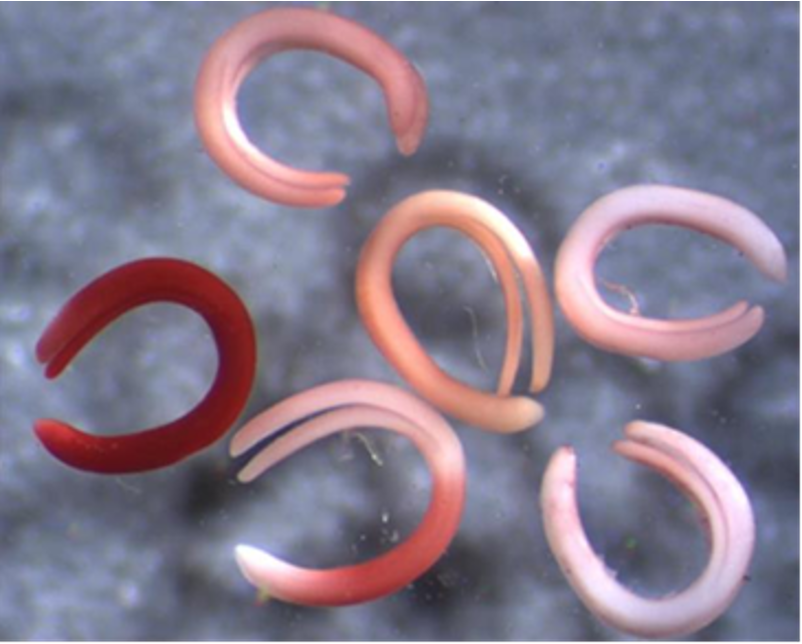
Summary: Seed conditioners play a unique role in modern seed production. Conditioners have the power to increase the quality of poor seed, and decrease the quality of good seed. While a grower has the ability to fine tune the conditions under which the seed crop is grown with fertilizer and water inputs, pest control and tillage to maximize quality, it is up to the conditioner to create the highest quality product out of what they are given. This course is second in a series which will walk you through foundational concepts of seed conditioning.
Upskill Credentials: If you finish the entire course including passing the quiz with a score of 80% or better (which you can take up to 3 times) and filling out the short 5 mins feedback survey, then you will earn a badge certificate of completion. This course has been approved for 2 Crop Management CEUs through the national Certified Crop Adviser program.
Time Required: We estimate it will take you 2 hours in total to complete the course. You can work on it at your own pace and do not have to complete it in one setting. Click on the eBook link below to begin.
ADA Accessibility: We have done our best to follow ADA best practices. Let us know if you run into any problems or require further accommodations.
If you have any questions, please contact your instructor, Laura Pottorff, M.S., Director of Seed Program at: Laura.Pottorff@colostate.edu
Acknowledgements: This online micro-credential upskilling course is offered through the CSU Ag Upskilling program. This material is based upon work that is supported by the National Institute of Food and Agriculture, U.S. Department of Agriculture, under award number 2023-38640-39571 through the Western Sustainable Agriculture Research and Education program under project number WPDP24-021. USDA is an equal opportunity employer and service provider. Any opinions, findings, conclusions, or recommendations expressed in this publication are those of the author(s) and do not necessarily reflect the view of the U.S. Department of Agriculture.
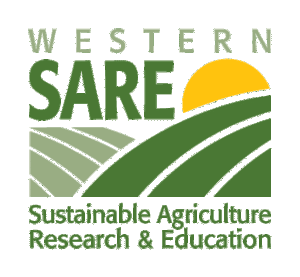
![]()

The enrollment fee for this course is $50.
You may also choose to purchase all 7 of the CSU Upskilling Seed Conditioning Courses for a discounted price of $300. To do so, click the link below.
- Teacher: Tamla Blunt
- Teacher: Deana Namuth-Covert
- Teacher: Rick Novak
- Teacher: Laura Pottorff
Summary: This lesson discusses the importance of plant breeding through history, how one would recognize if the seed they are conditioning is protected by intellectual property rights; and more importantly, what are the mandatory best practices for seed conditioners when handling plant variety protected seed. This course is third in a series which will walk you through foundational concepts of seed conditioning.
Upskill Credentials: If you finish the entire course including passing the quiz with a score of 80% or better (which you can take up to 3 times) and filling out the short 5 mins feedback survey, then you will earn a badge certificate of completion. This course has been approved for 2 Crop Management CEUs through the national Certified Crop Adviser program.
Time Required: We estimate it will take you 2 hours in total to complete the course. You can work on it at your own pace and do not have to complete it in one setting. Click on the eBook link below to begin.
ADA Accessibility: We have done our best to follow ADA best practices. Let us know if you run into any problems or require further accommodations.
If you have any questions, please contact your instructor, Laura Pottorff, M.S., Director of Seed Program at: Laura.Pottorff@colostate.edu
Acknowledgements: This online micro-credential upskilling course is offered through the CSU Ag Upskilling program. This material is based upon work that is supported by the National Institute of Food and Agriculture, U.S. Department of Agriculture, under award number 2023-38640-39571 through the Western Sustainable Agriculture Research and Education program under project number WPDP24-021. USDA is an equal opportunity employer and service provider. Any opinions, findings, conclusions, or recommendations expressed in this publication are those of the author(s) and do not necessarily reflect the view of the U.S. Department of Agriculture.

![]()

The enrollment fee for this course is $50.
You may also choose to purchase all 7 of the CSU Upskill Seed Conditioning Courses for a discounted price of $300. To do so, click the link below.
- Teacher: Tamla Blunt
- Teacher: Deana Namuth-Covert
- Teacher: Rick Novak
- Teacher: Laura Pottorff
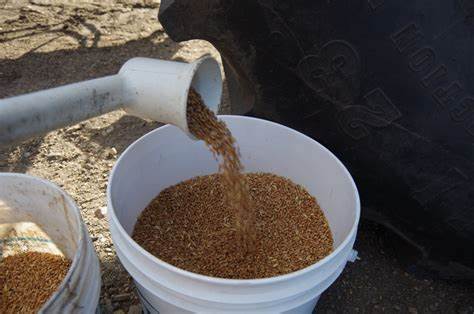
Summary: Seed conditioners process, handle and store seed. All these actions may influence the quality of the seed and therefore the conditioner may share in potential liability should the seed quality be compromised, contaminated or damaged during possession. Documenting the contents of seed received helps protect the conditioner from potential liability. Seed sampling should occur at multiple stages of receiving, processing and handling; it is important to select a representative sample of a seed lot. When a sample is created and viewed by conditioning personnel or sent to a testing laboratory the results obtained from the test are used to indicate the overall quality of the entire lot, make decisions as to what machinery should be used and eventually how to label the finished product. As a result, using a careful and representative method of sampling is required. This course is fourth in a series which will walk you through foundational concepts of seed conditioning.
Upskill Credentials: If you finish the entire course including passing the quiz with a score of 80% or better (which you can take up to 3 times) and filling out the short 5 mins feedback survey, then you will earn a badge certificate of completion. This course has been approved for 2 Crop Management CEUs through the national Certified Crop Adviser program.
Acknowledgements: This online micro-credential upskilling course is offered through the CSU Ag Upskilling program. This material is based upon work that is supported by the National Institute of Food and Agriculture, U.S. Department of Agriculture, under award number 2023-38640-39571 through the Western Sustainable Agriculture Research and Education program under project number WPDP24-021. USDA is an equal opportunity employer and service provider. Any opinions, findings, conclusions, or recommendations expressed in this publication are those of the author(s) and do not necessarily reflect the view of the U.S. Department of Agriculture.

![]()

The enrollment fee for this course is $50.
You may also choose to purchase all 7 of the CSU Upskilling Seed Conditioning Courses for a discounted price of $300. To do so, click the link below.
- Teacher: Tamla Blunt
- Teacher: Deana Namuth-Covert
- Teacher: Rick Novak
- Teacher: Laura Pottorff
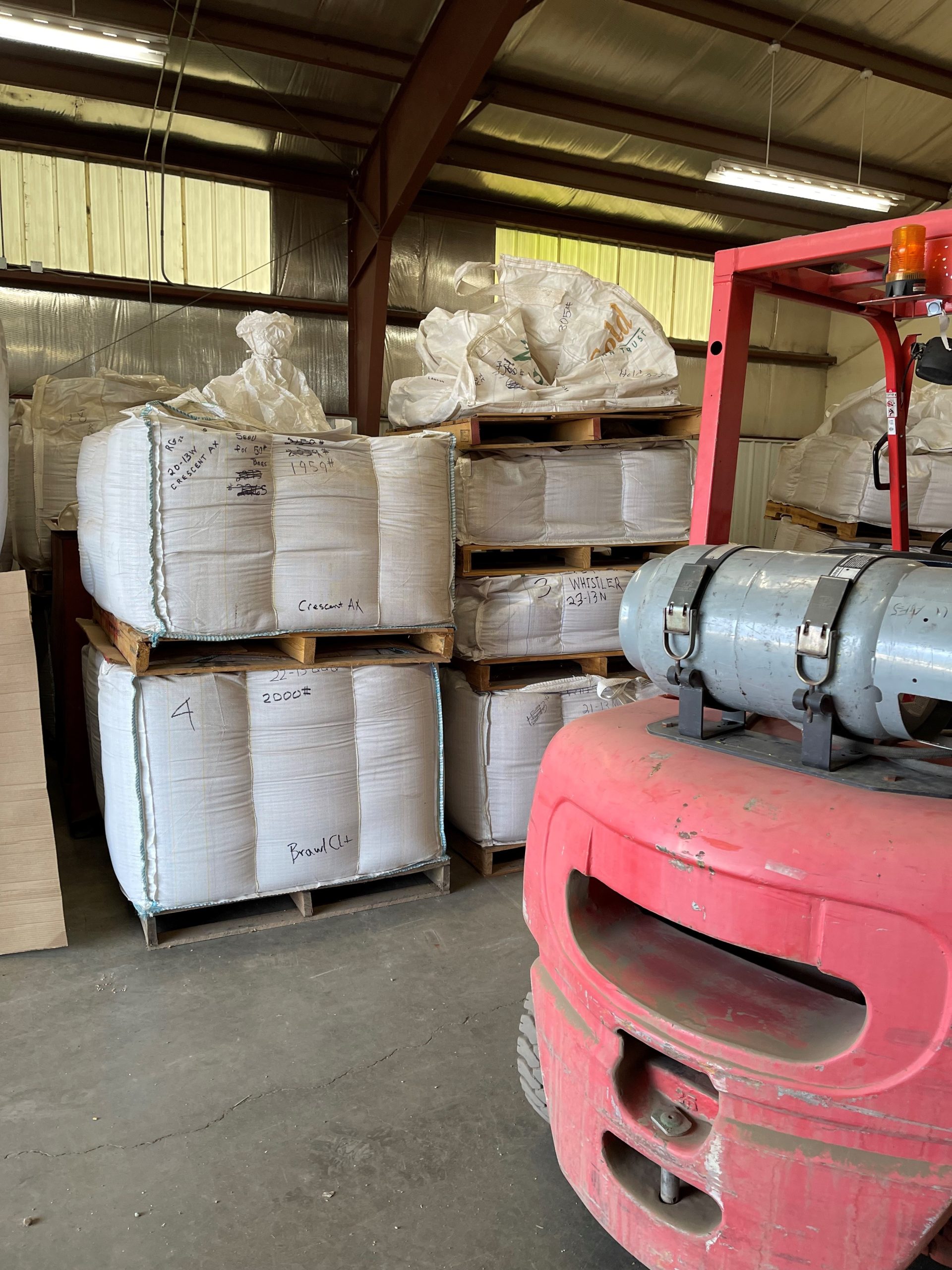
Summary: Seed lots are not always used entirely each planting season. Seed that was purchased or grown this year may require storage to be carried over to subsequent planting seasons. When seed is carried over, it is expected to be of the same quality as seed that was recently produced. As a result, understanding the best possible methods for carrying over seed to maintain high germination and viability is crucial.
This course is sixth in a series which will walk you through foundational concepts of seed conditioning.Upskill Credentials: If you finish the entire course including passing the quiz with a score of 80% or better (which you can take up to 3 times) and filling out the short 5 mins feedback survey, then you will earn a badge certificate of completion. This course has been approved for 2 Crop Management CEUs through the national Certified Crop Adviser program.
Acknowledgements: This online micro-credential upskilling course is offered through the CSU Ag Upskilling program. This material is based upon work that is supported by the National Institute of Food and Agriculture, U.S. Department of Agriculture, under award number 2024-68018-42796, administered by Colorado State University. USDA is an equal opportunity employer and service provider. Any opinions, findings, conclusions, or recommendations expressed in this publication are those of the author(s) and do not necessarily reflect the view of the U.S. Department of Agriculture.

The enrollment fee for this course is $50.
You may also choose to purchase all 7 of the CSU Upskilling Seed Conditioning Courses for a discounted price of $300. To do so, click the link below.
- Teacher: Tamla Blunt
- Teacher: Deana Namuth-Covert
- Teacher: Rick Novak
- Teacher: Laura Pottorff
This course has been replaced. Please visit the new course site to register and complete the course.
Transportation workers and others who need to flag traffic on public and private roadways in Nebraska who take this course will be able to successfully complete the required tasks of a flagger: Guide traffic through work areas; Protect workers; Prevent unreasonable delays for road users; and Answer motorists’ questions politely and knowledgeably.
This course is for all new certification enrollees after March 26, 2018. To access a certificate earned or finish a course begun prior to that date, visit the prior version of the course.
For information or to enroll in the 2018 course contact: Megan Patent-Nygren, University of Nebraska-Lincoln, Local Technical Assistance Program, mpatentnygren2@unl.edu
- Teacher: Megan Patent-Nygren
This self-directed course, composed of 8 modules, is designed for frontline 4-H Youth Development Staff interested in learning how multiple forms of data (4-H Common Measures data and Lesson Study data) can be used to help make decisions in regards to program improvement and professional development opportunities.
Through the learning modules, you gain the knowledge to effectively leverage Common Measure 2.0 to get the youth-generated data you need to assess a program and make it even better. You’ll have the data to better understand how and what youth are learning in each of the major 4-H areas of emphasis. And you’ll learn how to use these tools and the data to make meaningful decisions about your local programs. You’ll also learn how Lesson Study can help take the guesswork out of professional development and program improvement. It’s all about becoming an even more effective leader, educator and mentor for young people. And that leads to even greater confidence, satisfaction and passion as you work with youth.
Through a deeper dive into 4-H Common Measures and Lesson Study, participants will have an increased understanding of basic program evaluation practices, will learn how to successfully access and implement 4-H Common Measures and Lesson Study, and ultimately will understand how when paired together result in making data-driven decisions.
For more information or to enroll please contact: Jessica Mullendore at jmullendore@unl.edu
- Instructors: Makayla Burg
- Instructors: Jill Lingard
- Instructors: Seth Teager
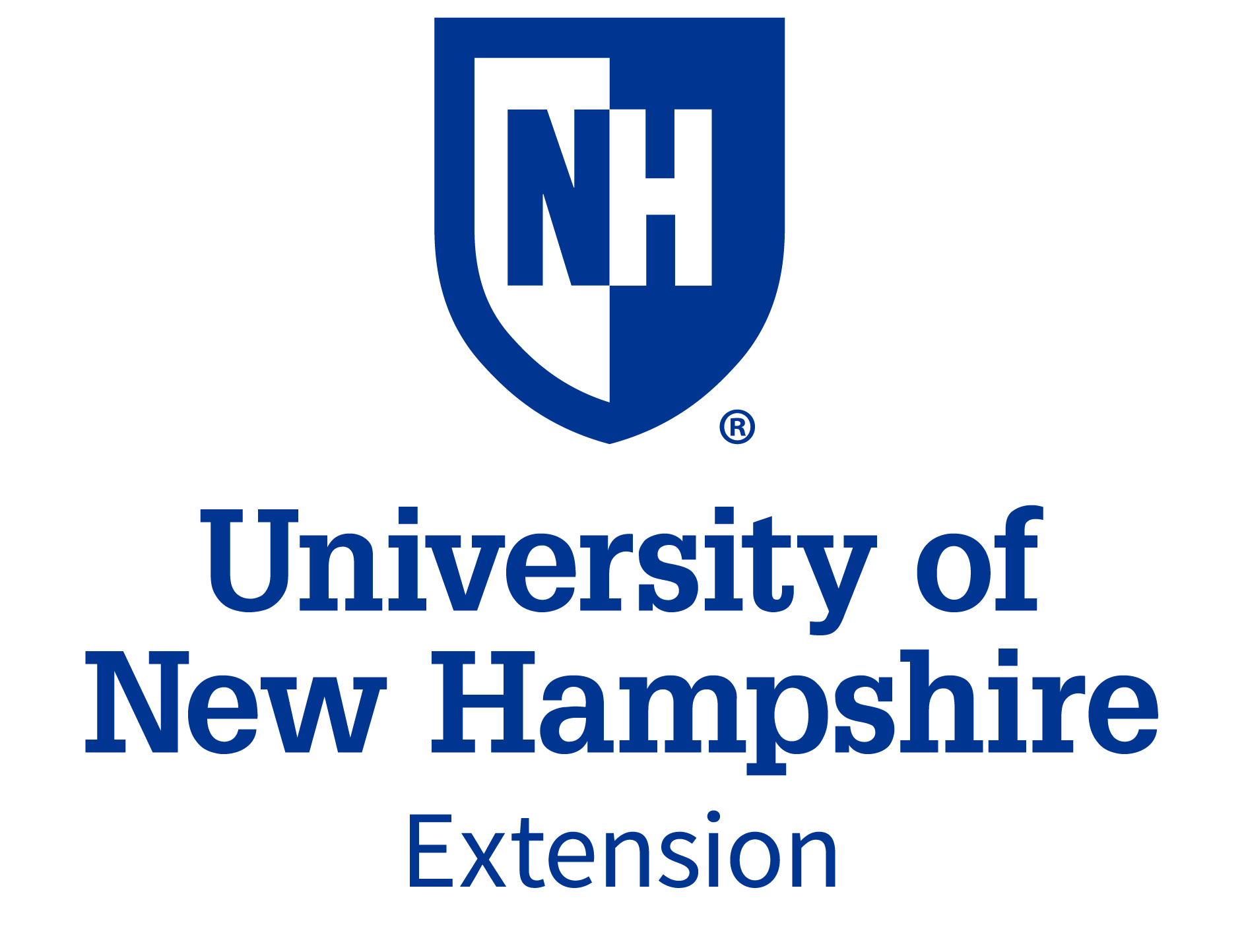
For more information or to enroll contact Rachel Maccini, Pesticide Safety Education Program Coordinator, University of New Hampshire.
- Teacher: Rachel Maccini
- Teacher: Peg Shuffstall

Pesticide product labeling is the
main method of communication between a pesticide manufacturer and pesticide
users. The information printed on or attached to the pesticide container is the
label. Labeling includes the label plus all other information you
receive from the manufacturer about the product when you buy it.
Credits for this course are currently available for New Hampshire, Maine, Vermont, Massachusetts, Connecticut, Rhode Island and Pennsylvania.
For more information or to enroll please contact Rachel Maccini, Pesticide Safety Education Program Coordinator, University of New Hampshire.
The fee for this course is $40. To purchase and enroll in it, select the following button:
- Teacher: Rachel Maccini

This course is designed to remind applicators to the severity of pesticide poisoning and how this poisoning depends on the pesticide's chemical makeup and formulation, its path into the body, the amount that enters the body, and the length of exposure. Wearing PPE can greatly reduce the potential for dermal, inhalation, eye, and oral exposure, and thereby significantly reducing the chances of a pesticide poisoning, but it does not necessarily eliminate it.
Credits for this course are currently available for New Hampshire, Maine, Vermont, Massachusetts, Connecticut, Rhode Island and Pennsylvania.
- Teacher: Rachel Maccini

This class will help guide you in identifying dangerous situations, taking preventative measures to minimize risks, and responding appropriately when an accident occurs. Preparation is key to safeguarding yourself and your employees.
Credits for this course are currently available for New Hampshire, Maine, Vermont, Massachusetts, Connecticut, Rhode Island and Pennsylvania.
The fee for this course is $40. To purchase and enroll in the course, select the following button:
- Teacher: Rachel Maccini

Proper disposal of pesticides and pesticide containers is an important phase of pest management an improperly disposed product can be hazardous to people and the environment. READ THE PRODUCT LABEL for specific disposal information.
Credits for this course are currently available for New Hampshire, Maine, Vermont, Massachusetts, Connecticut, Rhode Island and Pennsylvania.
The fee for this course is $40. To purchase and enroll in the course, click the button below:
- Teacher: Rachel Maccini

This course was designed as an interactive course. It will require you to read through a variety of different pesticide labels and choose the best product to handle a situation provided to you. You will be able to choose any product provided, however when you make a choice that is not the best choice you will be faced with some consequences. It will be important that you read the labels thoroughly and choose the best product.
For more information, please contact Rachel Maccini
- Teacher: Rachel Maccini

Credits for this course are currently available for New Hampshire, Maine, Vermont, Massachusetts, Connecticut, Rhode Island and Pennsylvania.
- Teacher: Rachel Maccini

Pesticide Applicator recertification credits for a variety of subjects including backpack sprayers and the label.
Credits for this course are currently available for New Hampshire, Maine, Vermont, Massachusetts, Connecticut, Rhode Island and Pennsylvania.
For more information or to enroll please contact Rachel Maccini, Pesticide Safety Education Program Coordinator, University of New Hampshire.
- Teacher: Rachel Maccini

By taking this course, students will learn:
The Worker Protection Standard (WPS) is a regulation developed by the United States Environmental Protection Agency (EPA) to protect workers and handlers from the harmful effects of pesticides and their residues. The standard went through some major
revisions in 2015 and this course will reflect those changes.
This course will cover some of the major points of the Worker Protection Standard and what employers need to cover with their employees in order to comply.
Once you've completed this course, you should be able to:
- Define a worker and a handler
- Understand the importance of the WPS
- Know when compliance is necessary
- Identify the basic requirements needed by both a worker and handler to reduce their pesticide exposure
Watch the presentation from beginning to end. There are review questions interspersed to help you review the information. When you feel you are comfortable with the information, take the final assessment below Jeopardy game.
For more information please contact Rachel Maccini, Pesticide Safety Education Program Coordinator, University of New Hampshire, Cooperative Extension.
The fee for the course is $40. To purchase and enroll in the course, click the following button:
- Teacher: Rachel Maccini
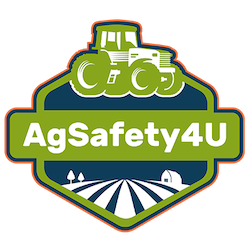
AgSafety4u 2.0 provides an overview of identification and control of hazards common to farms and agriculturally related rural businesses, focusing on hazards associated with machinery, structures, equipment, animals, chemicals and outdoor environment. Learning objectives for Agricultural Employees, Employers and other rural workers who take the course are to a) Describe principles of hazard identification and control and b) Recognize hazards found on farms and in agriculturally related rural businesses.
Additional information about the course can be found at https://ag-safety.extension.org/agsafety4u-certificate-course/
Course Fee: $10. Click here to purchase and enroll in this course:
For additional information, contact Aaron M. Yoder (aaron.yoder@unmc.edu).
- Teacher: Deana Namuth-Covert
- Teacher: Aaron Yoder
American Citizen Planner - Indiana Comprehensive Exam is an online exam and certificate course.
For more information contact Daniel Walker at walke422@purdue.edu.
This course is available for a fee of $200 as part of a bundle that includes ACP-Indiana 101, 201, and Comprehensive Exam. To purchase this bundle of courses, click the following button.
- Teacher: Daniel Earl Walker
American Citizen Planner National Exam is an online exam and certificate course.
For more information contact Kara Salazar (salazark@purdue.edu).
The fee for this exam is $50. To purchase access to the exam, click the following button:
- Teacher: Kelsey Johnson
- Teacher: Rebecca Roberts
This course serves as a tool for small flock, backyard, homestead, and hobby poultry owners to become more informed on avian influenza (AI). You will learn how AI can affect you and your flocks, biosecurity measures that should be practiced to prevent disease and how to respond and recover in an event of an outbreak. Upon completion of this course you may take the final exam to receive your Avian Influenza Biosecurity Certificate. This course material may be reproduced free of charge for public use, however, it is not be be used for profit or financial gain.
Any questions about this course should be directed to Nathaniel Tablante at nlt@umd.edu
To learn more you may want to visit the eXetension Avian Influenza Homepage or the Avian Influenza Facebook Page
- Teacher: Brett Kreifels
Avian Influenza Biosecurity for Emergency Responders is a self-directed certification course designed for emergency response personnel. Participants will gain vital information on bio-security measures and emergency management procedures that are necessary to prevent, contain, and recover an avian influenza outbreak. For more information contact Nathaniel Tablante, University of Maryland at nlt@umd.edu.
- Teacher: Brett Kreifels
For more information about this course contact Nathaniel Tablante, University of Maryland at nlt@umd.edu.
- Teacher: Brett Kreifels
Knowing general information about horse welfare, behavior, nutrition, health and regulations is essential to keeping your horse happy and healthy. This learning module gives an overview of the care and management of horses, with information ranging from daily health checks to management & control of diseases and parasites.
For information contact Colleen Brady, at bradyc@purdue.edu.
The fee for this course is $10. To purchase and enroll in the course, click the following button:
If you purchase at least $40 worth of courses from this category, you can receive a 20% discount by entering the voucher code of HorseQuest20.
- Teacher: Kathy Anderson
- Teacher: Colleen Brady
Basic Radio 101 for North Dakota Emergency Responders is a self-directed course for paid and volunteer people who serve in EMS, law enforcement, firefighting and other first responder activities. Participants will learn how to use their radios appropriately, protocols to follow and how to troubleshoot common problems. For more information, contact Brenda Vossler, N.D. Department of Emergency Services training and exercise officer, at (701) 328-8106 or blvossler@nd.gov. For technical support, contact Becky Koch, (701) 231-7875 or becky.koch@ndsu.edu, with North Dakota State University Agriculture Communication.
- Teacher: Becky Koch
For more information contact Kathy Anderson, University of Nebraska, at kanderson1@unl.edu
The fee for this course is $10. To purchase and enroll in it, click the button below:
If you purchase at least $40 worth of courses from this category, you can receive a 20% discount by entering the voucher code of HorseQuest20.
- Teacher: Kathy Anderson
- Teacher: Colleen Brady
- Teacher: Steve Pritchard
- Teacher: Troy Walz
Beginning Horseman: 4-H Level 1 is a course for youth 8 to 18 years old
Youth will learn correct and safe handling and riding principles for the beginner horseman.
For more information contact: Lena Luck at University of Nebraska-Lincoln, email address at lena.luck@unl.edu
- Extension Horse Specialist: Lena Luck
Bluebonnet Feeds Equine Nutrition Course is offered from the HorseQuest CoP for Bluebonnet Feed dealers and clients to learn the basics of equine nutrition.
Cost = $50 for 30 days
For more information please contact Kathy Anderson, University of Nebraska-Lincoln, at kanderson1@unl.edu.
Click this button to enroll in this course:
- Teacher: Kathy Anderson
- Teacher: Colleen Brady
- Teacher: Kris Hiney
The City of Bozeman Advisory Board Member Training is intended for the City Advisory Board Members of Bozeman, Montana. This is a self directed course, which should take less than one hour to complete. This course is intended to educate employees and public officials in best practices and legal requirements. It details specific ethical requirements and provides guidance on obtaining information and filing complaints. For detailed instructions on how to login and enroll in this course, take a few minutes and read through the Enrollment Instructions & Helpful Tips document.
For questions or concerns regarding this course, contact Brenda Sweeney, Deputy City Clerk, at (406) 582-2320 or bsweeney@bozeman.net.
- Teacher: Ashley Kent
- Teacher: Lydia Maunz
The audience for this Buying a Tractor course is Farmers and land owners who are interested in learning how to select the correct tractor for the intended purpose.
For more information or to enroll please contact: Mark Hall, Auburn University/ Alabama Cooperative Extension System, at hallmah@auburn.edu
- Teacher: John Fulton
This course was developed primarily for professional pesticide applicators working in Right of Way, but can be helpful to anyone who applies pesticides as part of their employment. Students will learn the importance of adding the correct amount of pesticide
to a mix, to calculate the area or volume to be treated and to calculate the right amount of pesticides. If you are a pesticide applicator who is seeking recertification or just want to increase your general knowledge of pesticide calculations
this course is for you. Each example and problem is category specific.
For more information contact Rachel Maccini.
The fee for this course is $40. To purchase and enroll in the course, click the following button:
- Teacher: Rachel Maccini
This course was developed primarily for professional pesticide applicators working in Structural Pest Control, but can be helpful to anyone who applies pesticides as part of their employment Students will learn the importance of adding the correct amount of pesticide to a mix, to calculate the area or volume to be treated and to calculate the right amount of pesticides. If you are a pesticide applicator who is seeking recertification or just want to increase your general knowledge of pesticide calculations this course is for you. Each example and problem is category specific.\
For more information contact Rachel Maccini.
For more information contact Rachel Maccini.
- Teacher: Rachel Maccini
This course was developed primarily for professional pesticide applicators working in Turf, but can be helpful to anyone who applies pesticides as part of their employment. Students will learn the importance of adding the correct amount of pesticide to a mix, to calculate the area or volume to be treated and to calculate the right amount of pesticides. If you are a pesticide applicator who is seeking recertification or just want to increase your general knowledge of pesticide calculations this course is for you. Each example and problem is category specific.
For more information contact Rachel Maccini.
The fee for this course is $40. To purchase and enroll in the course, click the following button:
- Teacher: Rachel Maccini
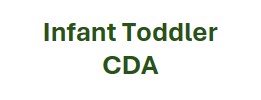
This is a restricted course and only available to participants accepted into the University of Nevada Reno, Extension CDA Training and Coaching Program.
- Teacher: Desiree Cabacar
- Teacher: Savannah Castanon
- Teacher: Janelle Jamero
- Teacher: Cathryn Peshlakai
- Teacher: Erin Skaggs
- Teacher: Rebecca Vizina
- Teacher: Lisa Whipple
- Teacher: Sarah Wright

This is a restricted course and available only for enrolled Child Development Associate Students.
- Teacher: Savannah Castanon
- Teacher: Janelle Jamero
- Teacher: Cathryn Peshlakai
- Teacher: Erin Skaggs
- Teacher: Rebecca Vizina
- Teacher: Lisa Whipple
- Teacher: Sarah Wright

This is a restricted course and available only for enrolled Child Development Associate Students.
- Teacher: Janelle Jamero
- Teacher: Cathryn Peshlakai
- Teacher: Erin Skaggs
- Teacher: Rebecca Vizina
- Teacher: Lisa Whipple
- Teacher: Sarah Wright

This is a restricted course and available only for enrolled Child Development Associate Students.
- Teacher: Janelle Jamero
- Teacher: Cathryn Peshlakai
- Teacher: Erin Skaggs
- Teacher: Rebecca Vizina
- Teacher: Lisa Whipple
- Teacher: Sarah Wright

This is a restricted course and available only for enrolled Child Development Associate Students.
- Teacher: Janelle Jamero
- Teacher: Cathryn Peshlakai
- Teacher: Erin Skaggs
- Teacher: Rebecca Vizina
- Teacher: Lisa Whipple
- Teacher: Sarah Wright

This is a restricted course and available only for enrolled Child Development Associate Students.
- Teacher: Janelle Jamero
- Teacher: Cathryn Peshlakai
- Teacher: Erin Skaggs
- Teacher: Rebecca Vizina
- Teacher: Lisa Whipple
- Teacher: Sarah Wright

This is a restricted course and available only for enrolled Child Development Associate Students.
- Teacher: Janelle Jamero
- Teacher: Cathryn Peshlakai
- Teacher: Erin Skaggs
- Teacher: Rebecca Vizina
- Teacher: Lisa Whipple
- Teacher: Sarah Wright

This is a restricted course and available only for enrolled Child Development Associate Students.
- Teacher: Janelle Jamero
- Teacher: Cathryn Peshlakai
- Teacher: Erin Skaggs
- Teacher: Rebecca Vizina
- Teacher: Lisa Whipple
- Teacher: Sarah Wright

This is a restricted course and available only for enrolled Child Development Associate Students.
- Teacher: Janelle Jamero
- Teacher: Cathryn Peshlakai
- Teacher: Erin Skaggs
- Teacher: Rebecca Vizina
- Teacher: Lisa Whipple
- Teacher: Sarah Wright

This is a restricted course and only available to participants accepted into the University of Nevada Reno, Extension CDA Training and Coaching Program.
- Teacher: Marybel Arreguin-Lopez
- Teacher: Desiree Cabacar
- Teacher: Savannah Castanon
- Teacher: Maria Jake
- Teacher: Janelle Jamero
- Teacher: Cathryn Peshlakai
- Teacher: Chelsie Shurtleff
- Teacher: Erin Skaggs
- Teacher: Shanell Townsend
- Teacher: Rebecca Vizina
- Teacher: Sarah Wright

- Teacher: Marybel Arreguin-Lopez
- Teacher: Desiree Cabacar
- Teacher: Savannah Castanon
- Teacher: Maria Jake
- Teacher: Janelle Jamero
- Teacher: Cathryn Peshlakai
- Teacher: Chelsie Shurtleff
- Teacher: Erin Skaggs
- Teacher: Shanell Townsend
- Teacher: Lisa Whipple
- Teacher: Sarah Wright

This course is restricted and only available to participants registered in University of Nevada Reno, Extension CDA Program.
- Teacher: Desiree Cabacar
- Teacher: Savannah Castanon
- Teacher: Maria Jake
- Teacher: Cathryn Peshlakai
- Teacher: Chelsie Shurtleff
- Teacher: Shanell Townsend
- Teacher: Lisa Whipple
- Teacher: Sarah Wright

This course is restricted and only available to participants registered in University of Nevada Reno, Extension CDA Program.
- Teacher: Desiree Cabacar
- Teacher: Savannah Castanon
- Teacher: Maria Jake
- Teacher: Cathryn Peshlakai
- Teacher: Shanell Townsend
- Teacher: Lisa Whipple
- Teacher: Sarah Wright

This course is restricted and only available to participants registered in University of Nevada Reno, Extension CDA Program.
- Teacher: Marybel Arreguin-Lopez
- Teacher: Desiree Cabacar
- Teacher: Savannah Castanon
- Teacher: Maria Jake
- Teacher: Cathryn Peshlakai
- Teacher: Erin Skaggs
- Teacher: Shanell Townsend
- Teacher: Lisa Whipple
- Teacher: Sarah Wright

This course is restricted and only available to participants registered in University of Nevada Reno, Extension CDA Program.
- Teacher: Desiree Cabacar
- Teacher: Savannah Castanon
- Teacher: Maria Jake
- Teacher: Janelle Jamero
- Teacher: Cathryn Peshlakai
- Teacher: Erin Skaggs
- Teacher: Shanell Townsend
- Teacher: Lisa Whipple
- Teacher: Sarah Wright

This course is restricted and only available to participants registered in University of Nevada Reno, Extension CDA Program.
- Teacher: Desiree Cabacar
- Teacher: Savannah Castanon
- Teacher: Maria Jake
- Teacher: Janelle Jamero
- Teacher: Cathryn Peshlakai
- Teacher: Erin Skaggs
- Teacher: Shanell Townsend
- Teacher: Lisa Whipple
- Teacher: Sarah Wright

This course is restricted and only available to participants registered in University of Nevada Reno, Extension CDA Program.
- Teacher: Desiree Cabacar
- Teacher: Savannah Castanon
- Teacher: Maria Jake
- Teacher: Robin Marx-Mackerley
- Teacher: Cathryn Peshlakai
- Teacher: Shanell Townsend
- Teacher: Lisa Whipple
- Teacher: Sarah Wright

This course is restricted and only available to participants registered in University of Nevada Reno, Extension CDA Program.
- Teacher: Desiree Cabacar
- Teacher: Savannah Castanon
- Teacher: Maria Jake
- Teacher: Cathryn Peshlakai
- Teacher: Shanell Townsend
- Teacher: Lisa Whipple
- Teacher: Sarah Wright

This is a restricted course and only available to participants accepted into the University of Nevada Reno, Extension CDA Training and Coaching Program.
- Teacher: Marybel Arreguin-Lopez
- Teacher: Desiree Cabacar
- Teacher: Savannah Castanon
- Teacher: Maria Jake
- Teacher: Stephanie May
- Teacher: Cathryn Peshlakai
- Teacher: Sarah Wright


- Teacher: Marybel Arreguin-Lopez
- Teacher: Maria Jake
- Teacher: Stephanie May
- Teacher: Cathryn Peshlakai
- Teacher: Lisa Whipple
- Teacher: Sarah Wright

This is a restricted course and available only for enrolled CDA Students.

- Teacher: Marybel Arreguin-Lopez
- Teacher: Maria Jake
- Teacher: Stephanie May
- Teacher: Cathryn Peshlakai
- Teacher: Lisa Whipple
- Teacher: Sarah Wright

Este es un curso restringido y disponible solo para estudiantes inscritos en CDA.

- Teacher: Marybel Arreguin-Lopez
- Teacher: Maria Jake
- Teacher: Stephanie May
- Teacher: Cathryn Peshlakai
- Teacher: Lisa Whipple
- Teacher: Sarah Wright

This is a restricted course and available only for enrolled CDA Students.

- Teacher: Marybel Arreguin-Lopez
- Teacher: Maria Jake
- Teacher: Stephanie May
- Teacher: Cathryn Peshlakai
- Teacher: Lisa Whipple
- Teacher: Sarah Wright

This is a restricted course and available only for enrolled CDA Students.

- Teacher: Marybel Arreguin-Lopez
- Teacher: Maria Jake
- Teacher: Stephanie May
- Teacher: Cathryn Peshlakai
- Teacher: Lisa Whipple
- Teacher: Sarah Wright

This is a restricted course and available only for enrolled Child Care Excellence Academy Students.

- Teacher: Marybel Arreguin-Lopez
- Teacher: Maria Jake
- Teacher: Stephanie May
- Teacher: Cathryn Peshlakai
- Teacher: Lisa Whipple
- Teacher: Sarah Wright

This is a restricted course and available only for enrolled CDA Students. 
- Teacher: Marybel Arreguin-Lopez
- Teacher: Savannah Castanon
- Teacher: Maria Jake
- Teacher: Stephanie May
- Teacher: Cathryn Peshlakai
- Teacher: Lisa Whipple
- Teacher: Sarah Wright

This is a restricted course and available only for enrolled CDA Students. 
- Teacher: Marybel Arreguin-Lopez
- Teacher: Maria Jake
- Teacher: Stephanie May
- Teacher: Cathryn Peshlakai
- Teacher: Lisa Whipple
- Teacher: Sarah Wright
This course is intended to satisfy the annual ethics training requirements for the City of Bozeman employees, elected officials and appointed officials. The training is based on the Montana Code Annotated and City of Bozeman policy, and will educate participants in laws, policies, and best practices.
For more information or to enroll please contact: Ashley Kent, Montana State University Extension, ashleykent@montana.edu
- Teacher: Ashley Kent
- Teacher: Lydia Maunz
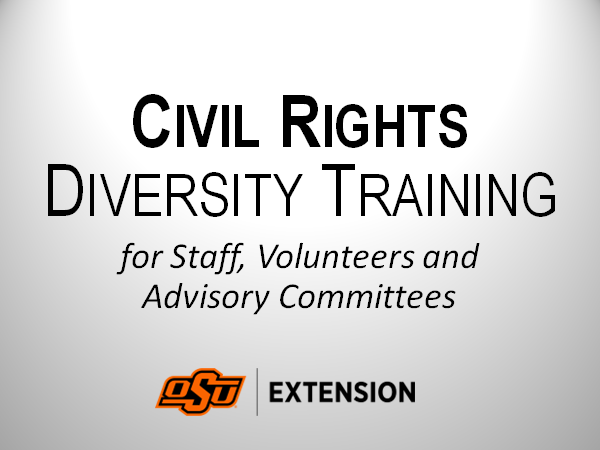

This 12 minute video overview explains our civil rights responsibilities for all Extension staff, volunteers, advisory councils, and committees.
Everyone making a decision or carrying out actions on behalf of Extension is responsible to make sure the program is inclusive as we serve the people of Oklahoma.
For more information contact Leah Haxton, Oklahoma State University, at Leah.g.haxton@okstate.edu or Karla Knoepfli, Oklahoma State University, at karla.knoepfli@okstate.edu
- Teacher: carl hamby
- Teacher: Leah Haxton
- Teacher: Dwayne Hunter
- Teacher: Karla Knoepfli
Listen about some of the cost-share programs offered to help landowners access and manage their forest properties.
1.0 category 1 CEU - $20
- Teacher: Raymond Berthiaume
1.0 Category 1 CEU; $20
- Teacher: Raymond Berthiaume
This training fulfills the need for the accredited food safety training required in LB 304, part of the Nebraska Pure Food Act. This course is specific to Nebraska’s laws and may not reflect those in other states or countries.
This training has been endorsed by: The Nebraska Department of Agriculture and The Douglas County (Nebraska, United States) Health Department.
- Teacher: Cindy Brison, MS, RDN
- Teacher: David Diez
- Teacher: Kezia Huseman
- Teacher: Linda Reddish
- Teacher: Angie Rushman
- Teacher: Deborah Weitzenkamp

This five-module course is designed to support learners in understanding the importance of creating strong partnerships between veterinarians and producers to enhance profitability and sustainability.
What's included:
Video Learning Modules
Module 1 - Communication: A Vital Role in Establishing a Viable Relationship
Module 2 - The Veterinarian-Client-Patient (VCPR) Relationship Mystery
Module 3 - Benefits of a Veterinarian-Client-Patient Relationship (VCPR) for the Use and Accessibility of Drugs
Module 4 - Utilize the Veterinary Feed & Directive and Additional Guidelines in Establishing a VCPR
Module 5 - Distance Animal Care
Study Guides
Resources to support learner engagement while navigating video lessons.
Details
- Self-Paced
- Estimated time of completion: 7 hours
- User must score > 70% on the Post-Test to receive a certificate at the end of the course.
- Teacher: CET Administration
- Teacher: Bette Bittner
- Teacher: CET HelpDesk
- Teacher: Miguel Hoch
- Teacher: Nicola Ritter
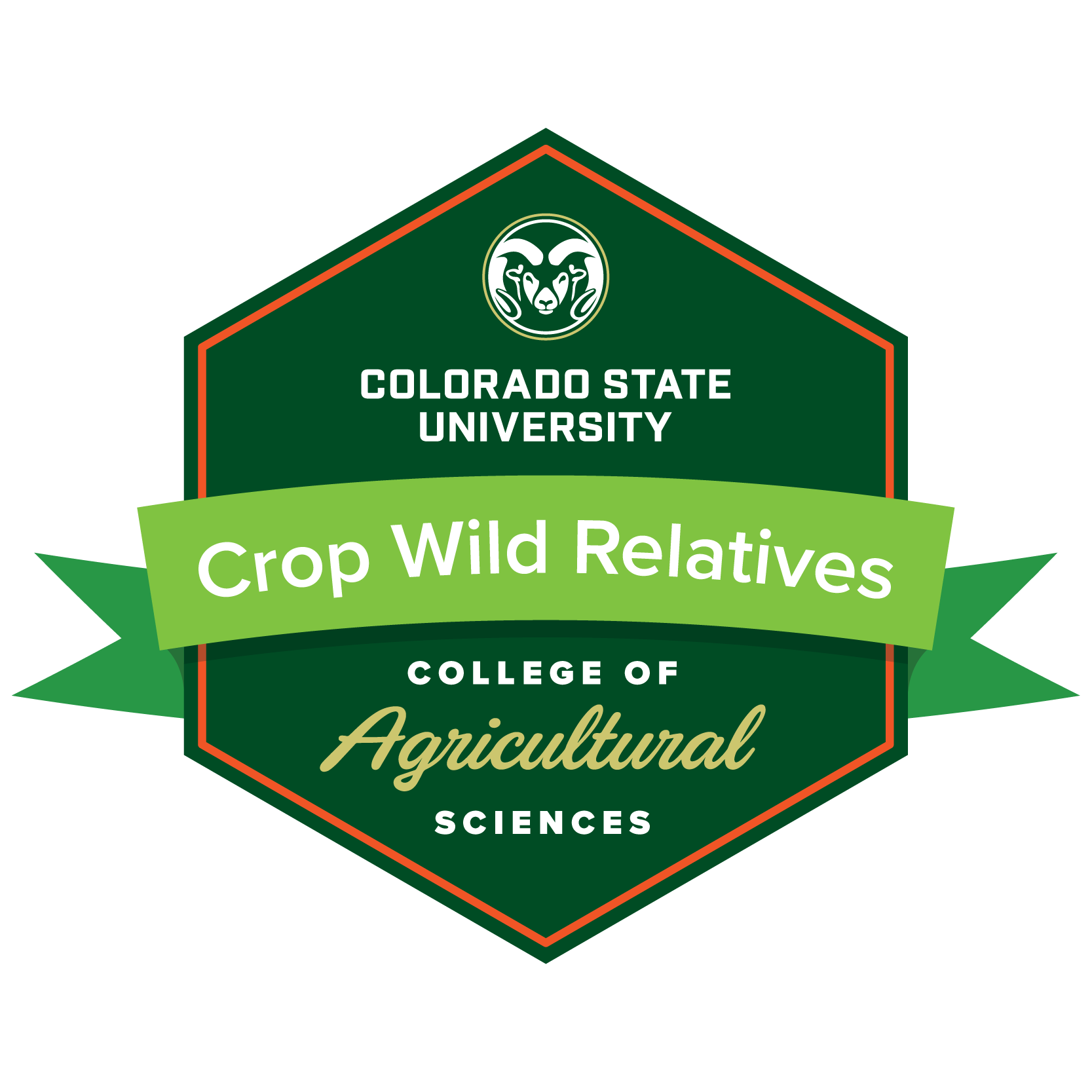
This online mini-course is intended for anyone new to seed science, plant breeding or even general agriculture, about to begin employment in agriculture outside of their family business or wishing to improve their current skills and knowledge.
Development of this Badge Course was made possible through a collaboration between Colorado State University and the United States Department of Agriculture.
This course is supported in part by grant 2020-70003-30930 from the USDA-NIFA Higher Education Challenge Grant Program, administered by Colorado State University. Any opinions, findings, conclusions or recommendations expressed in this publication are those of the author(s) and do not necessarily reflect the views of the USDA-NIFA.

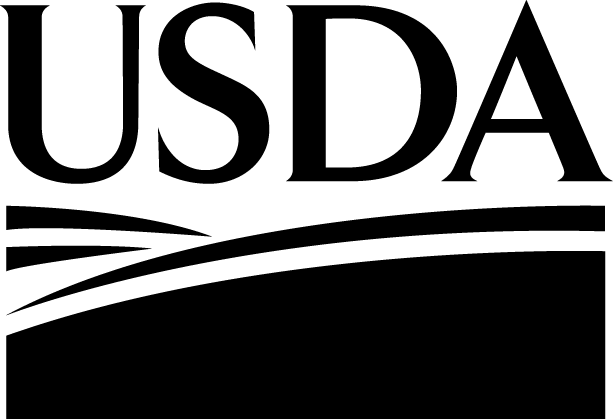
- Teacher: Deana Namuth-Covert
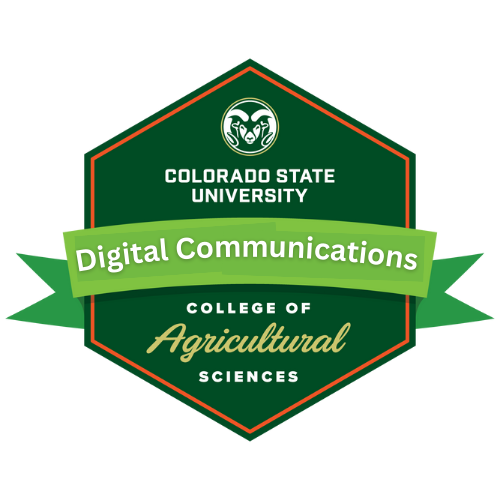
- Teacher: Deana Namuth-Covert
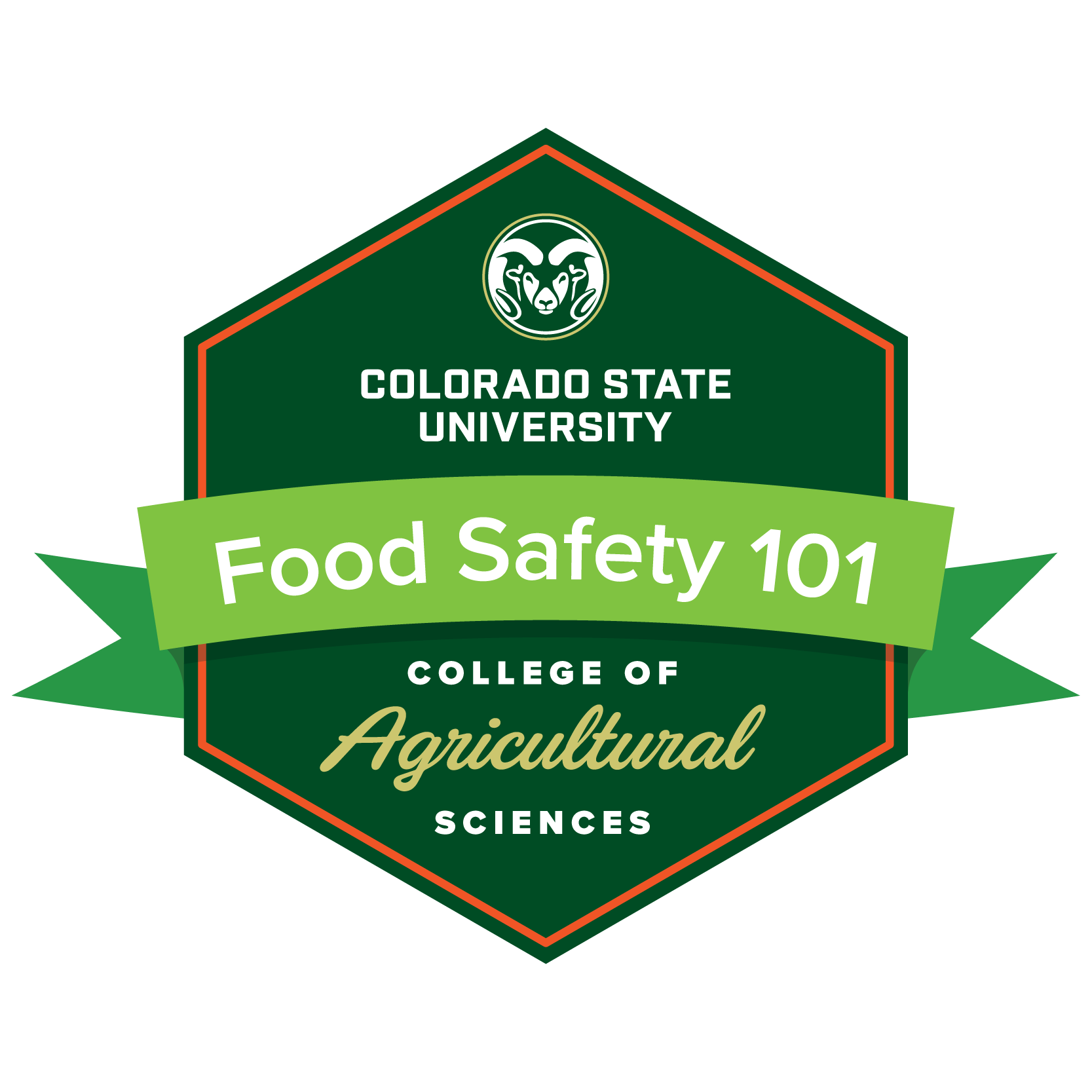
Pilot online course for select Colorado high schools, as part of the CSU Ag Upskilling program. This course is made available by a grant from Zoma Labs support of the SyncUp Colorado program.
Email Deana.Namuth-Covert@colostate.edu for access key code and course instructions.

- Teacher: Tamla Blunt
- Teacher: Deana Namuth-Covert
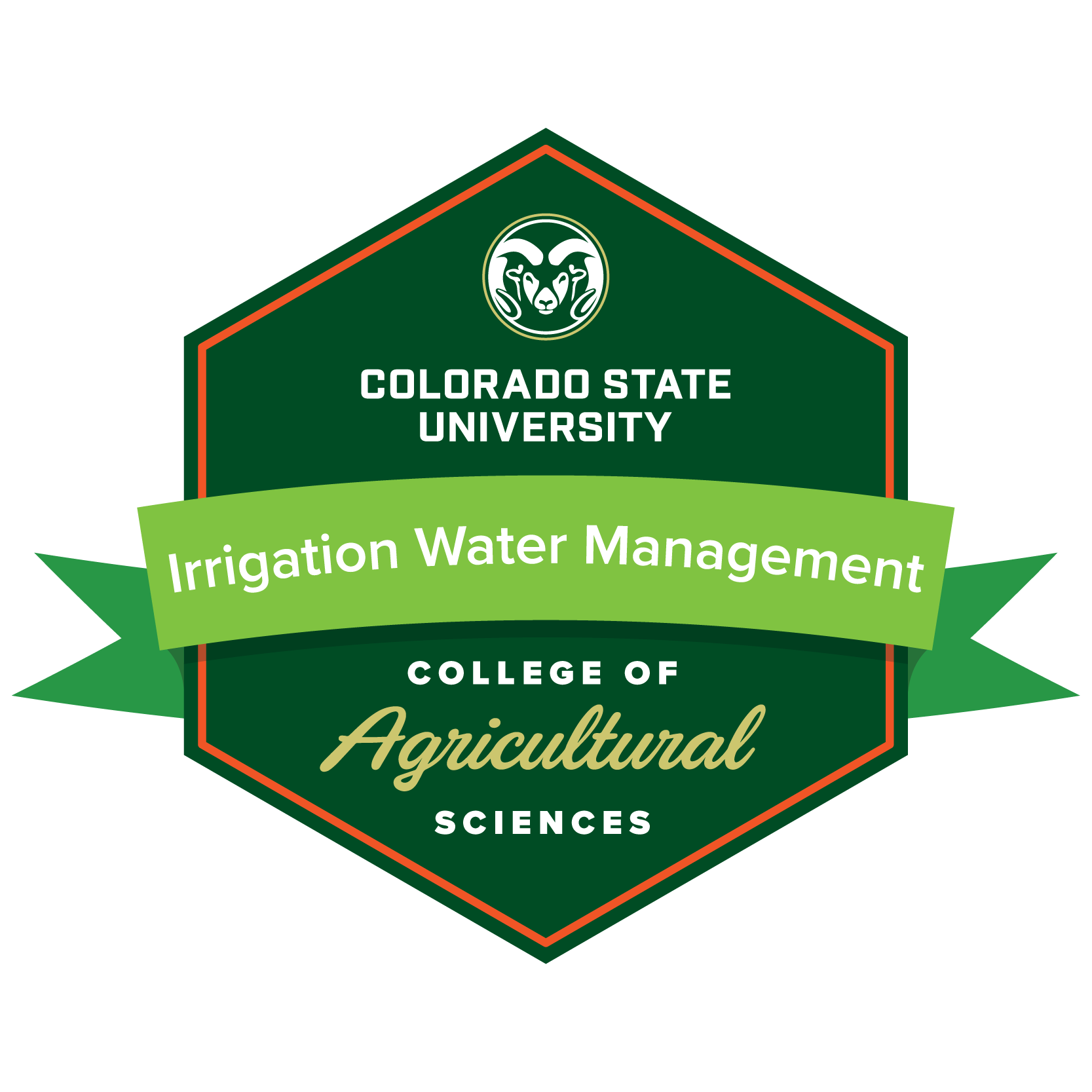
Development of this Badge was supported in part by funding from the CHS Foundation, administered by Colorado State University (2022). The CHS Foundation, funded by charitable gifts from CHS Inc., is focused on developing a new generation of agriculture leaders for life-long success. Together, with our partners, we are igniting innovation and driving excellence in agriculture education, cultivating high impact programs for rural youth and accelerating potential for careers in agriculture.
Learn more at CHS Foundation.
Email Deana.Namuth-Covert@colostate.edu to receive an access key code and course instructions.

- Teacher: Allan Andales
- Teacher: Tamla Blunt
- Teacher: Deana Namuth-Covert
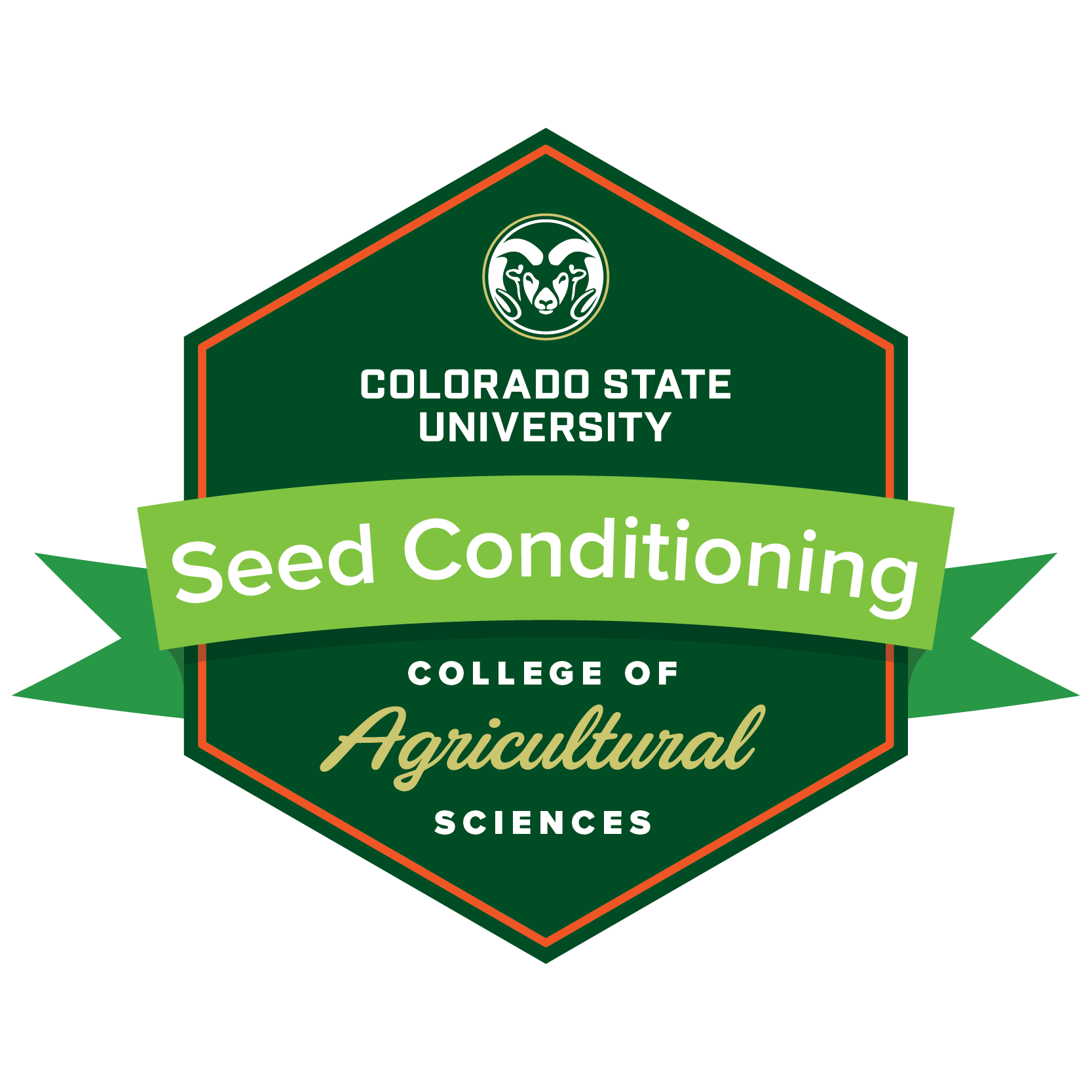
This Seed Conditioning Course is available to high school and college students at no charge thanks to grant funding. It consists of a set of 7 interactive lessons and a final graded quiz. Lessons include: 1) Seed Conditioning Basics, 2) The Influence of Seed Conditioning on Seed Quality, 3) Plant Breeding & Intellectual Property Protection of Seed and Plant Varieties, 4) Sourcing, Sampling and Handling of Unconditioned and Conditioned Seed, 5) Quality Assurance and Seed Conditioning Facility Management, 6) Carryover Seed, Inventory, and Seed Storage and 7) Seedborne Disease and Treatments. Lessons were approved for CEU credit with the national Certified Crop Advisor program.
Please contact Laura Pottorff for more information: Laura.Pottorff@colostate.edu
- Teacher: Tamla Blunt
- Teacher: Deana Namuth-Covert
- Teacher: Rick Novak
- Teacher: Laura Pottorff
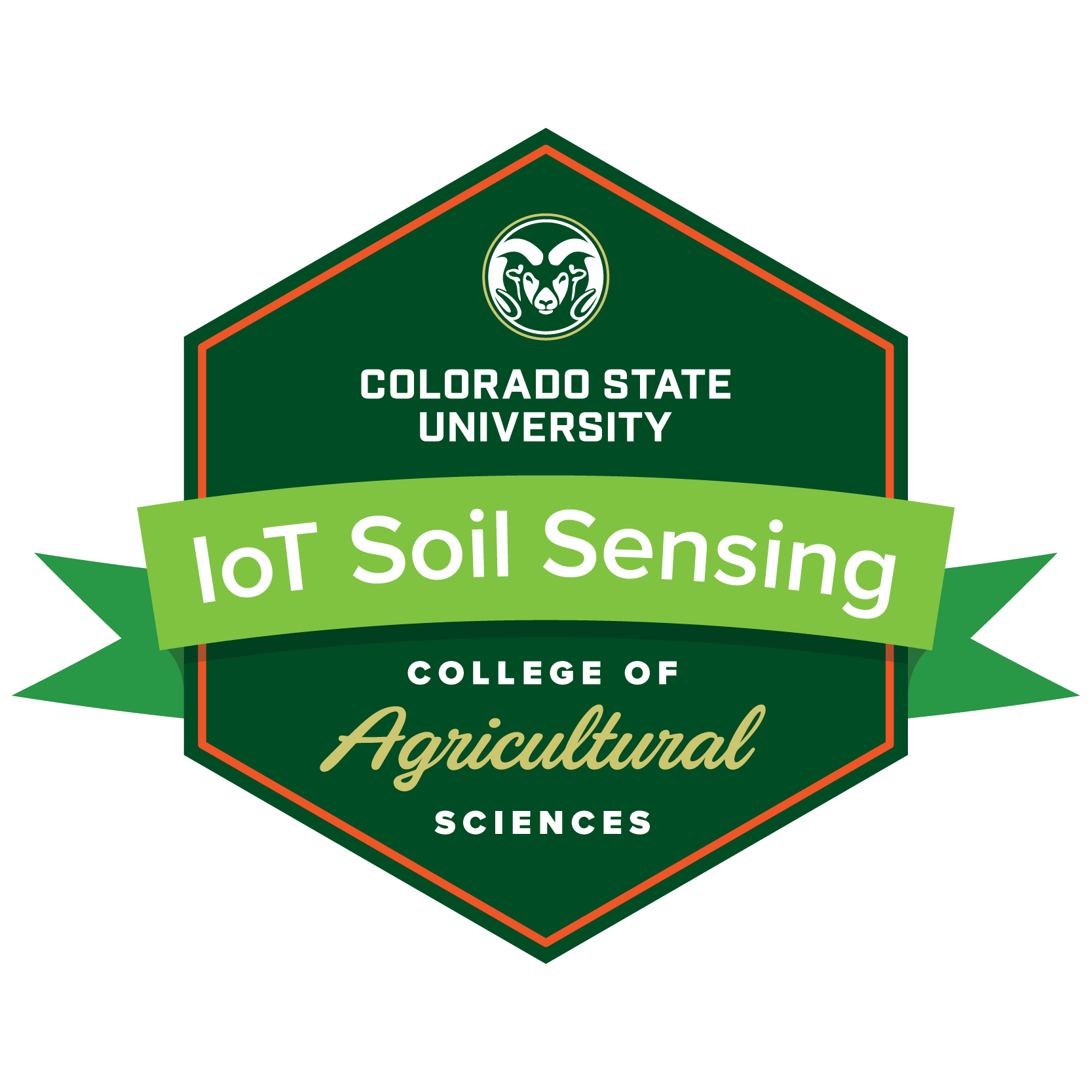
This CSU Badge introduces foundation principles on how internet-of-things (IoT) technology and sensors can be used to provide real-time soil moisture and weather data, allowing growers to improve the timing and amounts of irrigation – saving water and avoiding plant water stress. These general principles are applicable to either landscape or agriculture irrigation sectors, including a wide range of scenarios such as efficiently watering a backyard garden, growing vegetables in a greenhouse, maintaining golf courses and lawns, as well as irrigating large crop fields. Using a kit containing sensors and a wireless IoT microcontroller, participants will gaine hands-on experience building, programming, and using their own IoT (i.e, sensor-based) system to monitor soil water levels based on real-time data. Using an experiential learning approach, learners will gain new knowledge on how IoT sensor technology and the resulting real-time data can be leveraged to improve irrigation decisions and save water. Program was funded in part by the CHS Foundation and Colorado State University.


- Teacher: Tamla Blunt
- Teacher: James Folkestad
- Teacher: Jay Ham
- Teacher: Deana Namuth-Covert
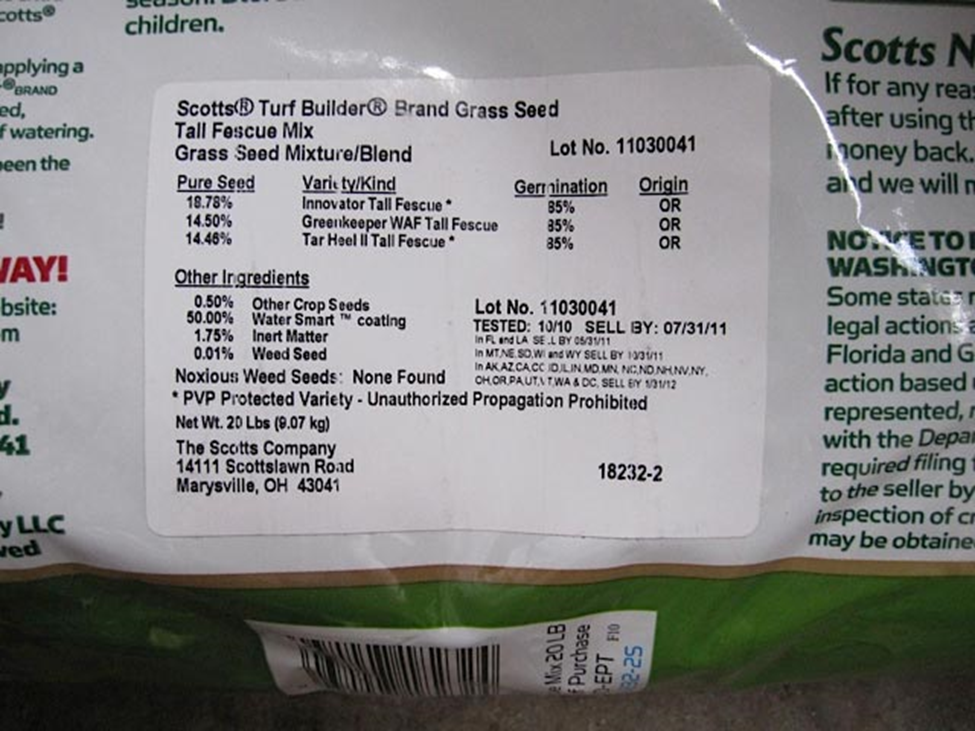
Summary: The Seed industry exists to provide high quality seed to farmers and growers. The value of seed is a measure of its ability to establish the desired field stand at low planting rates, grow into plants which are high-yielding, healthy, and the established type. The livelihood of farmers and the ultimate health of communities relies on the ability of seed to perform and grow into a crop that can be harvested and eaten. A system of laws and regulations has developed over time to protect societies and food systems from liability and risk. A seed conditioner must understand the system of laws and regulations in place, ensure that the conditioning plant and its operation are maintaining seed varietal identity through the entire process and avoid introduction of contaminants. This course is fifth in a series which will walk you through foundational concepts of seed conditioning.
Upskill Credentials: If you finish the entire course including passing the quiz with a score of 80% or better (which you can take up to 3 times) and filling out the short 5 mins feedback survey, then you will earn a badge certificate of completion. This course has been approved for 2 Crop Management CEUs through the national Certified Crop Adviser program.
Acknowledgements: This online micro-credential upskilling course is offered through the CSU Ag Upskilling program. This material is based upon work that is supported by the National Institute of Food and Agriculture, U.S. Department of Agriculture, under award number 2024-68018-42796, administered by Colorado State University. USDA is an equal opportunity employer and service provider. Any opinions, findings, conclusions, or recommendations expressed in this publication are those of the author(s) and do not necessarily reflect the view of the U.S. Department of Agriculture.

The enrollment fee for this course is $50.
You may also choose to purchase all 7 of the CSU Upskilling Seed Conditioning Courses for a discounted price of $300. To do so, click the link below.
- Teacher: Tamla Blunt
- Teacher: Deana Namuth-Covert
- Teacher: Rick Novak
- Teacher: Laura Pottorff
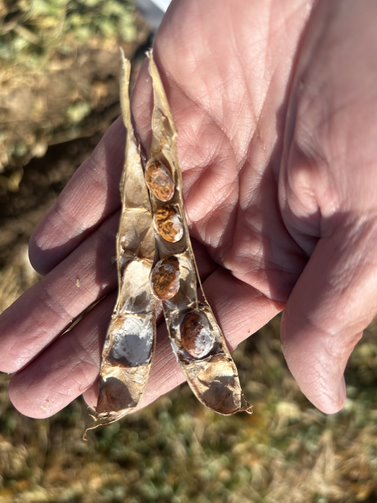
This course section is specifically for Pesticide Applicators working on CEUs with the Colorado Department of Agriculture's Licensing Program
Summary: Seed can serve as a pathway for introducing plant diseases and other pests to new environments and new countries. The risk to agriculture is very high should a new pathogen become introduced and established in an important crop. Seed of over 300 species of plants are moved globally, often several times before being sold commercially. Therefore, the removal or management of seed borne disease is imperative to protect global agriculture and trade. This course is seventh in a series which will walk you through foundational concepts of seed conditioning.
Upskill Credentials: If you finish the entire course including passing the quiz with a score of 80% or better (which you can take up to 3 times) and filling out the short 5 mins feedback survey, then you will earn a badge certificate of completion. This course has been approved for 2 Integrated Pest Management CEUs through the national Certified Crop Adviser program and 1 credit Continuing Education Credit with the Colorado Department of Agriculture for licensed Colorado qualified supervisors, certified operators, and private applicators.
Time Required: We estimate it will take you 1-2 hours in total to complete the course. You can work on it at your own pace and do not have to complete it in one setting.
ADA Accessibility: We have done our best to follow ADA best practices. Let us know if you run into any problems or require further accommodations.
If you have any questions, please contact your instructor, Laura Pottorff, M.S., Director of Seed Program at: Laura.Pottorff@colostate.edu
Acknowledgements: This online micro-credential upskilling course is offered through the CSU Ag Upskilling program. This material is based upon work that is supported by the National Institute of Food and Agriculture, U.S. Department of Agriculture, under award number 2024-68018-42796, administered by Colorado State University. USDA is an equal opportunity employer and service provider. Any opinions, findings, conclusions, or recommendations expressed in this publication are those of the author(s) and do not necessarily reflect the view of the U.S. Department of Agriculture.

The enrollment fee for this course is $50.
You may also choose to purchase all 7 of the CSU Upskilling Seed Conditioning Courses for a discounted price of $300, please contact Deana Namuth-Covert at Deana.namuth-covert@colostate.edu.
- Teacher: Tamla Blunt
- Teacher: Deana Namuth-Covert
- Teacher: Rick Novak

Summary: Seed can serve as a pathway for introducing plant diseases and other pests to new environments and new countries. The risk to agriculture is very high should a new pathogen become introduced and established in an important crop. Seed of over 300 species of plants are moved globally, often several times before being sold commercially. Therefore, the removal or management of seed borne disease is imperative to protect global agriculture and trade. This course is seventh in a series which will walk you through foundational concepts of seed conditioning.
Upskill Credentials: If you finish the entire course including passing the quiz with a score of 80% or better (which you can take up to 3 times) and filling out the short 5 mins feedback survey, then you will earn a badge certificate of completion. This course has been approved for 2 Integrated Pest Management CEUs through the national Certified Crop Adviser program.
Time Required: We estimate it will take you 1-2 hours in total to complete the course. You can work on it at your own pace and do not have to complete it in one setting. Click on the eBook link below to begin.
ADA Accessibility: We have done our best to follow ADA best practices. Let us know if you run into any problems or require further accommodations.
If you have any questions, please contact your instructor, Laura Pottorff, M.S., Director of Seed Program at: Laura.Pottorff@colostate.edu
Acknowledgements: This online micro-credential upskilling course is offered through the CSU Ag Upskilling program. This material is based upon work that is supported by the National Institute of Food and Agriculture, U.S. Department of Agriculture, under award number 2024-68018-42796, administered by Colorado State University. USDA is an equal opportunity employer and service provider. Any opinions, findings, conclusions, or recommendations expressed in this publication are those of the author(s) and do not necessarily reflect the view of the U.S. Department of Agriculture.

The enrollment fee for this course is $50.
You may also choose to purchase all 7 of the CSU Upskilling Seed Conditioning Courses for a discounted price of $300. To do so, click the link below.
- Teacher: Tamla Blunt
- Teacher: Deana Namuth-Covert
- Teacher: Rick Novak
- Teacher: Laura Pottorff
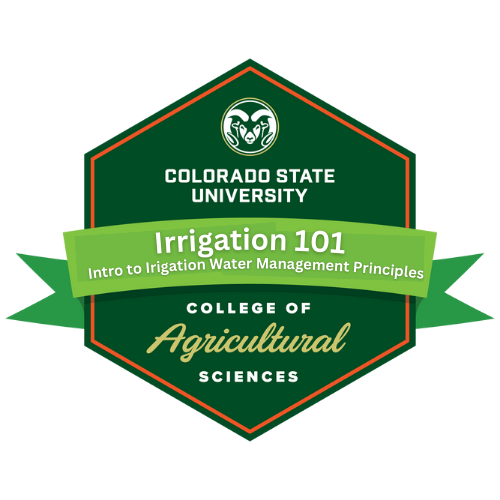
Summary: Irrigation is defined as the watering of land (or other plant growth media) by artificial means to foster plant growth. This can be very costly and the availability of supplemental water may be scarce, so it is important to be able to calculate accurately how much water to apply and when. This lesson will introduce you the underlying concepts you will need to consider.
After completing this lesson, you will be able to:
- Explain how the systems approach can be used to manage water in irrigated systems.
- Identify the fluxes (flows) of water and energy in an irrigated soil-plant-atmosphere system.
- Describe how the Irrigator’s Equation can be used to quantify the four (4) major variables involved in managing irrigation systems.
- Use the principle of conservation of mass to determine the water budget (also called water balance) of a soil-plant-atmosphere (SPA) system.
- Use the principle of conservation of energy to determine the energy budget (also called energy balance) of a SPA system.
Time Required: We estimate it will take you 2 hours in total to complete the lesson. You can work on it at your own pace and do not have to complete it in one setting.
Who Would Benefit: A variety of people will find this upskilling course useful from adults to high school students. This includes careers (or hobbyists) growing plants (ie field crops, greenhouse production, turf and lawns, gardens, etc.) and wishing to save money and water by better timing irrigation applications.
Upskill Credentials: If you finish the entire course including passing a final quiz (which you can take up to 3 times), then you will earn a badge certificate of completion. This has also been approved for 2 Soil and Water Management CEUs through the national Certified Crop Adviser program.
Instructor: Dr. Allan A. Andales is a Professor and Extension Specialist of Irrigation and Water Science in the Department of Soil and Crop Sciences, Colorado State University (CSU). He has a joint appointment in the Department of Civil and Environmental Engineering. Dr. Andales applies principles of soil and water engineering, environmental biophysics, and numerical methods to study the effects of management practices and environmental factors on field hydrology and agricultural production. Experimental data are used to develop computer models and decision support tools that can improve agricultural water use efficiency and water quality. He is a member of the CSU Extension Water Resource Management Team that engages the public in addressing agricultural and urban water issues in Colorado.
ADA Accessibility: We have done our best to follow ADA best practices. Let us know if you run into any problems or require further accommodations.
Acknowledgements: This online micro-credential upskilling course is offered through the CSU Ag Upskilling program. Development was supported in part by funding from the CHS Foundation, administered by Colorado State University (2022). The CHS Foundation, funded by charitable gifts from CHS Inc., is focused on developing a new generation of agriculture leaders for life-long success. Together, with our partners, we are igniting innovation and driving excellence in agriculture education, cultivating high impact programs for rural youth and accelerating potential for careers in agriculture. Learn more at CHS Foundation.


- Teacher: Allan Andales
- Teacher: Tamla Blunt
- Teacher: Deana Namuth-Covert
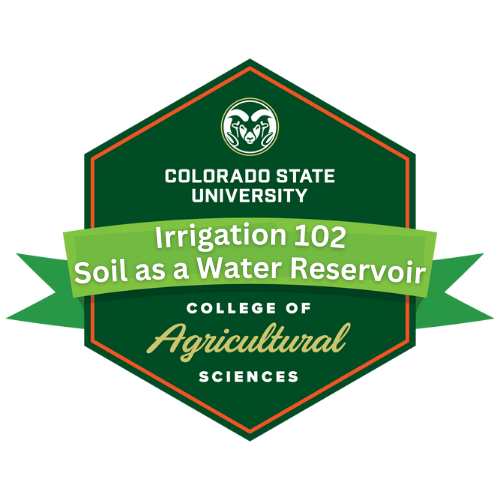
Summary: The goal of irrigation is to add water to the soil where the plant roots are actively growing (the root zone). The soil serves as a water reservoir, from which plants can withdraw water needed for growth. In irrigation management, it is necessary to know the characteristics of the soil in the area that you will be irrigating. These soil characteristics can be used to determine the amount of water in the root zone that is available to the plants.
After completing this lesson, you will be able to:
- Describe the concept of depth of water.
- Determine the depth of water that is available to the plants.
- Use the concept of depth of water to estimate the net irrigation requirement (i.e., soil water deficit) of the soil root zone.
Time Required: We estimate it will take you 2 hours in total to complete the lesson. You can work on it at your own pace and do not have to complete it in one setting.
Who Would Benefit: A variety of people will find this upskilling course useful from adults to high school students. This includes careers (or hobbyists) growing plants (ie field crops, greenhouse production, turf and lawns, gardens, etc.) and wishing to save money and water by better timing irrigation applications.
Upskill Credentials: If you finish the entire course including passing a final quiz (which you can take up to 3 times), then you will earn a badge certificate of completion. It has been approved for 2 Soil and Water Management CEUs through the national Certified Crop Adviser program.
Instructor: Dr. Allan A. Andales is a Professor and Extension Specialist of Irrigation and Water Science in the Department of Soil and Crop Sciences, Colorado State University (CSU). He has a joint appointment in the Department of Civil and Environmental Engineering. Dr. Andales applies principles of soil and water engineering, environmental biophysics, and numerical methods to study the effects of management practices and environmental factors on field hydrology and agricultural production. Experimental data are used to develop computer models and decision support tools that can improve agricultural water use efficiency and water quality. He is a member of the CSU Extension Water Resource Management Team that engages the public in addressing agricultural and urban water issues in Colorado.
ADA Accessibility: We have done our best to follow ADA best practices. Let us know if you run into any problems or require further accommodations.
Acknowledgements: This online micro-credential upskilling course is offered through the CSU Ag Upskilling program. Development was supported in part by funding from the CHS Foundation, administered by Colorado State University (2022). The CHS Foundation, funded by charitable gifts from CHS Inc., is focused on developing a new generation of agriculture leaders for life-long success. Together, with our partners, we are igniting innovation and driving excellence in agriculture education, cultivating high impact programs for rural youth and accelerating potential for careers in agriculture. Learn more at CHS Foundation.
- Teacher: Allan Andales
- Teacher: Deana Namuth-Covert
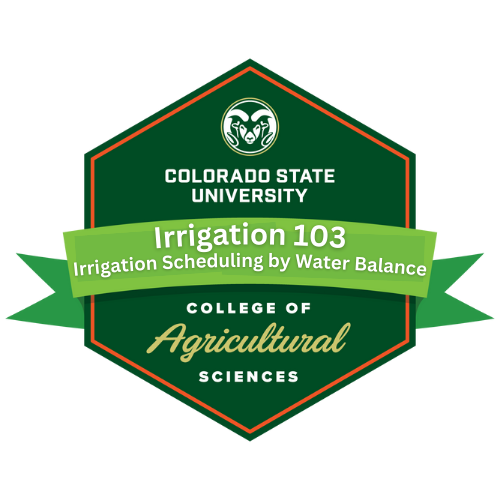
Summary: To effectively utilize limited irrigation resources in the most cost-effective manner requires balancing the inputs and outputs of water fluxes, as well as water that is stored in the soil profile. Best irrigation management scheduling practices focus on water balance in the rootzone because that is where the plant/crop is extracting water (and nutrients) from the soil. It is here we estimate the irrigation water requirements to maintain healthy plants. Decisions on when and how much irrigation water to apply depends on the soil water deficit and the management-allowed depletion (MAD). This lesson will walk you through each of these concepts including real world problem scenarios.
After completing this lesson, you will be able to:
- Use the water balance of the root zone to estimate the irrigation water requirement.
- Make irrigation decisions by comparing the soil water deficit to the management-allowed depletion.
Time Required: We estimate it will take you 2 hours in total to complete the lesson. You can work on it at your own pace and do not have to complete it in one setting.
Who Would Benefit: A variety of people will find this upskilling course useful from adults to high school students. This includes careers (or hobbyists) growing plants (ie field crops, greenhouse production, turf and lawns, gardens, etc.) and wishing to save money and water by better timing irrigation applications.
Upskill Credentials: If you finish the entire course including passing a final quiz (which you can take up to 3 times), then you will earn a badge certificate of completion. This has also been approved for 2 Soil and Water Management CEUs through the national Certified Crop Adviser program.
Instructor: Dr. Allan A. Andales is a Professor and Extension Specialist of Irrigation and Water Science in the Department of Soil and Crop Sciences, Colorado State University (CSU). He has a joint appointment in the Department of Civil and Environmental Engineering. Dr. Andales applies principles of soil and water engineering, environmental biophysics, and numerical methods to study the effects of management practices and environmental factors on field hydrology and agricultural production. Experimental data are used to develop computer models and decision support tools that can improve agricultural water use efficiency and water quality. He is a member of the CSU Extension Water Resource Management Team that engages the public in addressing agricultural and urban water issues in Colorado.
ADA Accessibility: We have done our best to follow ADA best practices. Let us know if you run into any problems or require further accommodations.
Acknowledgements: This online micro-credential upskilling course is offered through the CSU Ag Upskilling program. Development was supported in part by funding from the CHS Foundation, administered by Colorado State University (2022). The CHS Foundation, funded by charitable gifts from CHS Inc., is focused on developing a new generation of agriculture leaders for life-long success. Together, with our partners, we are igniting innovation and driving excellence in agriculture education, cultivating high impact programs for rural youth and accelerating potential for careers in agriculture. Learn more at CHS Foundation.
- Teacher: Allan Andales
- Teacher: Deana Namuth-Covert
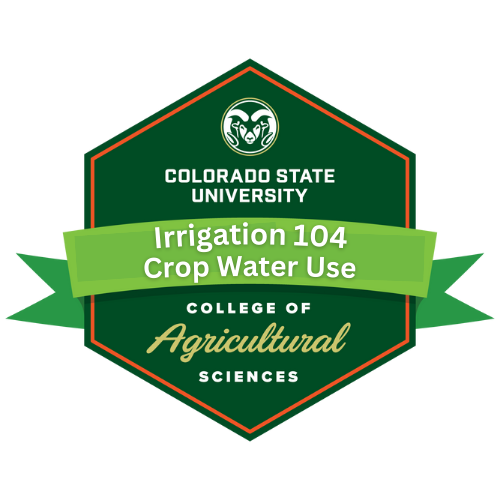
Summary: When making decisions about when to irrigate a crop, no matter the specific plant or scenario, it is important to take into consideration evapotranspiration rates which provide an estimate of water flux out of your system. The challenge is that evapotranspiration varies a lot depending on the specific plant, its growth stage plus changing weather (or greenhouse) conditions. Precision agriculture scientists have been able to characterize two reference crop values as a way to standardize evapotranspiration calculations based on weather data. In this lesson you will learn what is meant by a reference crop, crop coefficient, and water stress coefficient and how you can use these to inform your irrigation management decisions.
Time Required: We estimate it will take you 2 hours to complete the lesson. You can work on it at your own pace and do not have to complete it in one setting.
Who Would Benefit: A variety of people will find this upskilling course useful from adults to high school students. This includes careers (or hobbyists) growing plants (ie field crops, greenhouse production, turf and lawns, gardens, etc.) and wishing to save money and water by better timing irrigation applications.
Upskill Credentials: If you finish the entire course including passing a final quiz (which you can take up to 3 times), then you will earn a badge certificate of completion. It has been approved for 2 Soil and Water Management CEUs through the national Certified Crop Adviser program.
Instructor: Dr. Allan A. Andales is a Professor and Extension Specialist of Irrigation and Water Science in the Department of Soil and Crop Sciences, Colorado State University (CSU). He has a joint appointment in the Department of Civil and Environmental Engineering. Dr. Andales applies principles of soil and water engineering, environmental biophysics, and numerical methods to study the effects of management practices and environmental factors on field hydrology and agricultural production. Experimental data are used to develop computer models and decision support tools that can improve agricultural water use efficiency and water quality. He is a member of the CSU Extension Water Resource Management Team that engages the public in addressing agricultural and urban water issues in Colorado.
ADA Accessibility: We have done our best to follow ADA best practices. Let us know if you run into any problems or require further accommodations.
Acknowledgements: This online micro-credential upskilling course is offered through the CSU Ag Upskilling program. Development was supported in part by funding from the CHS Foundation, administered by Colorado State University (2022). The CHS Foundation, funded by charitable gifts from CHS Inc., is focused on developing a new generation of agriculture leaders for life-long success. Together, with our partners, we are igniting innovation and driving excellence in agriculture education, cultivating high impact programs for rural youth and accelerating potential for careers in agriculture. Learn more at CHS Foundation.


- Teacher: Allan Andales
- Teacher: Deana Namuth-Covert
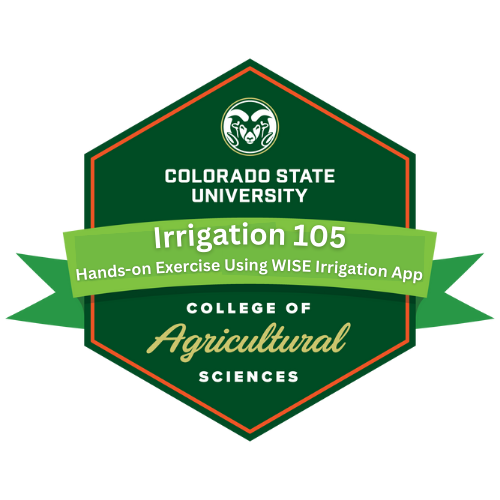
Summary: No matter the particular plant scenario you are working with (ie field crop, pastureland, Greenhouse business, turf grass, home garden and landscaping, etc.) being able to accurately estimate the water needs and timing of irrigation will help lower costs, as well as preserve limited water supplies. In this lesson you will learn how to use a specific irrigation app which has been developed by a group of public researchers and is free for your use. This app, along with the foundational irrigation principles you learned in previous lessons and/or from your previous knowledge will help you maximize the effects of your irrigation applications while minimizing costs. This lesson uses a Colorado field example.
After completing this lesson, you will be able to:
- Set up a field in the Water Irrigation Scheduler for Efficient Application (WISE) App to schedule irrigations during one growing season.
- Input irrigation amounts in WISE based on estimated soil water deficits (D) and the crop’s management allowed depletion (MAD) during one growing season.
- Interpret the WISE water balance outputs.
Time Required: We estimate it will take you 2 hours to complete the lesson. You can work on it at your own pace and do not have to complete it in one setting.
Who Would Benefit: A variety of people will find this upskilling course useful from adults to high school students. This includes careers (or hobbyists) growing plants (ie field crops, greenhouse production, turf and lawns, gardens, etc.) and wishing to save money and water by better timing irrigation applications.
Upskill Credentials: If you finish the entire course including passing a final quiz (which you can take up to 3 times), then you will earn a badge certificate of completion. It has been approved for 2 Crop Management CEUs through the national Certified Crop Adviser program.
Instructor: Dr. Allan A. Andales is a Professor and Extension Specialist of Irrigation and Water Science in the Department of Soil and Crop Sciences, Colorado State University (CSU). He has a joint appointment in the Department of Civil and Environmental Engineering. Dr. Andales applies principles of soil and water engineering, environmental biophysics, and numerical methods to study the effects of management practices and environmental factors on field hydrology and agricultural production. Experimental data are used to develop computer models and decision support tools that can improve agricultural water use efficiency and water quality. He is a member of the CSU Extension Water Resource Management Team that engages the public in addressing agricultural and urban water issues in Colorado.
ADA Accessibility: We have done our best to follow ADA best practices. Let us know if you run into any problems or require further accommodations.
Acknowledgements: This online micro-credential upskilling course is offered through the CSU Ag Upskilling program. Development was supported in part by funding from the CHS Foundation, administered by Colorado State University (2022). The CHS Foundation, funded by charitable gifts from CHS Inc., is focused on developing a new generation of agriculture leaders for life-long success. Together, with our partners, we are igniting innovation and driving excellence in agriculture education, cultivating high impact programs for rural youth and accelerating potential for careers in agriculture. Learn more at CHS Foundation.


- Teacher: Allan Andales
- Teacher: Deana Namuth-Covert
Curso de Cuidado y Manejo del Caballo para Vaqueros y Procesadores - Versión en Español es ofrecido por la Corporación HorseQuest para el público en general, productores de ganado de engorda y empleados que aprenderán cómo manejar con seguridad los caballos (horses) cuando se trabaja en los corrales de alimentación (feedlot), así como también el cuidado y manejo básica del caballo.
Para obtener más información o para inscribirse contacte a Kathy Anderson, en la Universidad de Nebraska-Lincoln, a la dirección de correo electrónico: kanderson1@unl.edu
Para asistencia técnica por favor contacte campushelp@extension.org
Este curso requiere una cuota de inscripción de $25. Una vez pagada la cuota de inscripción, recibirá un correo electrónico con la clave de acceso.
Por favor, vaya a: Pen Rider and Processors Horse Safety and Care Certification Course (http://marketplace.unl.edu/extension/programs/feedlot-horse.html) para registrarse.
- Teacher: Kathy Anderson
- Teacher: Colleen Brady
In this section on training, efforts will be made to explain and simplify the process of developing a relationship with the horse where communication is simple and straightforward for both the horse and rider.
For information contact Colleen Brady, bradyc@purdue.edu.
The fee for this course is $10. To purchase and enroll in the course, click the following button.
If you purchase at least $40 worth of courses from this category, you can receive a 20% discount by entering the voucher code of HorseQuest20.
- Teacher: Kathy Anderson
- Teacher: Colleen Brady
- Teacher: Kris Hiney
eLearn Urban Forestry is a self-led, online, distance learning program geared speciifcally toward beginning urban foresters and those allied professionals working in and around urban and urbanizing landscapes, including service foresters, natural resource planners, landscape architects, city officials and public works employees. The program is comprised of ten learning modules: The Benefits and Costs of the Urban Forest; Tree Growth and Development; Urban Soils; Site, Tree Selection and Planting; Arboriculture; Assessing and Managing Tree Risk; Tree Disorder Diagnosis and Management; Trees and Construction; Public Policy and Urban Forestry; and Urban Forest Management.
For more information or to enroll, contact Leslie Boby, Southern Regional Extension Forestry, University of Georgia at lboby@sref.info.
- Teacher: Leslie Boby
For more information contact Kathy Anderson, University of Nebraska–Lincoln, at kanderson1@unl.edu
The fee for this course is $10. To purchase and enroll in the course, click the following button.
If you purchase at least $40 worth of courses from this category, you can receive a 20% discount by entering the voucher code of HorseQuest20.
- Teacher: Kathy Anderson
- Teacher: Colleen Brady
- Teacher: Kris Hiney
- Teacher: Laura Kenny
Equine Herpes Virus provides the participants the opportunity to learn the different ways the EHV-1 virus is expressed in horses, and know how to prevent and treat the disease. This course offers a badge and is one of several available in the HorseQuest Badge Portfolio. This course includes a video, a learning lesson, and a quiz.
The fee for this course is $10. To purchase and enroll in the course, click the following button:
If you purchase at least $40 worth of courses from this category, you can receive a 20% discount by entering the voucher code of HorseQuest20.
- Teacher: Kathy Anderson
- Teacher: Colleen Brady
Why is good pasture important to horses? Well, because horses should consume at least 1-2% of their body weight each day in forage (hay or pasture). A 1000 lb horse will need from 2 - 3 acres to provide enough pasture to meet its total nutrient requirements.
The fee for this course is $10. To purchase and enroll in the course, click the following button:
If you purchase at least $40 worth of courses from this category, you can receive a 20% discount by entering the voucher code of HorseQuest20.
- Teacher: Kathy Anderson
- Teacher: Colleen Brady
- Teacher: Kris Hiney
- Teacher: Laura Kenny
- Teacher: Krishona Martinson
- Teacher: Carey Williams
What is your horse's body condition? Did you know there was a scoring system to rank your horse's physical condition? Check out our latest learning lesson about how to body condition score your horse. Learn a time-tested and accepted method to evaluate your horse's fat cover and the balance between the food he eats and the amount of energy he burns.
For information contact Colleen Brady, bradyc@purdue.edu
The fee for this course is $10. To purchase and enroll in the course, click the following link.
If you purchase at least $40 worth of courses from this category, you can receive a 20% discount by entering the voucher code of HorseQuest20.
- Teacher: Kathy Anderson
- Teacher: Colleen Brady
A course for Extension staff at North Dakota State University, this provides a self-paced guide to evaluating extension programs, materials, and communications.
For more information or to enroll contact robert.bertsch@ndsu.edu
- Teacher: Sonja Fuchs
For more information about this course or to enroll contact Curt Emanuel at cemanuel@purdue.edu
- Teacher: AMANDA MOSIMAN
Ohio State University Extension Occasional Quantity Cooks training helps extension volunteers prepare as they plan for, prepare and deliver food for a one-time event in their county. Participants take the pre-test before they begin the program and then take the post-test at the end. A certificate of completion is generated to give to their County Educator/supervisor as verification that they have completed the training.
- Teacher: Nicole Arnold
- Teacher: Jonathan Gladden
- Teacher: Kate Shumaker
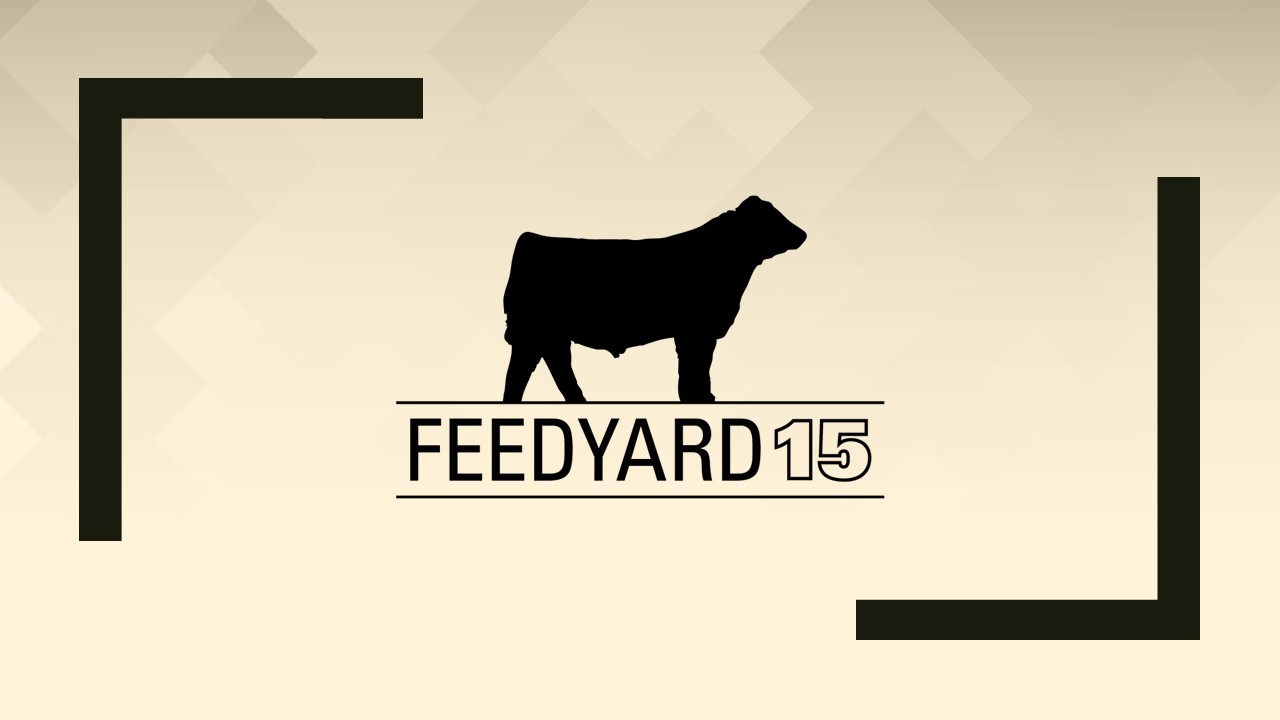
The Cattle Feedyard Safety Program, through the Central States Center for Agricultural Safety and Health, Gallagher Insurance, Nebraska Extension and the Nebraska Cattlemen, has compiled safety modules that can be used by cattle producers to conduct safety trainings with their employees. The modules are based on the topics identified through surveys, insurance companies, and other safety and health experts. The top 15 employee safety topics identified have been labeled the Feedyard 15.
This training is intended for anyone new to agriculture, about to begin employment in agriculture outside of their family business or wishing to improve their current skills and knowledge. People of all ages find this set of lessons relevant.
Price for this course is $10.- Teacher: Deana Namuth-Covert
- Teacher: Aaron Yoder
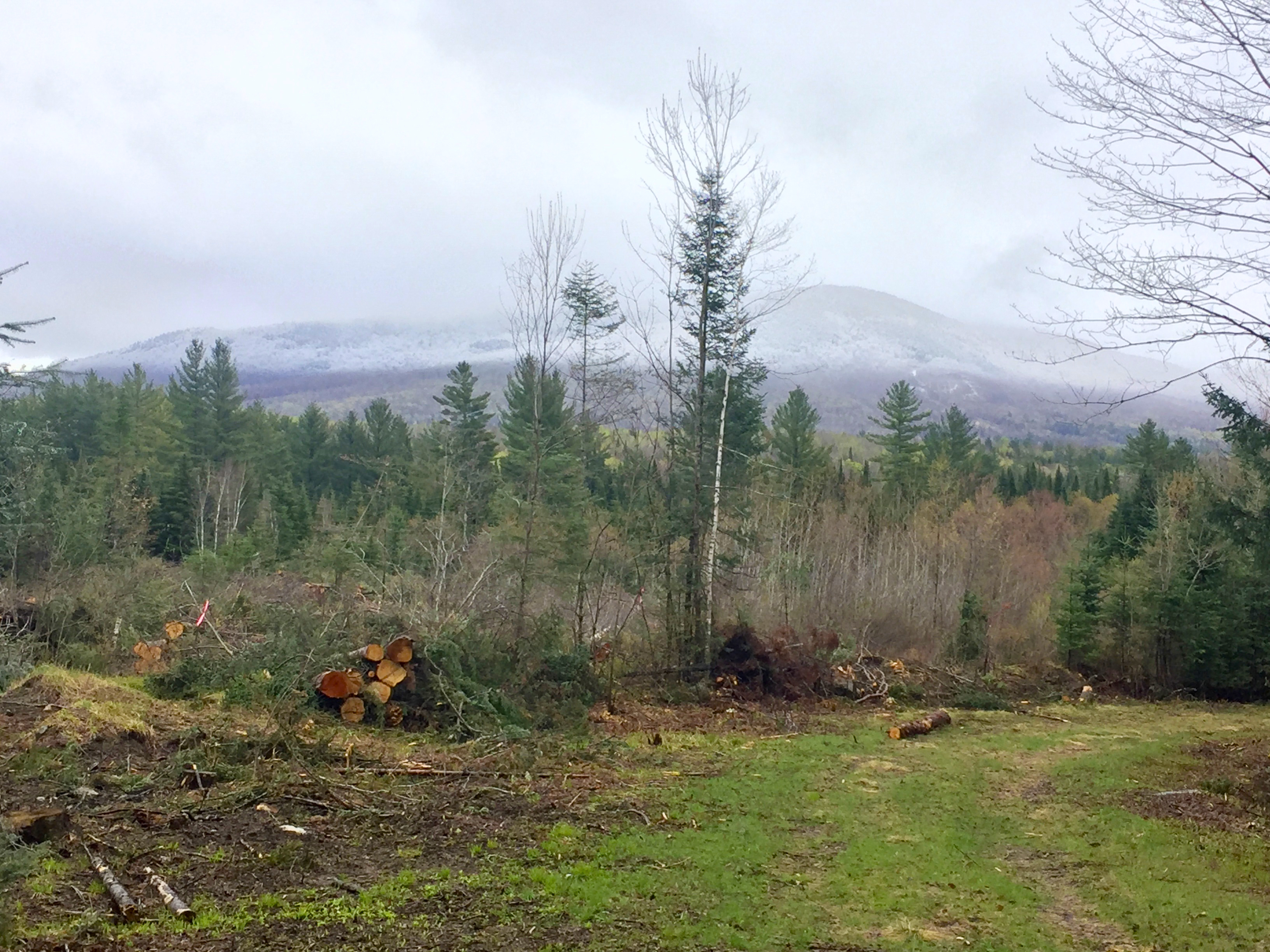
Speaker: Ivan Fernandez-Distinguished Maine Professor, University of Maine, School of Forest Resources and Climate Change Institute
A discussion of how we are developing adaptation strategies for managing ecosystem response to climate change, particularly as it relates to forested ecosytems and the freshwater resources they encompass.
0.5 Category 1 CEU; $10.00
- Teacher: Raymond Berthiaume
- Teacher: andrew fast
Speaker: Charlie Levesque-Innovative Natural Resource Solutions, LLC
A discussion of the basics of forest carbon and what it might mean in future years for the forest industry. Specifically: how do forests capture and store carbon, how does the forest carbon market work, how might forest carbon programs impact timber harvesting, how do landowners access these programs, what does all this mean for managing our forests.
1.5 Category 1 CEUs; $30.00
- Teacher: Raymond Berthiaume
- Teacher: andrew fast

Speaker: Alison Kanoti-Maine Forest Service
An update on what forest pests and diseases are still a threat to the health and vigor of our forests, and ideas on how to manage for them.
0.5 Category 1 CEU from State of Maine
1.0 Category 1 CEU from SAF
$10.00
- Teacher: Raymond Berthiaume
- Teacher: andrew fast

Speaker: Stephen Nicholas-Maine Forest Service
A walk-through of the new system, including how to access and what the requirements are.
0.5 Category 1 CEU; $10.00
- Teacher: Raymond Berthiaume
- Teacher: andrew fast

Speaker: Amanda Lind-Technical Content Writer, Blue Marble Geographics
An explanation and demonstration how to use available software as a tool for foresters.
0.5 Category 1 CEU; $10.00
- Teacher: Raymond Berthiaume
- Teacher: andrew fast

Speaker: Jeremy Miller-Regional Technical Manager, American Forest Management
A case study of actual use of the software in forestry on-the-ground applications.
0.5 Category 1 CEU; $10.00
- Teacher: Raymond Berthiaume
- Teacher: andrew fast

Speaker: Claire Kiedrowski-Executive Director, Maine Library of Geographic Information
A discussion about what LiDAR data is available to foresters, wher, and how to find and access it.
0.5 Category 1 CEU; $10.00
- Teacher: Raymond Berthiaume
- Teacher: andrew fast

Speaker: Joel Slate-Corporate Director of Fiber Supply ND Paper
Discussion of markets for low-grade forest products and resources to support them.
0.5 Category 1 CEU; $10.00
- Teacher: Raymond Berthiaume
- Teacher: andrew fast

Speaker: Mark Anderson-The Nature Conservancy
A discussion about the project and how it is being implemented in Maine with multiple partners and supporters.
1.0 Category 1 CEU; $20.00
- Teacher: Raymond Berthiaume
- Teacher: andrew fast
Listen to some of the items being presented and discussed on the floor of the state legislature.
0.5 Category 1 ceu; $10
- Teacher: Raymond Berthiaume
Discuss how the changing climate, and associated weather events,
have changed the design and management of stream crossings.
0.5 Category 1 ceu; $10
- Teacher: Raymond Berthiaume

This course also meets the requirements for production and financial management training for FSA loan recipients who have attended the in-person workshops. In order to qualify for a certificate, all sessions must be completed.
Contact Keri Hayes, MSU at 406-994-3511 or email: khayes@montana.edu if you are having technical difficulties or have questions.
By taking this course, students will learn: good ag practices that help prevent foodborne illness from fresh produce. If you are an urban gardener and produce food for family and friends, this is the course for you.
This course contains audio and video so you will need a computer that can play both.
For more information or to enroll please contact: Cindy Brison
- Teacher: Deborah Weitzenkamp
- Instructor: Cindy Brison, MS, RDN
Equine Genetics: An Important Diagnostic Tool is a self directed course designed for horse owners and enthusiasts. Participants will gain basic information on equine genetics and genetic diseases commonly found in horses from taking this course. For more information contact Nichol Schultz, University of Minnesota, at mccar556@umn.edu.
- Teacher: Kathy Anderson
- Teacher: Colleen Brady
- Teacher: Krishona Martinson
This lesson will discuss how genetics can affect several different functions in horses, from coat color to diseases. It will also define how a Punnet square works, show how to recognize different coat colors based on genotype, and identify common genetic diseases.
For more information contact Kathy Anderson, University of Nebraska–Lincoln, at kanderson1@unl.edu
The fee for this course is $10. To purchase and enroll in the course, click the following button.
If you purchase at least $40 worth of courses from this category, you can receive a 20% discount by entering the voucher code of HorseQuest20.
- Teacher: Kathy Anderson
- Teacher: Colleen Brady
- Teacher: Betsy Greene
Growing Apples with IPM is an online course for Master Gardeners looking for further certification or home gardeners. Students will learn what to consider when planting an apple tree, and IPM-based strategies for controlling common pests and diseases. Once you have completed this course and received a certificate, you will receive Master Gardener credit.
For information or to enroll contact:
Mary Meyer, meyer023@umn.edu or
Echo Martin, mart1794@umn.edu with University of Minnesota
- Teacher: Mary Meyer
In the 'Growing Raspberries and Blackberries with IPM' course, Master Gardeners will learn the best maintenance techniques for growing brambles, including insect and disease management. This course places special emphasis on a new insect pest, the spotted wing drosophila.
Once you register for the class, you will have unlimited time to complete the work at your own pace. Once you have completed this course and received a certificate, you will receive Master Gardener credit worth 3 CEUs.
For more information, contact Mary Meyer University of Minnesota, at meyer023@umn.edu
- Teacher: Mary Meyer
In the 'Growing Squash, Cucumbers and Pumpkins with IPM' course, Master Gardeners will learn about growing cucurbits, including plant selection and insect and disease management.
Once you register for the class, you will have unlimited time to complete the work at your own pace. Once you have completed this course and received a certificate, you will receive Master Gardener credit worth 3 CEUs.
For more information, contact: Mary Meyer, University of Minnesota, meyer023@umn.edu
- Teacher: Mary Meyer
Growing Strawberries with IPM is an online course for Master Gardeners looking for further certification or home gardeners. Students will learn the basics on what to consider when planting strawberries, as well as IPM-based strategies for controlling common pests and diseases.Once you have completed this course and received a certificate, you will receive Master Gardener credit.
For information or to enroll contact:
Mary Meyer, meyer023@umn.edu or
Echo Martin, mart1794@umn.edu with University of Minnesota
- Teacher: Vera Krischik
- Teacher: Mary Meyer
Growing Tomatoes with IPM is designed for Master Gardeners who will learn how to prevent pests on tomatoes from the beginning to the end of the growing season through lessons on variety selection, best planting practices, and cultural information and will be instructed on how to recognize leaf spots, early and late blight and bacterial spot.
Once you register for the class, you will have unlimited time to complete the work at your own pace. Once you have completed this course and received a certificate, you will receive Master Gardener credit worth 3 CEUs.
For more information, contact: Mary Meyer, University of Minnesota, meyer023@umn.edu
- Teacher: Mary Meyer
 Welcome to the Extension Horses all new Hippology/Horse Science: Learning all about
horses! This course contains four interactive lessons with quizzes, videos
and more.
Welcome to the Extension Horses all new Hippology/Horse Science: Learning all about
horses! This course contains four interactive lessons with quizzes, videos
and more.
Topics include:
- Internal Parasites
- Introduction to Horse Hoof Anatomy
- Parturition in broodmares
- Evaluating Equine conformation
You have unlimited access and attempts to all the content for 6 months from the date of purchase.
Cost: $40 for all 4 lessons
- Teacher: Kathy Anderson
- Teacher: Kim Baker
- Teacher: Colleen Brady
- Teacher: Kris Hiney
- Teacher: Alyssa Ohmstede
- Teacher: Allison Perkins
- Part 1 will cover:
- Unit 1- Horses Then and Now
- Unit 2- Horse Breeds and Uses
- Unit 3- Horse Identification
- Unit 4- Horse Conformation and Selection
- There are 4 units with 2 lessons each.
- At the end of each lesson you will test your knowledge by completing a quiz.
- After completing all four units you can take a the final quiz to earn a certificate in Horse- 101 Part 1.
- Teacher: Kathy Anderson
- Teacher: Colleen Brady
- Teacher: Dani Forster
- Part 2 will cover:
- Unit 5 -Horse Senses, Behaviors and Body Language
- Unit 6 - Horse Nutrition - Part 1
- Unit 7 - Horse Nutrition - Part 2
- Unit 8 - Equine Exercise Physiology
- There are 4 units with 2 lessons each.
- At the end of each lesson you will test your knowledge by completing a quiz.
- After completing all four units you can take a the final quiz to earn a certificate in Horse- 101 Part 2.
- Teacher: Kathy Anderson
- Teacher: Colleen Brady
- Teacher: Dani Forster
- Unit 9 -Horse Health Part 1
- Unit 10 - Horse Health Part 2
- Unit 11 - Horse Reproduction and Breeding
- Unit 12 - Genetics
- Unit 13 - Environmental Management
- There are 5 units with 1- 2 lessons each.
- At the end of each lesson you will test your knowledge by completing a quiz.
- After completing all four units you can take a the final quiz to earn a certificate in Horse- 101 Part 3.
Horse 101-Part 3 is $50. To purchase and enroll, click the link below. Or purchase Horse 101-Part 1, Horse 101-Part 2, and Horse 101-Part 3 for $120 by clicking below.
- Teacher: Kathy Anderson
- Teacher: Colleen Brady
- Teacher: Dani Forster
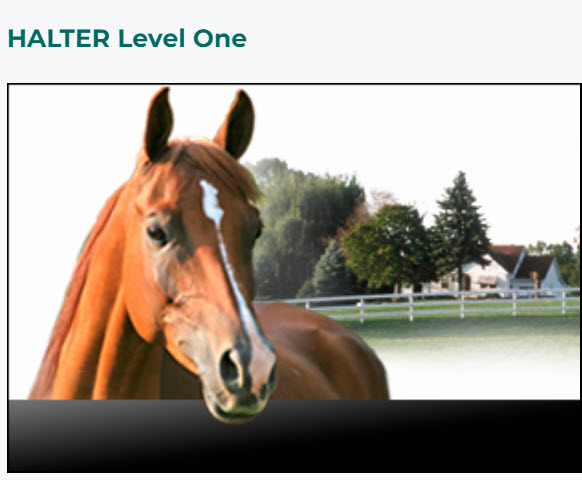
Welcome to the Horse Adult Leader Training and Educational Resource (HALTER)- Part 1.
This course is part of a four course series for Adult Volunteers working with youth in the horse industry. These courses can be taken in any order, based on your background knowledge and areas of interest. In Part 1, we will cover:
- Safety and Handling working with horses
- Safe Tack and Attire
- Basics of Horse Behavior
- Staying Safe working with Youth
The fee for a 12 month subscription for this course is $25, or $75 if you purchase all 4 HALTER courses. To purchase and enroll in the course, click the following button.
If you purchase all 4 HALTER courses, enter the voucher code of 4Halter.
For more information contact:
Kathy Anderson, University of Nebraska-Lincoln, at kanderson1@unl.edu
Colleen Brady, Purdue University, at bradyc@purdue.edu
Kris Hiney, Oklahoma State University, at khiney@okstate.edu
- Teacher: Kathy Anderson
- Teacher: Colleen Brady
- Teacher: Chelsie Huseman
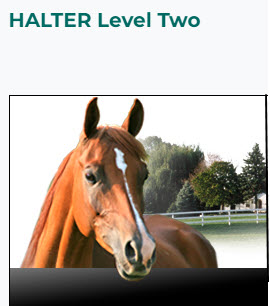
Welcome to HALTER Level Two! This self-directed course designed for adults working with youth. This course builds upon the first level of the HALTER program. Participants will gain equine science information, student activities, and methods to promote
positive youth development from taking this course.
The fee for a 12 month subscription for this course is $25, or $75 if you purchase all 4 HALTER courses. To purchase and enroll in the course, click the following button.
If you purchase all 4 HALTER courses, enter the voucher code of 4Halter.
For more information contact:
Kathy Anderson, University of Nebraska-Lincoln, at kanderson1@unl.edu
Colleen Brady, Purdue University, at bradyc@purdue.edu
Kris Hiney, Oklahoma State University, at khiney@okstate.edu
- Teacher: Kathy Anderson
- Teacher: Colleen Brady
- Teacher: Chelsie Huseman
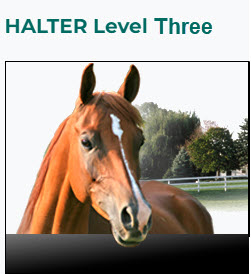
The Horse Adult Leader Training and Educational Resource Program Level Three module is a self-directed course designed for adults working with youth and horses who have completed levels one and two of the program. Participants will gain equine science information, student activities, and techniques to promote positive youth development from taking this course.
The fee for a 12 month subscription for this course is $25, or $75 if you purchase all 4 HALTER courses. To purchase and enroll in the course, click the following button.
If you purchase all 4 HALTER courses, enter the voucher code of 4Halter.
For more information contact:
Kathy Anderson, University of Nebraska-Lincoln, at kanderson1@unl.edu
Colleen Brady, Purdue University, at bradyc@purdue.edu
Kris Hiney, Oklahoma State University, at khiney@okstate.edu
- Teacher: Kathy Anderson
- Teacher: Colleen Brady
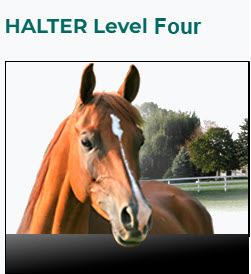
The Horse Adult Leader Training and Educational Resource Program Level Four module is a self-directed course designed for adults working with youth and horses who have completed the first three levels of the HALTER program. Participants will gain equine science information, student activities, and techniques to promote positive youth development from taking this course.
The fee for this course is $10. To purchase and enroll in the course, click the following button.
The fee for a 12 month subscription for this course is $25, or $75 if you purchase all 4 HALTER courses. To purchase and enroll in the course, click the following button.
If you purchase all 4 HALTER courses, enter the voucher code of 4Halter.
For more information contact:
Kathy Anderson, University of Nebraska-Lincoln, at kanderson1@unl.edu
Colleen Brady, Purdue University, at bradyc@purdue.edu
Kris Hiney, Oklahoma State University, at khiney@okstate.edu
- Teacher: Kathy Anderson
- Teacher: Colleen Brady
- Teacher: Chelsie Huseman
This lesson compares and contrasts the different recreational and work-related uses of equine in the United States and globally. In addition, this lesson also explains how equine breeds are categorized and also discusses the history, unique physical properties, and uses of popular equine breeds.
For more information contact Kathy Anderson, University of Nebraska–Lincoln, at kanderson1@unl.edu
The fee for this course is $10. To purchase and enroll in the course, click the following link:
- Teacher: Kathy Anderson
- Teacher: Colleen Brady
- Teacher: Betsy Greene
This course is designed to teach the basic colors and markings of horses. Colors and markings are an important way to identify horses, so it is important that all horse owners understand the terms used to describe horses.
For information contact Colleen Brady, bradyc@purdue.edu.
- Teacher: Kathy Anderson
- Teacher: Colleen Brady
Good quality hay can provide ample nutrients to meet the needs of most horses. There is no right or wrong hay to feed your horse. As a horse owner, you must evaluate your individual horse's needs and determine the type of hay and feeding strategies that fit your feeding program. This module is designed to give you the knowledge to make these decisions.
The fee for this course is $10. To purchase and enroll in the course, click the following button.
If you purchase at least $40 worth of courses from this category, you can receive a 20% discount by entering the voucher code of HorseQuest20.
- Teacher: Kathy Anderson
- Teacher: Colleen Brady
- Teacher: Krishona Martinson
- Teacher: Carey Williams
This lesson will cover basic health care practices such as taking vital signs and determining Body Condition Score and discuss preventative health care, lameness, and dental issues. By understanding the diseases and parasites that affect horses, better decisions can be made for vaccinating a horse and adjusting a horse's deworming plan as necessary. Lameness is a serious concern to horse owners because it limits the use and potential future uses of horses either in the short term or permanently. By understanding how lameness affects horses, better decisions can be made for managing a lameness issue as soon as it becomes apparent. The majority of lameness diagnosed in a horse occurs in their lower limbs, more so in their hoof. Having a general knowledge of the hoof is a helpful aide when treating a problem. By understanding how dental health affects horses, better decisions can be made for managing issues as soon as they become apparent. Being familiar with the causes behind colic will also help sort out when and in what conditions a horse is most susceptible to colic.
For more information contact Kathy Anderson, University of Nebraska–Lincoln, at kanderson1@unl.edu
The fee for this course is $10. To purchase and enroll in the course, click the following button.
If you purchase at least $40 worth of courses from this category, you can receive a 20% discount by entering the voucher code of HorseQuest20.
- Teacher: Kathy Anderson
- Teacher: Colleen Brady
- Teacher: Betsy Greene
This is an online horse judging camp for anyone thinking about giving horse judging a try! The camp includes at-home assignments, reasons critique, 4 interactive virtual meetings, quizzes, and certificate of completion!
Experts from 3 universities will be online each session to discuss classes and interact with you.
Presenters include:
- Dr. Colleen Brady (Purdue University Extension Horse Specialist)
- Dr. Kathy Anderson (University of Nebraska Judging team coach, AQHA, NSBA, APHA judge)
- Dr. Karen Waite (Michigan State University) AQHA Judge
- Dr. Craig Wood (University of Kentucky)
Topics/classes covered include:
- Conformation of non-stock breeds
- Hunt Seat Equitation
- Showmanship
- Ranch Trail
- Oral reasons with feedback!
Dates: February 19, 26, March 5 and 12, 2026
Time: 7 - 8:30 pm Eastern time: 6 – 7:30 pm Central time
- Teacher: Kathy Anderson
- Teacher: Colleen Brady
- Teacher: Kris Hiney

This series of practice classes, with questions, is available to anyone wishing to hone their judging skills.
Classes are :
1) Aged Stock Type Geldings
2) Performance Mares
3) Hunter Under Saddle
4) Trail
5) Western Riding
6) Ranch Riding
All classes are judges using AQHA rules, and official critiques, placings and cuts are available.
**Enrollment for this course gives you unlimited access to the content for 90 days from the date of enrollment.
The fee for this course is $20. To purchase and enroll in the course, click the following button:
- Teacher: Kathy Anderson
- Teacher: Colleen Brady
- Teacher: Kris Hiney
Horse Judging School - Coaches and Teams is for youth horse judging participants ages 8 and older, collegiate participants, youth coaches, collegiate coaches, and adult 4-H or FFA leaders.
The criteria for judging numerous horse show classes typically used in a Horse Judging Contest are presented in video and interactive activities . Also, you will learn how to take notes, organize your thoughts and prepare a set of oral reasons.
To enroll in this course- go to : https://marketplace.unl.edu/extension/programs/horse-judging-school.html
For more information please contact: Kathy Anderson: kanderson1@unl.edu OR Rebecca Gunderson: regunder@umd.edu
- Teacher: Kathy Anderson
- Teacher: Colleen Brady
Horse's Best Chance During Disasters provides participants the opportunity to learn what they need to do to give their horse the best chance of surviving a natural disaster. The lesson includes how to prepare the horses, the facility, and yourself to minimize the potential for tragedy.This course offers a badge and is one of several available in the HorseQuest Badge Portfolio. This course includes a video, a learning lesson, and a quiz.
For information contact Kathy Anderson, kanderson1@unl.edu
- Teacher: Kathy Anderson
- Teacher: Colleen Brady
- Teacher: Kate Pulec

Horseman: 4-H Level 3 is a course for youth 8 to 18 years old
Youth will learn advanced horse skills, nutrition and feeding of their horse, healthcare, diseases, and parasite information.
For more information contact: Lena Luck at University of Nebraska-Lincoln, email address at lena.luck@unl.edu
- Extension Horse Specialist: Lena Luck
This lesson will discuss the history of the horse and its status in our world today and also discuss the diversity of the horse industry focusing on topics such as agriculture, business, sport, gaming, entertainment, and recreation.
For more information or to enroll contact Kathy Anderson, University of Nebraska–Lincoln, at kanderson1@unl.edu
- Teacher: Kathy Anderson
- Teacher: Colleen Brady
- Teacher: Betsy Greene
For more information contact Kathy Anderson at kanderson1@unl.edu or Jessie Bauman jbauman4@unlnotes.unl.edu.
- Teacher: Kathy Anderson
- Teacher: Colleen Brady
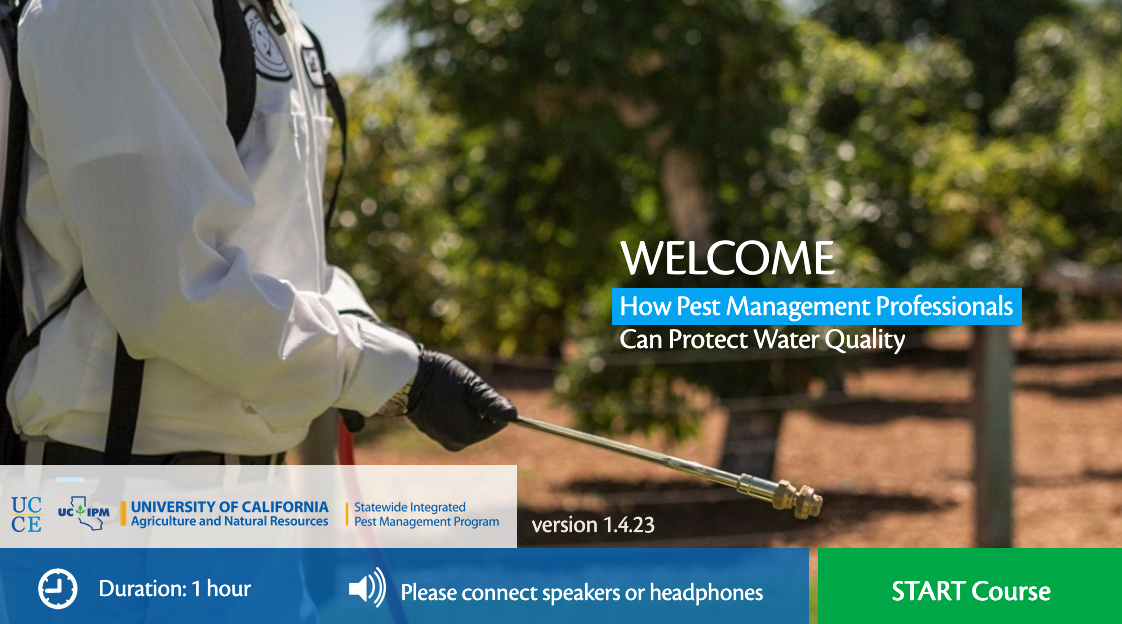

Continuing Education Units
This course must be completed by December 30 of the current year. Download the certificate immediately when you complete the course. You will not be able to retrieve your certificate after December 30.
- Teacher: Cheryl Reynolds
Idaho 4-H Volunteer Orientation is an online course designed to orient new 4-H volunteers. Participants will learn:
- Volunteer Roles & Relationships
- Positive Youth Development
- Youth/Adult Partnerships
- Safe & Inclusive Environments
- Learn by Doing
For more information contact Donna Schwarting; University of Idaho; dschwarting@uidaho.edu
- Teacher: Teresa Tverdy

This course will prepare individuals for the Idaho State Department of Agriculture pesticide exams: Private Applicator (PA) Applicator Core Competency (CO), Regulatory Pest Control (RP) and Commercial Apprentice (CA) category.
You will have access to eight online instructional sessions to complete at your own pace. Each session contains an outline to use for enhancing your study and quizzes to evaluate your knowledge.
For more information please contact: University of Idaho Extension at cals-ipm@uidaho.edu
The fee for this course is $35-one month access. To purchase and enroll in the course, click the following button:
- Teacher: cals ipm
- Teacher: Kathy Anderson
- Teacher: Colleen Brady
An Introduction to Organic Dairy Production is a self-directed course designed for Extension educators and other agriculture service providers, as well as farmers and students who want to better understand certified organic dairy farming. It is made of ten modules on key organic dairy topics. Each module combines required readings, narrated lessons, optional homework exercises and recommended resources, and end-of-module quizzes.
For more information, contact Amanda Gervais at amanda.gervais@uvm.edu.- Teacher: Susan Brouillette
The Introduction to Southeastern Prescribed Fire course is designed to introduce students to the fundamental basics of prescribed burning in Southeastern forested ecosystems. At the end of the course the student should have a working knowledge of fire law, fire terminology, fire prescriptions, fire safety, firebreaks, smoke management and a basic understanding of how to conduct a prescribed burn. This course is not intended to take the place of state Certification courses, workshops, or experience in the field. Rather, it is intended to give students a basic understanding of the principles of prescribed fire and fire effects.
- Teacher: Jennifer Fawcett
- Teacher: Dwayne Hunter
- Content Specialists: Elliot Nauert
Keeping Your Horse at Home will teach you how to be safe around horses. It focuses on basic horse behavior, proper horse handling, safe attire and equipment and safe riding on the trail.
- Teacher: Kathy Anderson
- Teacher: Colleen Brady
Esta capacitación cumple con la necesidad de tener entrenamiento acreditado de seguridad alimentaria según LB 262 (2024), como parte de la Ley de Alimentos Puros de Nebraska. Este curso aborda las leyes específicas de Nebraska y entonces quizás no refleje las leyes de otros estados o países.
Esta capacitación está respaldada por el Departamento de Agricultura de Nebraska, el Departamento de Salud del Condado de Douglas (Nebraska) y el Departamento de Salud de Lincoln y el Condado de Lancaster (Nebraska).
El costo de este curso de $25.
- Teacher: Cindy Brison, MS, RDN
- Teacher: David Diez
- Teacher: Kezia Huseman
- Teacher: Linda Reddish
- Teacher: Angie Rushman
- Teacher: Deborah Weitzenkamp
Esta capacitación cumple con la necesidad de tener entrenamiento acreditado de seguridad alimentaria según LB 262 (2024), como parte de la Ley de Alimentos Puros de Nebraska. Este curso aborda las leyes específicas de Nebraska y entonces quizás no refleje las leyes de otros estados o países.
Esta capacitación está respaldada por el Departamento de Agricultura de Nebraska, el Departamento de Salud del Condado de Douglas (Nebraska) y el Departamento de Salud de Lincoln y el Condado de Lancaster (Nebraska).
El costo de este curso de $25.
- Teacher: Cindy Brison, MS, RDN
- Teacher: Kezia Huseman
- Teacher: Linda Reddish
- Teacher: Angie Rushman
- Teacher: Deborah Weitzenkamp
Listen to an update on current forest pests and diseases and how to manage for them.
0.5 Category 1 ceu; $10
- Teacher: Raymond Berthiaume
This course is designed for horse owners and professionals who will learn methods for determining whether your horse is over- or under-weight, the implications of both conditions, and how to safely bring your horse to its ideal weight. The content is
self-paced.
The fee for this course is $10. To purchase and enroll in the course, click the following button.
If you purchase at least $40 worth of courses from this category, you can receive a 20% discount by entering the voucher code of HorseQuest20.
- Teacher: Kathy Anderson
- Teacher: Colleen Brady
- Teacher: Laura Kenny
Managing Invasive Species in Landscapes is an online course for Master Gardeners looking for further certification or home gardeners.
Students will learn how to identify and manage a variety of invasive species such as spotted wing drosophila, brown marmorated stink bug, Japanese beetles, and downy mildew. Once you have completed this course and received a certificate, you will receive Master Gardener credit.
For information or to enroll please contact:
Mary Meyer, meyer023@umn.edu or
Echo Martin, mart1794@umn.edu with University of Minnesota
- Teacher: Vera Krischik
- Teacher: Mary Meyer
Manure Application Training – Liquid Manure is an online training for manure applicators, especially for those who are new to the industry. Learners will be guided through the seven steps of manure application—Equipment Inspection, Loading Manure, Driving to the Field, Preparing to Spread, Manure Spreading, Visiting Potential Clients' Farms, and Handling Manure Spills.
After the training, learners will know how to apply manure properly, improve manure handling safety, and increase professionalism in the industry. Please note that learners should practice the steps outlined in this training in their daily work in order to master the knowledge and skills for manure application.
For more information or to enroll please contact:
- Kevin Erb, University of Wisconsin-Extension, kevin.erb@ces.uwex.edu
- Charles Gould, Michigan State University-Extension, gouldm@msu.edu
- Mary Keena, North Dakota State University, mary.keena@ndsu.edu
- Melony Wilson, University of Georgia, mlwilson@uga.edu
- Douglas Hamilton, Oklahoma State University, dhamilt@okstate.edu
- Teacher: Kevin Erb
- Teacher: Janice Kepka
Manure Management Strategies provide the participants the opportunity to learn the importance manure management to minimize the environmental impact of the waste. Composting, and other scientifically proven strategies are discussed.The participants will be able to identify the water quality concerns in regards to manure management, recognize the worst and best manure management practices and describe composting practices and benefits. This course offers a badge and is one of several available in the HorseQuest Badge Portfolio. This course includes a video, a learning lesson, and a quiz.
For information contact Kathy Anderson, kanderson1@unl.edu
- Teacher: Kathy Anderson
- Teacher: Colleen Brady
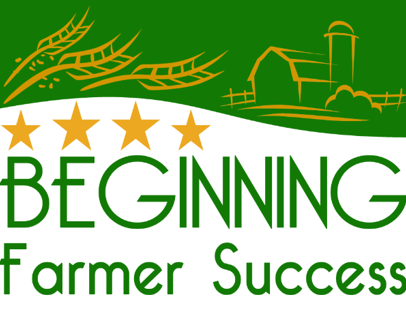
This class series is designed for people who are considering or in the beginning stages of starting a farm as a business.
The Maryland Beginning Farmer Success Course is a ten-week introduction to the foundational topics an aspiring farmer in Maryland should know. Topics covered will include business planning, marketing, crop production, livestock husbandry, soil health, pest management, food safety, and regulations and certifications. Additional elective resources will cover more specialized topics, such as organic production, urban agriculture, and direct marketing to local customers.
The course is offered every winter, from February through April. It meets once a week for 10 weeks. You can attend entirely online, or there are two optional in person classes held simultaneously in several locations in central Maryland, depending on how many people RSVP from each county. There will also be readings/homework each week here on Extension Campus.
If you have any questions, please contact Neith Little at nglittle@umd.edu
Equal opportunity and accomodation:
University programs, activities, and facilities are available to all without regard to race, color, sex, gender identity or expression, sexual orientation, marital status, age, national origin, political affiliation, physical or mental disability, religion, protected veteran status, genetic information, personal appearance, or any other legally protected class.
If you need a reasonable accommodation to participate in any event or activity, please contact Andrea Franchini by phone at 301-226-7416 or by email at andrea1@umd.edu on or before January 8 .
Los programas, actividades e instalaciones de la universidad están disponibles para todos sin distinción de raza, color, sexo, identidad o expresión de género, orientación sexual, estado civil, edad, origen nacional, afiliación política, discapacidad física o mental, religión, estado de veterano protegido, información genética, apariencia personal o cualquier otra clase legalmente protegida.
Si necesita adaptaciones razonables para participar en cualquier evento o actividad, comuníquese con Neith Little a número teléfono 410-856-1850 x123 o al correo electrónico nglittle@umd.edu antes el quince de enero.
Les programmes, activités et installations universitaires sont accessibles à tous sans distinction de race, couleur, sexe, identité ou expression de genre, orientation sexuelle, état civil, âge, origine nationale, appartenance politique, handicap physique ou mental, religion, statut de vétéran protégé, informations génétiques, apparence personnelle ou toute autre classe légalement protégée.
Si vous avez besoin d'une commodité raisonnable pour participer à un événement ou activité, contactez-vous avec le bureau d'extension de l'Université du Maryland. 410-856-1850 nglittle@umd.edu
所有人均可使用大學課程、活動和設施,而不必考慮種族、膚色、性別、性別認同或表達方式、性取向、婚姻狀況、年齡、國籍、政治背景、身體或精神殘疾、宗教信仰、受保護退伍軍人身份、遺傳信息、個人外貌或任何其他受法律保護的階層。
如果您需要合理的住宿條件來參加任何活動,請聯絡您當地的馬里蘭大學推廣辦公室。410-856-1850
대학 프로그램, 행사_및 시설은 인종, 피부색, 성별,성 정체성 또는 표현, 성적 지향, 결혼 여부, 나이, 출신 국가, 정치적 소속, 신체적 또는 정신적 장애, 종교, 보호재향 _군인, 정보, 외모 또는 법적으로 보호를 받고 있는_기타 계층에 관계없이 누구나 이용하실 수 있습니다.
행사 활동에 참여하기 위해 적절한 숙박 시설이 _필요하시다면 해당 지역의 메릴랜드 대학교 확장 사무소에 문의해 주시기 바랍니다. 410-856-1850 nglittle@umd.edu
Программы, деятельность, и объекты материально-технической базы Университета доступны всем желающим, независимо от их расовой принадлежностирасы, цвета кожи, пола, гендерной идентичности или гендерного самовыражения, сексуальной ориентации, семейного положения, возраста, национальностип, политической принадлежности, физических или умственных ограничений, религиозных взглядов, наличия недостатков, религии, статуса защищенногозаконом статуса ветерана вооруженных сил, генетической информации, внешних особенностей, а также другим категориям населения, права которых охраняются законом.
Если для участия в определенном мероприятии Вам необходимо, чтобы обеспечивалось разумное приспособление, учитывающее Ваши индивидуальные потребности, пожалуйста, свяжитесь с Вашим местным офисом-представительством Университета Мэриленда. 410-856-1850 nglittle@umd.edu- Teacher: Andrea Franchini
- Teacher: Sarah Hirsh
- Teacher: Dwayne Joseph
- Teacher: Neith Little
- Teacher: Kelly Nichols
- Teacher: Haley Sater
- Teacher: Hayden Schug
- Instructor: Erika Crowl
- Instructor: Andrew Kness
- Instructor: Emily Zobel
The audience for this course is:
By taking this course, students will learn:
For more information or to enroll please contact:
- Teacher: Heidi Barker
- Teacher: Rebecca Betts
- Teacher: Suzanne Cagle
- Teacher: Zeanny Egea
- Teacher: michele kroll
- Teacher: Melissa Lee
- Teacher: Alyssa Lemmermann
Mitigating Pollinator Decline in Landscapes is an online course for Master Gardeners looking for further certification or home gardeners. Students will learn the basics on different kinds of bees, why they are in decline, and how homeowners can work to conserve them in the landscape. Once you have completed this course and received a certificate, you will receive Master Gardener credit.
For information or to enroll please contact:
Mary Meyer, meyer023@umn.edu or
Echo Martin, mart1794@umn.edu with University of Minnesota
- Teacher: Vera Krischik
Mortality Composting is a self-directed, fee based course for Ohio farmers. Participants will become certified to practice mortality composting on their farm from taking this course. This course must be completed by an Ohioan who plans to use composting to dispose of livestock mortality. The course is broken down by chapters following the Composting Manual which you can download below. Each chapter is presented via PowerPoint with voice-over. You are free to move at your own pace and will become certified once you have passed the final test.
Course fee: $17. To purchase and enroll in this course, please click here.
For information, contact Amanda Douridas, The Ohio State University, at douridas.9@osu.edu
- Teacher: Amanda Douridas
- Teacher: Ashley Kent
- Teacher: Lydia Maunz

National 4-H Headquarters Overnight Chaperone Training is a self directed course for volunteers and staff that will attend National 4-H Headquarters’ events. Participants will learn effective ways to discipline youth, recognize signs of abuse, and how to deal with emergencies.
For information or to enroll contact Sarah Torbert at storbert@uwyo.edu
- Teacher: Sarah Torbert

- 1sttime attendees
- Anyone involved in an NPDES-Permitted NODT construction project
- Contractors involved in any aspect of the installation of erosion and sediment control Best Management Practices on NDOT Construction projects.
- Basic understanding of NDOT policies and State regulations for stormwater management on construction sites.
- Knowledge of the process of soil erosion.
- An understanding of basic drainage, topography, climate, and other factors that influence soil erosion potential on construction sites.
- An understanding of the practical installation of erosion & sediment control Best Management Practices, following NDOT Standard Specifications, Special Provisions and Standard Plans.
- This online Installer Certification course includes a series of presentations and quizzes that an applicant must successfully complete in order to print off their re-certification certificate. You can self-enroll, and there is no cost. You will need to create an account with a valid email address. Course Link:
- The Installer Certification Course contains Four (4) modules. At the end of each module, you will go through a five-question quiz with questions pertaining specifically to the module. You must get all five questions correct before you can move on to the next course module.
- Course materials will accompany the different modules as needed for reference.
- Upon completion, this Installer Certification is good for 5 years.
- This Course is a prerequisite for the NDOR Erosion & Sediment Control Inspector Certification
- To be a Certified Inspector, you must complete the NDOR Erosion & Sediment Control Inspector Certification course.
- Teacher: Megan Patent-Nygren
NDOT Local Public Agency Right of Way Training is a Self-directed course for Local Public Agencies who will learn step by step procedures and practices for the fair and comprehensive acquisition of property needed for the completion of publicly funded local projects.
For more information or to enroll please contact Megan Patent-Nygren, University of Nebraska, at mpatentnygren2@unl.edu
- Teacher: Megan Patent-Nygren
This certification is required to all personnel who are monitoring the maturity meter for accepting testing. The maturity method is a simple technique for predicting concrete strength in lieu of conventional cylinders. Certification is required of all individuals utilizing the maturity method. Individuals certified for NDOT Maturity Method Field Monitoring will know the basic use and terminologies associated with the maturity method. They will have the knowledge and tools available to them for the installation of wires, monitoring concrete placement temperatures, calculating the Time-Temperature-Factor and documentation of data.
Certification Duration: 5 Years
Individuals that have already taken the “NDOT Maturity Method Field Monitoring” certification training do not need to take the web based course. Check RUG or SiteManager to if you’ve already received the “Maturity Method Field Monitoring” certification.
If you have questions about tracking this certification, please contact Site Manager Materials Staff at Dor.sitemanagermaterials@nebraska.gov, or 402-479-4760.
For information or to enroll contact Megan Patent-Nygren, University of Nebraska LTAP at mpatentnygren2@unl.edu
- Teacher: Megan Patent-Nygren
This Erosion and Sediment Control Inspector Recertification course seeks to maintain the expertise of "Qualified Personnel" for construction site inspections. Qualified Personnel are those that have completed the live NDOT-LTAP Erosion and Sediment Control Inspector Certification training course within the past five (5) years.
IMPORTANT: This course is available only for those that have previously obtained NDOT Erosion Control Inspector Certification. If you have not attended a live NDOT Erosion Control Inspector Certification Course, and have not been issued a 4-digit certification number, you are not approved to enroll in this course. If you proceed with enrolling in this on-line RECERTIFICATION without previous certification from NDOT and NE LTAP, then you will not be issued certification and will need to attend a live course offering.
For information or to enroll contact Megan Patent-Nygren, University of Nebraska LTAP at mpatentnygren2@unl.edu
- Teacher: Megan Patent-Nygren

The audience for this course is: middle school youth interested in rabbits
By taking this course, students will learn: Rabbit anatomy and physiology, health care, nutrition, and basics of rabbit management
For more information or to enroll please contact: lisa.karr@unl.edu
- Teacher: Lisa Karr
Beef Cow
Basics-Plus is a 12 module course that provides cutting edge information on nutrition, forages, supplements, and
economics. A short quiz at the
end of each lesson for self-assessment assures that concepts are
understood.Once all of the quizzes are completed, a certificate of completion can be printed. Modules include: Goals for the Cow/Calf Producer, Basic Considerations for Cow Nutrition, Metabolizable Protein System, Minerals and Vitamins for Beef Cows, Replacement Heifer Nutrition, Basic Ration Formulation, Forage Analysis and Inventory, Perennial Forage Production, Annual Forage Crops, Alfalfa Production: Opportunities for Improvement, Livestock Grazing Management on Range and Pasture, and Feed Ration Economics. It is important that you, as a beef producer, have confidence, competence, and direction to be a successful livestock producer. Beef Cow Basics-Plus will help capitalize on your own unique resources and skills. It provides the basics for anyone interested in beef cow production including high school students, homeschool students, older 4-H and FFA members, community college students, and university students.
This course has been approved for 12 American Registry of Professional Animal Scientists (ARPAS) Continuing Education Units (CEU’s). For more information contact Troy Walz, Nebraska Extension Educator, at troy.walz@unl.edu
To purchase and enroll, click the appropriate link below:
- Teacher: Steve Pritchard
- Teacher: Troy Walz
- Content Specialists: Mary Jarvi
This course is about Using Chemigation Safely and Effectively, covering factors affecting chemigation practice, irrigation systems, chemigation equipment and safety devices and practices. It also will address calibration procedures, management, and laws and regulations affecting chemigation. For more information or to enroll please contact Julie Jacobs, University of Nebraska, at jjacobs7@unl.edu
- Teacher: Frank Bright
- Teacher: Julie Jacobs
- Teacher: Jennifer Weisbrod

Co-Parenting for Successful Kids is an unbiased, research-based education class designed to help separating and divorcing parents cope with divorce and custody. Parents learn to answer children’s questions and keep their children safe and out of their conflict. Co-Parenting for Successful Kids strengthens communication skills to improve interactions with children and the other parent. The goal of Co-Parenting for Successful Kids is to develop respectful, responsive, and responsible Co-Parents.
For information contact: parenting@unl.edu or Toll free (855) 308-8037 (If no one answers leave a message and we will call you back). Also, you may try 402-873-3166.
- For Email Help: : parenting@unl.edu
- Instructor: Jeanette Friesen
- Instructor: Kezia Huseman
- Instructor: Becky Hutchings
- Instructor: Erin Kampbell
- Instructor: Ingrid Lindal
- Instructor: Lisa Poppe
- Instructor: Linda Reddish
- Instructor: Kim Wellsandt
- Instructor: Tasha Wulf
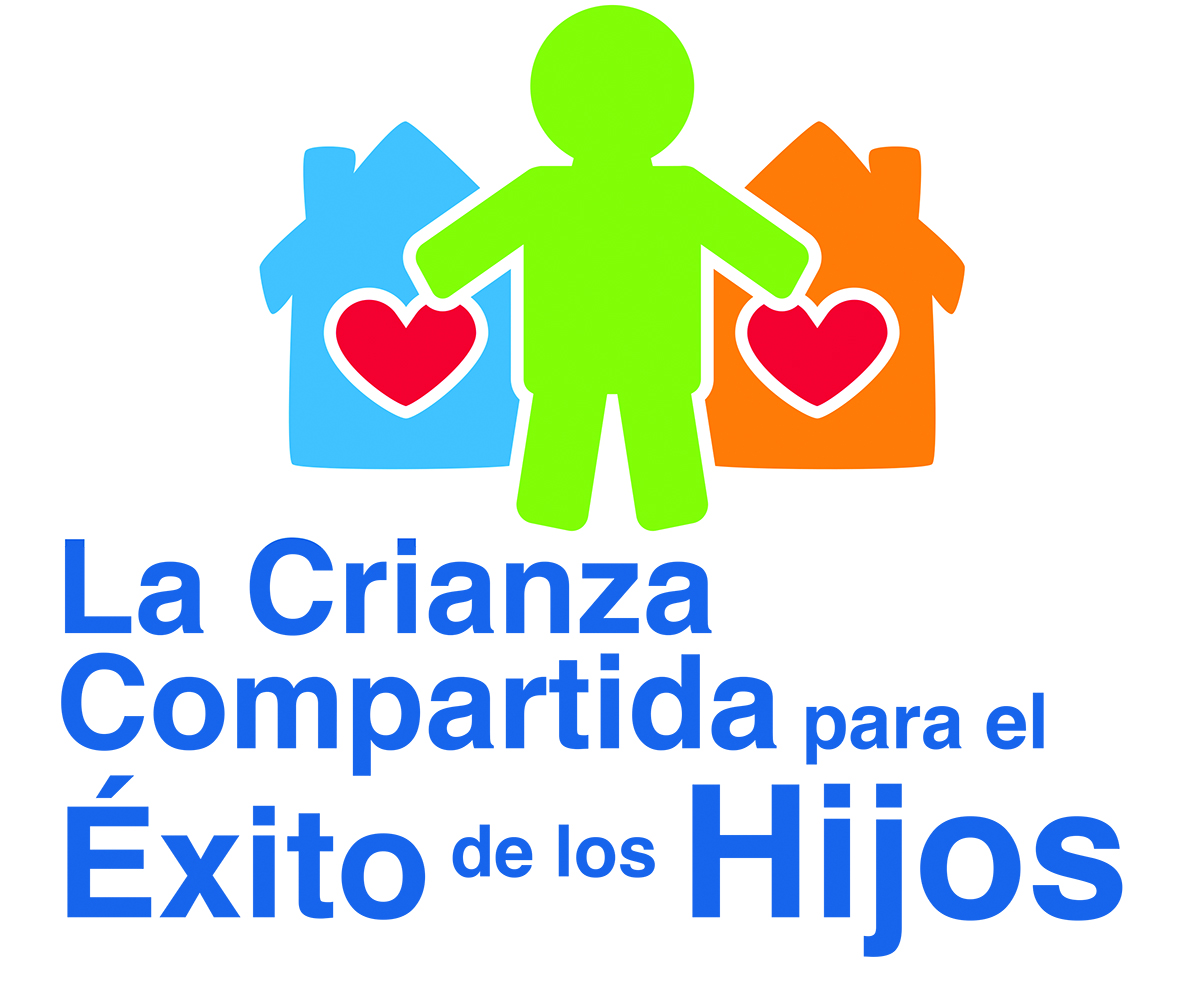
La Crianza Compartida para el Éxito de los Hijos, es una clase educativa imparcial, basada en la investigación, diseñada para ayudar a los padres que se están separando o divorciando, a lidiar con el divorcio y la custodia. Los padres aprenden a responder a las preguntas de los niños y a mantener a sus hijos protegidos y separados del conflicto de sus padres. La Crianza Compartida para el Éxito de los Hijos fortalece las habilidades de comunicación para mejorar las interacciones con los niños y el otro padre. El objetivo de la clase es que los padres aprendan a desarrollar una crianza compartida respetuosa, receptiva y responsable.
Para más información, haga contacto a través del correo: parenting@unl.edu o haga una llamada gratuita al (855) 308-8037 (Si nadie responde deje un mensaje y le devolveremos la llamada).
Crianza compartida: Guía del usuario
Lista de recursos para la crianza compartida
- Instructor: Kezia Huseman
- Instructor: Ingrid Lindal
- Instructor: Linda Reddish
- Instructor: Kim Wellsandt
The audience for this course is: Nevada Certified Pesticide Applicators or Nevada Licensed Government Applicators
By taking this course, students will learn: Integrated Pest Management
For more information or to enroll please contact: Carrie Jensen, carriejensen@unr.edu or 775.336.0249.
- Teacher: David Harrison
- Teacher: Melody Hefner
- Teacher: Carrie Jensen
Owning a horse can be an enjoyable experience and many factors enter into this initial decision. There are many considerations and obligation of ownership. Included are such concerns as what horse activities or horse related activities are in your area, determining your real interest in horses, alternatives to owning a horse, how to decide what kind of horse to buy, horse management practices and costs and the benefits you and your family can gain from owning a horse. If you have any questions please contact Craig Wood, craig.wood@eXtension.org.
- Teacher: Kathy Anderson
- Teacher: Colleen Brady
North Carolina Certification for Nutrient Management Planners is a course for Local, state, and federal agency personnel involved in nutrient management planning in North Carolina. This course is part one of a five part certification program required of anyone certifying nutrient management plans in North Carolina. For more information or to enroll contact Dr. Stephanie Kulesza, NC State University - Crop and Soil Sciences at sbkulesz@ncsu.edu

The purpose of this self-paced course is to provide an overview of the Southeastern Forest Pest manual for Forest Pest Control pesticide applicators in preparation of the certification examination in the State of North Carolina. You will need to know and understand the information presented in this manual when applying pesticides in a forested system. Although pest species and management practices may be similar to Christmas tree production, this manual and the Forest Pest Control certification exams administered by the participating states (Alabama, Arkansas, Louisiana, North Carolina, South Carolina, Tennessee, and Mississippi) do not include this crop.
Cost for this course is $45.
- Teacher: Wayne Buhler
- Teacher: Esther Morris
- Teacher: Peg Shuffstall
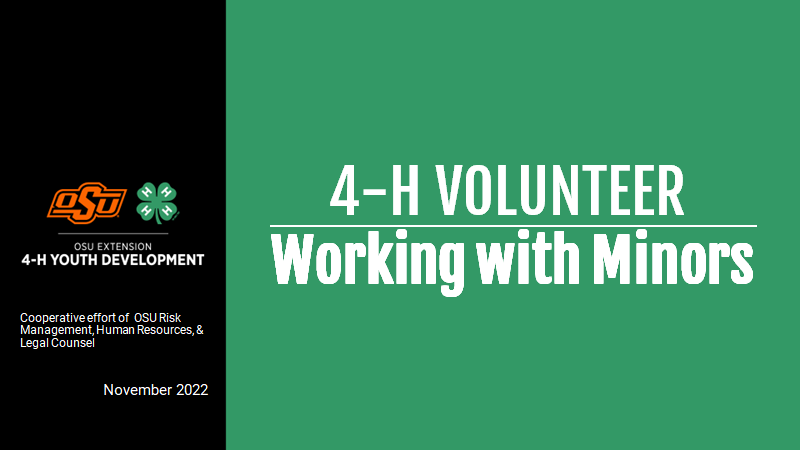

OSU, OCES and 4-H Youth Development expects faculty, staff, volunteers, leadership teams, and teen volunteers who interact with youth under the age of 18 do so appropriately and in accordance with University policy.
In 2013 the OSU A&M Board of Regents approved policy 1-0135 regarding minors participating in OSU related activities and programs. The policy applies to ALL interactions with youth participating in 4-H club meetings, 4-H activities sponsored by a club, county/district/state activities and events, overnight camps, day camps, workshops, school enrichment/CNEP/EFNEP programs, practices and workouts, campus-based activities, and/or any other Extension hosted program or activity.
Oklahoma State University requires both staff and volunteers complete an annual review of the OSU policy regarding work with minors.
For more information contact Leah Haxton, Oklahoma State University, at Leah.g.haxton@okstate.edu or Karla Knoepfli, Oklahoma State University, at karla.knoepfli@okstate.edu
- Teacher: carl hamby
- Teacher: Leah Haxton
- Teacher: Dwayne Hunter
- Teacher: Karla Knoepfli
The Manure Composting course comes to you from the Animal Science Program at Rutgers Cooperative Extension with help from their friends at the Office of Continuing Professional Education.
- Teacher: Brian Warzak
The Manure Composting course comes to you from the Animal Science Program at Rutgers Cooperative Extension with help from their friends at the Office of Continuing Professional Education.
- Teacher: Brian Warzak
Listen about some of the research and testing that is occurring at the lab located on the University of Maine campus, and impacts
this may have on the forest products industry.
1.0 Category 1 ceu; $20
- Teacher: Raymond Berthiaume
Instructor/Contact: Ashley Kent, Montana State University Extension’s Local Government Center, ashleykent@montana.edu
- Teacher: Schuyler Germann
- Teacher: Ashley Kent
- Teacher: Lydia Maunz
- Teacher: Kate Wade
Pasture Associated Laminitis Prevention Strategies provides participants the opportunity to learn about the physiology, causes and prevention of laminitis. Participants will be able to describe the physiological changes in the hoof that occur with laminitis, describe the symptoms of laminitis that result from those physiological changes, list what conditions increase risk for laminitis and explain how to manage grazing and pastures to reduce laminitis risk. This course offers a badge and is one of several available in the HorseQuest Badge Portfolio. This course includes a video, a learning lesson, and a quiz.
For information contact Kathy Anderson, kanderson1@unl.edu
The fee for this course is $10. To purchase and enroll in the course, click the following button.
If you purchase at least $40 worth of courses from this category, you can receive a 20% discount by entering the voucher code of HorseQuest20.
- Teacher: Kathy Anderson
- Teacher: Colleen Brady
Pen Rider and Processors on-line Horse Safety and Care is for feedlot and cattle producers and employees. In this course participants will learn how to safely handle horses when working in feed yards as well as basic horse care and management.
For more information about the course or how to enroll contact Kathy Anderson with the University of Nebraska Extension at kanderson@unl.edu
This course requires a $25 registration fee. Once the registration fee is paid, you will get an email with an ENROLLMENT KEY.
Please go to: Pen Rider and Processors Horse Safety and Care Certification Course at http://marketplace.unl.edu/extension/programs/feedlot-horse.html to enroll.
- Teacher: Kathy Anderson
- Teacher: Colleen Brady
Precision agriculture is an integral part of today's crop production. It's steady stream of technological improvements makes it hard for farmers and other ag professionals to stay current.
This nine part course features precision Agriculture's educator of the year Dr. John Fulton and Extension Specialist Mark Hall. Each lesson features video instruction, handouts and a test. Students who make 80% or higher on all the test and complete a course evaluation will receive a certificate of completion. Students are welcome to audit the course without taking the test. For more information or to enroll contact hallmah@auburn.edu
- Teacher: John Fulton
En este curso interactivo, los residentes y visitantes de Oregón y de otros estados del oeste pueden obtener información sobre el evento de la zona de subducción de Cascadia y aprender a prepararse. Este curso se ofrece gratis al público en campus.eXtension.org a través del programa de Servicios de Extensión de Oregon State University.
Este proyecto es apoyado por el Programa de Subvenciones Competitivas Smith-Lever para Necesidades Especiales del Instituto Nacional de Alimentación y Agricultura (Premio # 2018-41210-28702).
- Teacher: Glenda Hyde
- Teacher: Lauren Kraemer
- Teacher: Victor Villegas
- Teacher: Glenda Hyde
- Teacher: Lauren Kraemer
- Teacher: Victor Villegas
Preparing to be a Professional Horse Show Judge is a self directed course that will teach adults how to prepare
to be a professional horse show judge.
The course fee is $20. To purchase and enroll in this course, please click Buy/Enroll below.
For more information about the course please contact Kathleen Anderson, University of Nebraska Extension, kanderson1@unl.edu
- Teacher: Kathy Anderson
- Teacher: Colleen Brady
- Teacher: Kris Hiney
This Proper Respirator Use course will help you understand when and why a respirator is necessary, how to safely and correctly select, wear and maintain a respirator, respect a respirator's capabilities and limitations, recognize and respond appropriately in emergency situations, and comprehend the medical signs and symptoms that may limit or prevent effective respirator use.
This course is designed to take approximately 1 hour. One (1) Safety CEU is available for residents in the following states.
- Oklahoma
- Utah
Teacher for the course is Michael Wierda, Utah State University. He can be reached at michael.wierda@usu.edu
- Teacher: Peggy Shuffstall
- Teacher: Michael Wierda
Sales Fraud in the Horse Industry provides participants the opportunity to learn how to protect themselves both as buyers, and as sellers, of horses from potential fraud. They will be able to discuss the different ways that horse sellers can help prevent legal disputes, examine the different tips to look for when buying a horse, identify how horse buyers can avoid legal disputes, assess the importance of a written sales agreement and determine what the true aspect of fraud is in a horse sale.This course offers a badge and is one of several available in the HorseQuest Badge Portfolio. This course includes a video, a learning lesson, and a quiz.
For information contact Kathy Anderson, kanderson1@unl.edu
- Teacher: Kathy Anderson
- Teacher: Colleen Brady

Race Nebraska provides information about the Nebraska Horse Racing industry. This course contains recorded presentations from live seminars on topics including Status of Tracks & Facilities, What Makes a Horse “Nebraska-Bred” Eligible, Ownership Options, Role of Gaming Commission, Track Veterinarian’s role, Tips on Breeding and Feeding, Retired Racehorses, Pedigree Evaluation, Selection and Conformation Evaluation, Young Horse Training, Soundness Evaluation, Foaling, Newborn Foal can and much more.
In this course, you can view all of the presentations from the Nebraska Horse Racing Seminar.- Teacher: Kathy Anderson
- Teacher: Colleen Brady
- Teacher: Dani Forster
- Teacher: Sarah Vos

The Reach Out for Wellness Course is designed to support the mental health needs of Extension professionals following natural disasters.
This research-based course is comprised of five modules with engaging videos and additional resources to help you reflect on your wellness and learn strategies to support your needs associated with disaster recovery.
Participation is free, self-paced and will help you:
- Better understand your own wellness.
- Gain insights on the personal impacts of natural disasters.
- Learn how to use your support system to cope with stress related to natural disasters.
- Instructor: Seth Teager
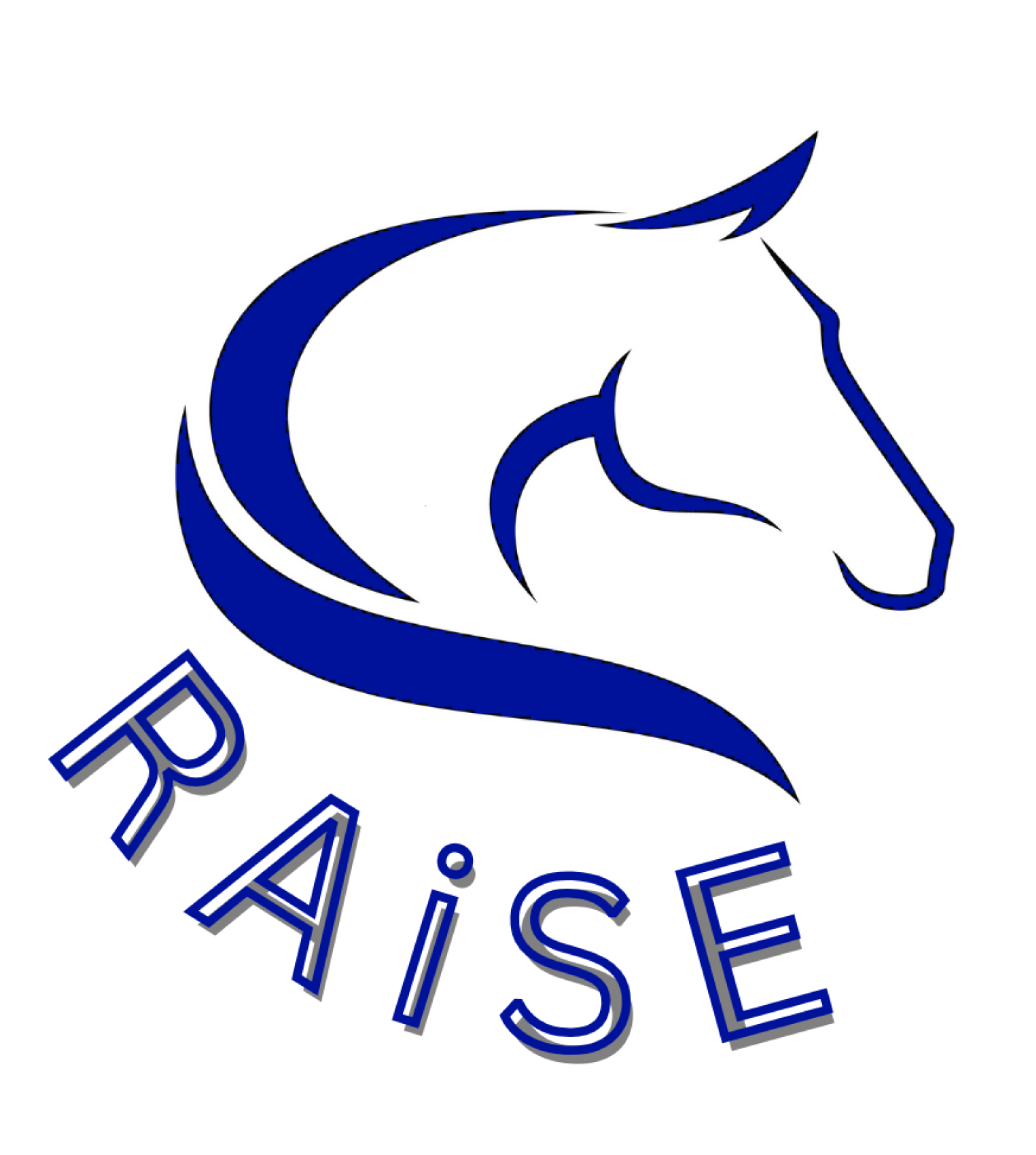
Pricing
2 or more enrollments for $30.00 each
50 or more enrollments for $25.00 each
101 or more for enrollments $20.00 each
- Teacher: Kathy Anderson
- Teacher: Colleen Brady
- Teacher: Kris Hiney
This module will cover
common respiratory hazards and diseases found in agriculture. The module also
discusses how to reduce exposures and the use, regulations and requirements,
and maintenance of the most commonly used respirators in agriculture.
This course is designed to take approximately 1 hour.One (1) Safety CEU is available for residents in the following states.
- Oklahoma
- Utah
Teacher for the course is Michael Wierda, Utah State University. He can be reached at michael.wierda@usu.edu.
- Teacher: Peggy Shuffstall
- Teacher: Michael Wierda
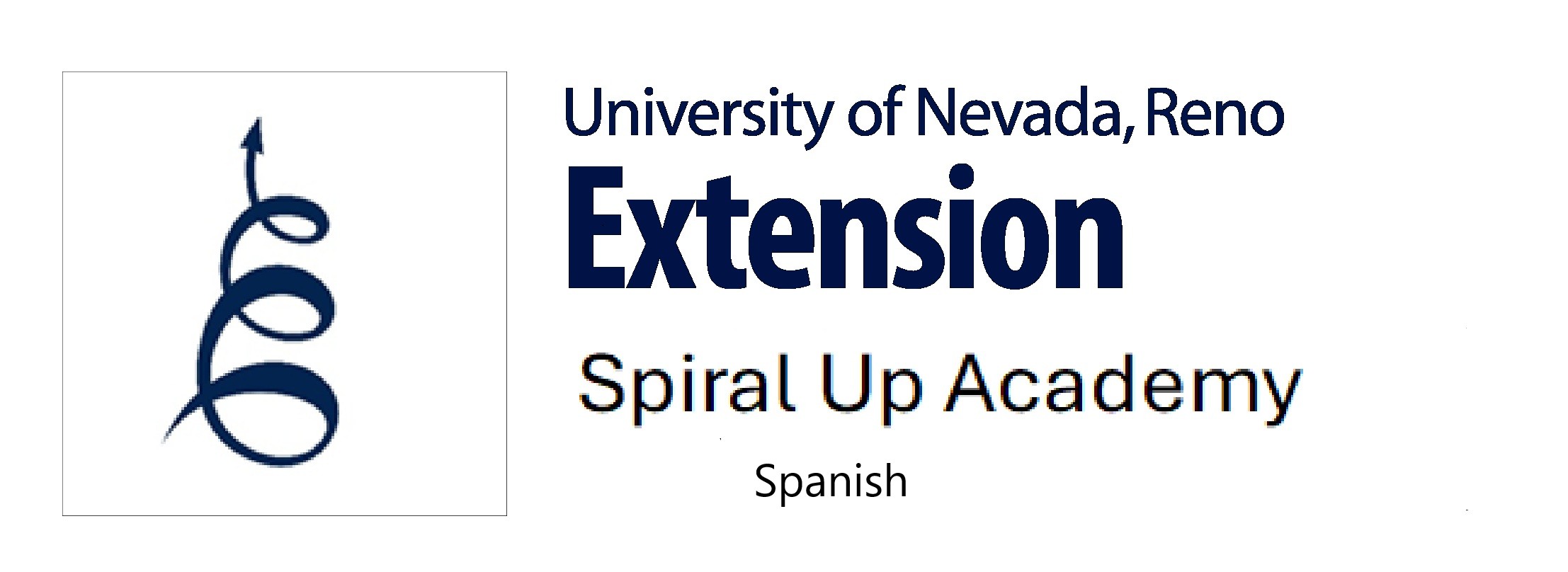
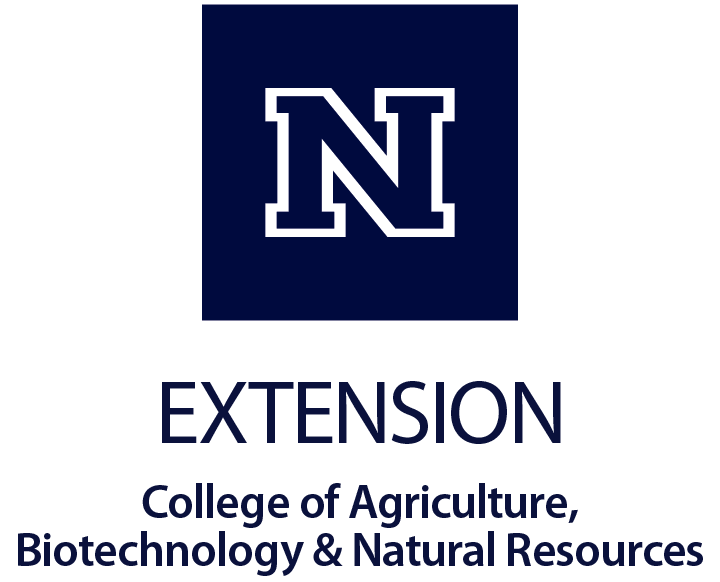
This course is restricted and only available to the University of Nevada Reno Extension Spiral Up Academy participants.
Este curso está restringido y solo está disponible para los participantes de la Academia Spiral Up de Extensión de Reno de la Universidad de Nevada.- Teacher: Cynthia James
- Teacher: Stephanie May
- Teacher: Danielle Pertile
- Teacher: Cathryn Peshlakai
- Teacher: Monica Salazar


This course is restricted and only available to the University of Nevada Reno Extension Spiral Up Academy participants.Este curso está restringido y solo está disponible para los participantes de la Academia Spiral Up de Extensión de Reno de la Universidad de Nevada.
Esta capacitación se centrará en aumentar la comprensión del desarrollo y los hitos de los niños, estrategias para apoyar el crecimiento y el desarrollo, reconocer las diferencias de desarrollo.
- Teacher: Cynthia James
- Teacher: Stephanie May
- Teacher: Danielle Pertile
- Teacher: Cathryn Peshlakai
- Teacher: Monica Salazar


This
course is restricted and only available to the University of Nevada Reno
Extension Spiral Up Academy participants.Este
curso está restringido y solo está disponible para los participantes de la
Academia Spiral Up de Extensión de Reno de la Universidad de Nevada.
Esta capacitación se centra en cómo los maestros priorizan el tiempo para establecer conexiones y relaciones con todos los niños pequeños y sus familias. Se introducen cuatro estrategias: aumentar el tiempo positivo, conversaciones significativas, unirse al juego e interacciones receptivas, y construir asociaciones familiares.
- Teacher: Cynthia James
- Teacher: Stephanie May
- Teacher: Danielle Pertile
- Teacher: Cathryn Peshlakai
- Teacher: Monica Salazar


This
course is restricted and only available to the University of Nevada Reno
Extension Spiral Up Academy participants.
Este curso está restringido y solo está disponible para los participantes de la Academia Spiral Up de Extensión de Reno de la Universidad de Nevada.
Esta capacitación se centrará en la importancia del juego, cómo los niños aprenden a través del juego, los diferentes tipos de juego, la creación de experiencias de juego que fomenten el desarrollo y la provisión de materiales apropiados para el desarrollo para involucrar a los niños en el juego.
- Teacher: Cynthia James
- Teacher: Stephanie May
- Teacher: Danielle Pertile
- Teacher: Cathryn Peshlakai
- Teacher: Monica Salazar


This
course is restricted and only available to the University of Nevada Reno
Extension Spiral Up Academy participants.
Este curso está restringido y solo está disponible para los participantes de la Academia Spiral Up de Extensión de Reno de la Universidad de Nevada.
En este tema, exploraremos cómo las siguientes grandes ideas funcionan juntas para crear un entorno de aprendizaje eficaz para los niños pequeños: Desarrollar horarios y rutinas diarias, Planificar e implementar transiciones y Enseñar expectativas y reglas.- Teacher: Stephanie May
- Teacher: Danielle Pertile
- Teacher: Cathryn Peshlakai
- Teacher: Monica Salazar


This
course is restricted and only available to the University of Nevada Reno
Extension Spiral Up Academy participants.
Este curso está restringido y solo está disponible para los participantes de la Academia Spiral Up de Extensión de Reno de la Universidad de Nevada.
En este tema, exploraremos cómo las siguientes grandes ideas funcionan juntas para crear un entorno de aprendizaje eficaz para los niños pequeños: Desarrollar horarios y rutinas diarias, Planificar e implementar transiciones y Enseñar expectativas y reglas.
- Teacher: Stephanie May
- Teacher: Danielle Pertile
- Teacher: Cathryn Peshlakai
- Teacher: Monica Salazar


This
course is restricted and only available to the University of Nevada Reno
Extension Spiral Up Academy participants.
Este curso está restringido y solo está disponible para los participantes de la Academia Spiral Up de Extensión de Reno de la Universidad de Nevada.
Esta capacitación se enfoca en el desarrollo profesional y en encontrar alegría al trabajar con niños y compañeros de trabajo.
- Teacher: Cynthia James
- Teacher: Stephanie May
- Teacher: Danielle Pertile
- Teacher: Cathryn Peshlakai
- Teacher: Monica Salazar
Second Chances for Horses provides participants the opportunity to learn the unique challenges that accompany the adoption of second career horses. Including how to select an adoption facility, and common behavioral and physical considerations for second career horses. This course offers a badge and is one of several available in the HorseQuest Badge Portfolio. This course includes a video, a learning lesson, and a quiz.
For information contact Kathy Anderson, kanderson1@unl.edu- Teacher: Kathy Anderson
- Teacher: Colleen Brady
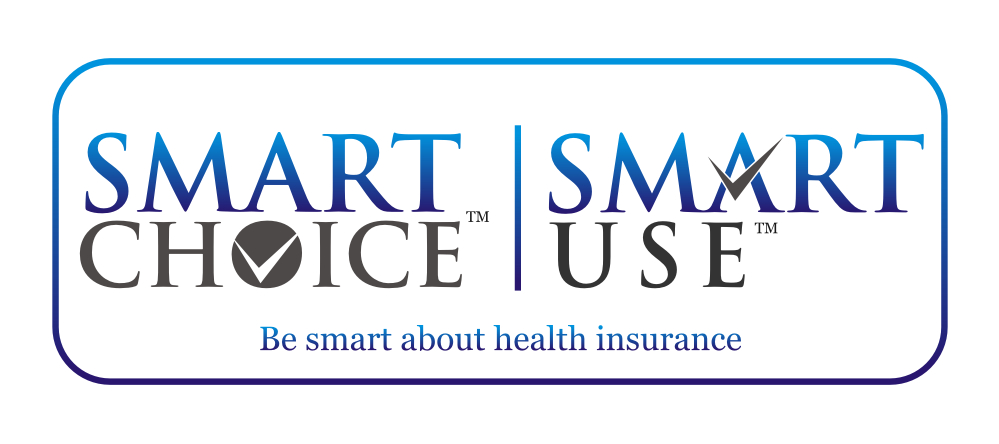
Welcome to the self-paced Smart Choice / Smart Use Health Insurance TM Certified Educator training program. This program will prepare you to conduct consumer programs using the Smart Choice / Smart Use Health Insurance TM modules. The programs are designed, tested and produced by the University of Maryland Extension and University of Delaware Cooperative Extension Health Insurance Literacy Initiative (HILI) team.
- Teacher: Jesse Ketterman
- Teacher: Maggie Wolen


This course is
restricted and only available to the University of Nevada Reno Extension Spiral
Up Academy participants.
In this session, we discuss professional characteristics,best practices, the teacher's role and unique professional growth needs and benefits. In this session, we discuss how to build positive peer interactions and develop collaborative relationships with colleagues.
- Teacher: Stephanie May
- Teacher: Danielle Pertile
- Teacher: Cathryn Peshlakai
- Teacher: Lisa Whipple


This course is
restricted and only available to the University of Nevada Reno Extension Spiral
Up Academy participants.
This training will focus on increasing an understanding of children development and milestones, strategies for supporting growth and development, recognizing developmental differences, and building family partnerships.
- Teacher: Stephanie May
- Teacher: Danielle Pertile
- Teacher: Cathryn Peshlakai
- Teacher: Monica Salazar
- Teacher: Lisa Whipple


This training focuses on how teachers prioritize time for connections and relationship-building with all young children and their families. Four strategies are introduced: increasing positive time, meaningful conversations, join in play and responsive interactions.
- Teacher: Stephanie May
- Teacher: Danielle Pertile
- Teacher: Cathryn Peshlakai
- Teacher: Monica Salazar
- Teacher: Lisa Whipple


This course is
restricted and only available to the University of Nevada Reno Extension Spiral
Up Academy participants.
This training will focus the importance of play, how children learn through play, the different types of play, creating play experiences that foster development, and providing developmentally appropriate materials to engage children in play.
- Teacher: Stephanie May
- Teacher: Danielle Pertile
- Teacher: Cathryn Peshlakai
- Teacher: Monica Salazar
- Teacher: Lisa Whipple


This course is
restricted and only available to the University of Nevada Reno Extension Spiral
Up Academy participants.
In this topic, we will explore how the following big ideas work together to create an effective learning environment for young children: Developing daily schedules and routines, Planning and implementing transitions and teaching expectations and rules.
- Teacher: Stephanie May
- Teacher: Danielle Pertile
- Teacher: Cathryn Peshlakai
- Teacher: Monica Salazar
- Teacher: Lisa Whipple


This course is
restricted and only available to the University of Nevada Reno Extension Spiral
Up Academy participants.
This training will identify what, when and how to teach social emotional skills and present strategies for positive guidance. Learning strategies for teaching children how to problem solve will be presented and discussed.
- Teacher: Stephanie May
- Teacher: Danielle Pertile
- Teacher: Cathryn Peshlakai
- Teacher: Monica Salazar
- Teacher: Lisa Whipple


This course is
restricted and only available to the University of Nevada Reno Extension Spiral
Up Academy participants.
This training focuses on professional development andfinding joy working with children and co-workers.
- Teacher: Stephanie May
- Teacher: Danielle Pertile
- Teacher: Cathryn Peshlakai
- Teacher: Monica Salazar
- Teacher: Lisa Whipple
This is a self-paced course designed specifically for farmers and ranchers seeking to take control of their tax planning. Whether you’re new to tax management or looking to refine your approach, this course provides practical strategies tailored to agricultural producers.
In this course, you will:
- Strengthen your collaboration with your tax professional to ensure clear communication and effective planning.
- Develop a reliable, organized record-keeping system that not only meets tax requirements but also helps you maximize eligible deductions and credits.
- Shift your perspective on taxes from simply minimizing what you owe to strategically optimizing your after-tax income for greater financial success.
- Teacher: Jessica Groskopf
- Teacher: Lindsey McKeever
associated weather events have altered road & trail construction
and maintenance.
0.5 Category 1 ceu; $10
- Teacher: Raymond Berthiaume

The goal of this toolbox is to equip agricultural professionals (I.e., ag-educators, extension professionals, crop consultants) with a broad understanding of AI and its potential role in sustainable agriculture, along with knowledge, skills and abilities to strategically communicate about this emerging technology and its risks and opportunities with agricultural audiences.
The instructional video course includes 10 asynchronous lectures and associated activities that can be engaged with at participants' convenience. Participants who complete all modules will receive a certificate of completion from Washington State University's Center for Sustaining Agriculture and Natural Resources.
This course is intended to be open, accessible and free-of-charge. No coursework is required for completion. However, the course is available for .3 Continuing Education Units (CEUs) with a $10 fee. If you take the course for CEUs, the pre- and post-survey must be completed to receive credit. Instructions for taking the course for CEUs are provided in the opening section of the course.
Participants will have the opportunity to:
- achieve a deeper awareness of AI in both society and sustainable agriculture;
- grow their understanding of the risks and benefits of using AI systems to achieve sustainable agriculture goals;
- develop knowledge of behavioral models predicting AI adoption among different audiences;
- obtain skills in utilizing strategic science communication theory to construct, frame and diffuse messages surrounding AI, its risks and opportunities;
- improve their confidence and abilities to facilitate engagement with AI in sustainable agriculture.
- Presenter: Alex Kirkpatrick
- Presenter: Morgan Lawrence
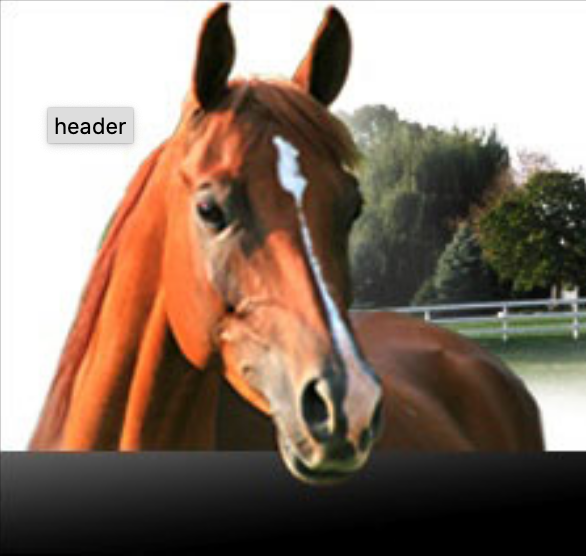
Understanding how a bit works in the horse's mouth will help you select the most appropriate bit for the job and appreciate the craftsmanship of well balanced and constructed bits.
The fee for this course is $10. To purchase and enroll in the course, click the following button.
If you purchase at least $40 worth of courses from this category, you can receive a 20% discount by entering the voucher code of HorseQuest20.
- Teacher: Kathy Anderson
- Teacher: Colleen Brady
- Teacher: Kris Hiney
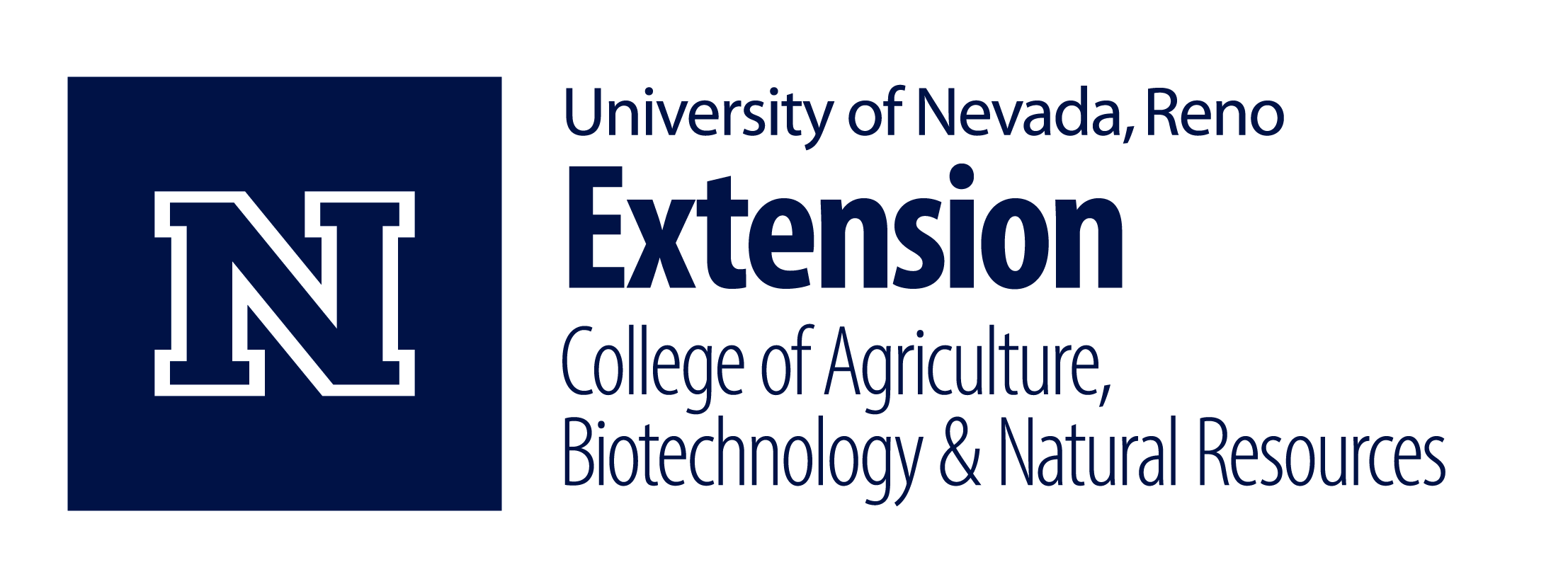

UNR 101 Signs and Symptoms of Illness (SOI) with Blood Borne Pathogens
Signs and Symptoms of Illness (SOI) including Blood Borne Pathogens: The Prevention and Control of Communicable Diseases in the Child Care Setting is for child care providers and early childhood educator.
This training discusses ways to recognize, prevent, and manage infectious diseases in early education and child care settings. Special precautions are discussed when handling bloodborne pathogens.
Course fee: $10.99 2-hours
Watch this video to learn how to create an account and pay for the course.
For Technical support email: campushelp@extension.org
Instructor email: childcare@unr.edu
- Teacher: Maria Jake
- Teacher: Stephanie May
- Teacher: Danielle Pertile
- Teacher: Cathryn Peshlakai
- Teacher: Lisa Whipple
- Teacher: Sarah Wright


UNR 102 Recognize and Reporting Child Abuse and Neglect
The focus of this course is to help childcare providers become familiar with the difficult subject of child abuse and neglect. In this course you will learn about:
There are 9 lesson in this course.
- Overview
- Physical Abuse
- Neglect
- Emotional Abuse
- Sexual Abuse
- Who are the abusers
- Disclosure
- Reporting
- Program Policies
View this video to learn how to create and account and pay for the course,
For Technical support email campushelp@extension.org
Instructor email: childcare@unr.edu
- Teacher: Maria Jake
- Teacher: Stephanie May
- Teacher: Danielle Pertile
- Teacher: Cathryn Peshlakai
- Teacher: Lisa Whipple
- Teacher: Sarah Wright


UNR 103 Sudden Infant Death Syndrome (SIDS)
Reducing the Risks of Sudden Infant Death Syndrome (SIDS)training is for Child Care Providers and Early Childhood Educators. This training discusses ways to lower the risk of SIDS in child care settings, addresses common beliefs, safe sleep practices, handling parent’s concerns and why some babies are at a higher risk for SIDS. This training promotes “Back to Sleep” and “Tummy to Play”.This training has been approved by Nevada Registry and the State of Maryland, Office of Child Care.
Course fee: $10.99 2-hours
Watch the following video to learn how to create an account and pay for the course.
For Technical support email: campusadmin@extension.org
Instructor email: childcare@unr.edu
- Teacher: Maria Jake
- Teacher: Stephanie May
- Teacher: Danielle Pertile
- Teacher: Cathryn Peshlakai
- Teacher: Lisa Whipple
- Teacher: Sarah Wright


UNR 104 Basic Wellness: Physical Activities, Nutrition and Obesity Prevention
Wellness-Physical Activities, Nutrition and Obesity Prevention is for Early Childhood Educators working with children Birth to 8 years. This training focuses on lifelong wellness related to childhood physical activity, nutrition and obesity prevention in the early childhood environment. The course contains age and developmental levels.
Course fee: $10.99 2-hours
Watch the following video to learn how to create an account and pay for the course.
For Technical support email: campushelp@extension.org
Instructor email: childcare@unr.edu
- Teacher: Maria Jake
- Teacher: Stephanie May
- Teacher: Danielle Pertile
- Teacher: Cathryn Peshlakai
- Teacher: Lisa Whipple
- Teacher: Sarah Wright


UNR 105 Wellness: Nutrition and Obesity Prevention in Young Children
Level: Intermediate
As we explore this subject, we’ll focus on the importance of wellness, nutrition and obesity prevention, especially at the intermediate level. Our goal is to equip you with knowledge that can make a lasting impact on children’s health.
Course fee: $10.99 2-hours
Watch this video to learn how to create an account and pay for a course.
For Technical support email: campushelp@extension.org
Instructor email: childcare@unr.edu
- Teacher: Maria Jake
- Teacher: Stephanie May
- Teacher: Danielle Pertile
- Teacher: Cathryn Peshlakai
- Teacher: Lisa Whipple
- Teacher: Sarah Wright


Course fee: $10.99 2-hours
Watch this video to learn how to create an account and pay for the course. .
For Technical support email: campushelp@extension.org
Instructor email: childcare@unr.edu
- Teacher: Maria Jake
- Teacher: Stephanie May
- Teacher: Danielle Pertile
- Teacher: Cathryn Peshlakai
- Teacher: Lisa Whipple
- Teacher: Sarah Wright


UNR 107 Child Development: Birth to three Years
This module will focus on the first three years of a child's life, when there is an enormous amount of growth and development. Our role in supporting children's progress is critical. What each of us does makes a difference. Topics include: Brain Development, Developmental Domains, the Role of the Teacher and Positive Interactions.
Course fee: $5.99 1-hour
Watch this video to learn how to create an account and pay for the course.
For Technical support email: campushelp@extension.org
Instructor email: childcare@unr.edu
- Teacher: Maria Jake
- Teacher: Stephanie May
- Teacher: Danielle Pertile
- Teacher: Cathryn Peshlakai
- Teacher: Lisa Whipple
- Teacher: Sarah Wright


UNR 108 Child Development: Three to Five Years
This module will focus on the preschool years ages three to five, when there is an enormous amount of growth and development. Our role in supporting children's progress is critical. What each of us does makes a difference. Topics include: Brain Development, Developmental Domains, the Role of the Teacher and Positive Interactions.
Course fee: $5.99 1-hour
For Technical support email: campushelp@extension.org
Instructor email: childcare@unr.edu
- Teacher: Maria Jake
- Teacher: Stephanie May
- Teacher: Danielle Pertile
- Teacher: Cathryn Peshlakai
- Teacher: Lisa Whipple
- Teacher: Sarah Wright


UNR 109 Child Development: Positive Guidance
This module will present the goals of positive guidance, misunderstandings about guidance, key practices, effective environments, common behavior challenges and offer positive guidance strategies for the classroom
Course fee: $5.99 1-hour
Technical support email: campushelp@extension.org
Instructor email: childcare@unr.edu
- Teacher: Maria Jake
- Teacher: Stephanie May
- Teacher: Danielle Pertile
- Teacher: Cathryn Peshlakai
- Teacher: Lisa Whipple
- Teacher: Sarah Wright


UNR 110 Emergency Preparedness for Early Childhood Programs
Being prepared for emergencies can make a big difference as to whether or not the children in your care and the staff in your program remain safe. In this course, you will learn about the necessary steps a program should take to ensure preparedness in the event of an emergency, as well as effective strategies to communicate your emergency plan to children, parents and staff.
For Technical support email: campushelp@extension.org
Instructor support email: childcare@unr.edu- Teacher: Maria Jake
- Teacher: Stephanie May
- Teacher: Danielle Pertile
- Teacher: Cathryn Peshlakai
- Teacher: Lisa Whipple
- Teacher: Sarah Wright


UNR 111 Medication Administration and the Prevention of and
Response to Food and Other Allergies in the Child Care Environment
This course is designed to provide childcare providers with information that will help safely administer medications to children in your program. This course is for childcare providers who administer medication to children but are not licensed health care professionals.
Course Fee: No charge
For Technical support email campushelp@extension.org
Instructor email: childcare@unr.edu
- Teacher: Maria Jake
- Teacher: Stephanie May
- Teacher: Danielle Pertile
- Teacher: Cathryn Peshlakai
- Teacher: Lisa Whipple
- Teacher: Sarah Wright


UNR 112 Prevention of Shaken Baby Syndrome and Abusive Head Trauma
This training describes causes, symptoms and consequences of Shaken Baby Syndrome/Abusive Head Trauma (SBS/AHT). The lesson further provides information on caring for a crying baby and how to cope with a baby who cries inconsolably.
Course Fee: No Charge
For Technical support, email: campushelp@extension.org
Instructor email: childcare@unr.edu
- Teacher: Maria Jake
- Teacher: Stephanie May
- Teacher: Danielle Pertile
- Teacher: Cathryn Peshlakai
- Teacher: Lisa Whipple
- Teacher: Sarah Wright


UNR 113 Transportation Safety
This course presents recommended practices and policies for the safe transport of young children to and from childcare programs.
Course fee: No charge
For Technical support email: campushelp@extension.org
Instructor email: childcare@unr.edu
- Teacher: Stephanie May
- Teacher: Danielle Pertile
- Teacher: Cathryn Peshlakai
- Teacher: Monica Salazar
- Teacher: Lisa Whipple
- Teacher: Sarah Wright

Building and Physical Premises Safety Including the Storage and
Handling of Bio-Contaminants and Hazardous Materials
This training can be taken to meet the initial training requirement for Building and Physical Premises Safety approved by NV Registry.
Course fee: No charge
For Technical support email: campushelp@extension.org
Instructor email: childcare@unr.edu
- Teacher: Stephanie May
- Teacher: Danielle Pertile
- Teacher: Cathryn Peshlakai
- Teacher: Monica Salazar
- Teacher: Chelsie Shurtleff
- Teacher: Lisa Whipple
- Teacher: Sarah Wright


UNR 115 Supporting Young Dual Language Learners
This training will provide participants with an understanding of young children who are dual language learners. We will explore the developmental domains and the stages of language development. Strategies will be presented for supporting home language and teaching strategies in the classroom.
Course fee: $5.99 1-hour
For Technical support email: campushelp@extension.org
Instructor email: childcare@unr.edu
- Teacher: Desiree Cabacar
- Teacher: Savannah Castanon
- Teacher: Maria Jake
- Teacher: Cathryn Peshlakai
- Teacher: Erin Skaggs
- Teacher: Lisa Whipple
- Teacher: Sarah Wright


UNR 116 Safe Practices with Infants and Toddlers
Ensuring the well-being of infants and toddlers requires careful attention to key areas such as nutrition, feeding techniques, and sleep safety. These foundational aspects not only support healthy development but also create a secure environment for young children to thrive.
Course fee: $5.99 1-hour
For Technical support email: campushelp@extension.org
Instructor email: childcare@unr.edu
- Teacher: Cathryn Peshlakai
- Teacher: Lisa Whipple
- Teacher: Sarah Wright


UNR 117 Family Engagement in Early Childhood
This training is designed
to guide educators of young children to establish and maintain open and
cooperative relationships with each child’s family. The course will focus on
effective communication, policies which promote cooperative relationships, and support
for families.
Topics will include
family involvement, conflict with families, conferences and community
resources.
Course fee: $5.99 1-hour
For Technical support email: campushelp@extension.org
Instructor email: childcare@unr.edu
- Teacher: Cathryn Peshlakai
- Teacher: Lisa Whipple
- Teacher: Sarah Wright


The Pyramid Model 100 is a comprehensive, resource for implementing the Pyramid Model for Promoting Social Emotional Competence in young children. Developed by leading experts including Mary Louise Hemmeter, Lise Fox, and Michaelene Ostrosky, it translates decades of research into actionable strategies for providers working with young children.
UNR-EC Pyramid Model 100 Fee: $5.99- Teacher: Cathryn Peshlakai
- Teacher: Lisa Whipple


UNR-EC Pyramid Model 200- Building Collaborative Relationships
The Pyramid Model 200 is a comprehensive, resource for implementing the Pyramid Model for Promoting Social Emotional Competence in young children. Developed by leading experts including Mary Louise Hemmeter, Lise Fox, and Michaelene Ostrosky, it translates decades of research into actionable strategies for providers working with young children.
UNR-EC Pyramid Model 200 Fee: $5.99
This course will issue a certificate for 1 hour of Nevada Registry approved training.
- Teacher: Cathryn Peshlakai
- Teacher: Lisa Whipple


UNR-EC Pyramid Model 300-
Environments, Schedules and Routines
The Pyramid Model is a comprehensive, resource for implementing the Pyramid Model for Promoting Social Emotional Competence in young children. Developed by leading experts including Mary Louise Hemmeter, Lise Fox, and Michaelene Ostrosky, it translates decades of research into actionable strategies for providers working with young children.
UNR-EC Pyramid Model 300 Fee: $5.99
This course will issue a certificate for 1 hour of Nevada Registry approved training.
- Teacher: Cathryn Peshlakai
- Teacher: Lisa Whipple


UNR-EC Pyramid Model 400-
Transitions, Expectations and Rules
The Pyramid Model is a comprehensive, resource for implementing the Pyramid Model for Promoting Social Emotional Competence in young children. Developed by leading experts including Mary Louise Hemmeter, Lise Fox, and Michaelene Ostrosky, it translates decades of research into actionable strategies for providers working with young children.
UNR-EC Pyramid Model 400 Fee: $5.99
This course will issue a certificate for 1 hour of Nevada Registry approved training.
- Teacher: Cathryn Peshlakai
- Teacher: Lisa Whipple


UNR-EC Pyramid Model 500- Promoting Child Engagement and
Using Positive Descriptive Feedback
The Pyramid Model 500 is a comprehensive, resource for implementing the Pyramid Model for Promoting Social Emotional Competence in young children. Developed by leading experts including Mary Louise Hemmeter, Lise Fox, and Michaelene Ostrosky, it translates decades of research into actionable strategies for providers working with young children.
UNR-EC Pyramid Model 500 Fee: $5.99
This course will issue a certificate for 1 hour of Nevada Registry approved training.
- Teacher: Cathryn Peshlakai
- Teacher: Lisa Whipple


UNR-EC Pyramid Model 600 Teaching Strategies and Emotional Literacy
The Pyramid Model Bundle is a comprehensive, resource for implementing the Pyramid Model for Promoting Social Emotional Competence in young children. Developed by leading experts including Mary Louise Hemmeter, Lise Fox, and Michaelene Ostrosky, it translates decades of research into actionable strategies for providers working with young children.
UNR-EC Pyramid Model 600 Fee: $5.99
This course will issue a certificate for 1 hour of Nevada Registry approved training.
- Teacher: Cathryn Peshlakai
- Teacher: Lisa Whipple
- Teacher: Sarah Wright


UNR-EC Pyramid Model 700-
Friendship Skills and Social Problem Solving
The Pyramid Model Bundle is a comprehensive, resource for implementing the Pyramid Model for Promoting Social Emotional Competence in young children. Developed by leading experts including Mary Louise Hemmeter, Lise Fox, and Michaelene Ostrosky, it translates decades of research into actionable strategies for providers working with young children.
UNR-EC Pyramid 700 Fee: $5.99
This course will issue a certificate for 1 hour of Nevada Registry approved training.
- Teacher: Cathryn Peshlakai
- Teacher: Lisa Whipple


UNR-EC Pyramid Model 800 Understanding, Preventing and
Responding to Challenging Behavior
The Pyramid Model training is a comprehensive, resource for implementing the Pyramid Model for Promoting Social Emotional Competence in young children. Developed by leading experts including Mary Louise Hemmeter, Lise Fox, and Michaelene Ostrosky, it translates decades of research into actionable strategies for providers working with young children.
UNR-EC Pyramid Fee: $5.99
This course will issue a certificate for 1 hour of Nevada Registry approved training.
- Teacher: Cathryn Peshlakai
- Teacher: Lisa Whipple
- Teacher: Amy Miller
The audience for this course includes Vermont custom manure applicator business owners and employees and interested ag service providers.
As a result of taking this course, participants will learn about Vermont’s Required Agricultural Practices (RAPs), regulatory requirements for custom manure applicators in Vermont, nutrient management plans as they relate to custom applicators, and record-keeping requirements. This course includes videos which requires a good internet connection.
For more information, suggestions, or feedback: Lindsey Ruhl, University of Vermont Extension, lindsey.ruhl@uvm.edu.
- Teacher: Susan Brouillette
- Teacher: Lindsey Ruhl
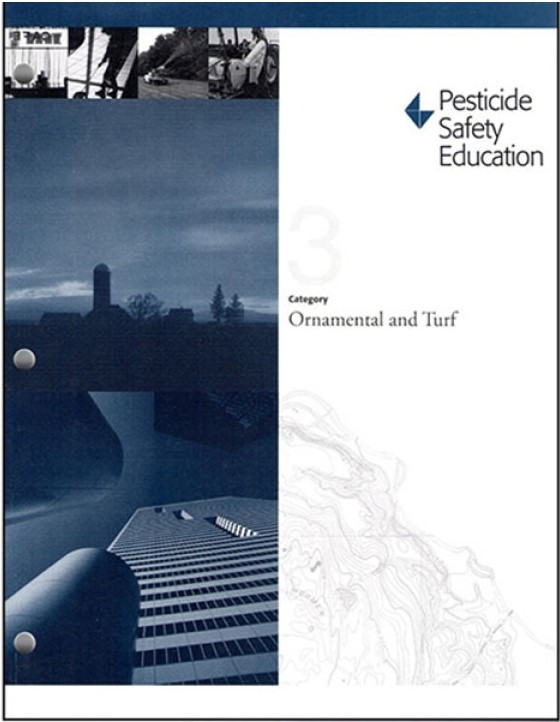
- This course is for anyone wishing a Vermont* 3B Turf pesticide applicator license: landscapers, golf course supervisors and employees, sport field groundskeepers, pest control operators, government or municipal employees, university employees, etc.
- This course is not intended as a substitute for study of the manual and inserts.
- This course does not provide recertification credit. Please see related Vermont Pesticide Safety Education course offerings for recertification credits.
For more information please contact Sarah Kingsley-Richards at sarah.kingsley@uvm.edu.
Presented by University of Vermont Extension Pesticide Safety Education Program and the Vermont Agency of Agriculture, Food & Markets. [Published 2024]
*NOTE: Anyone using the Category 3 Ornamental and Turf manual for other state pesticide applicator certification may also use this review. Please check with your state certifying agency for local laws, regulations, and additional required study materials.
The fee for this course is $40. To purchase and enroll in the course, click the following button:
- Teacher: Sarah Kingsley-Richards
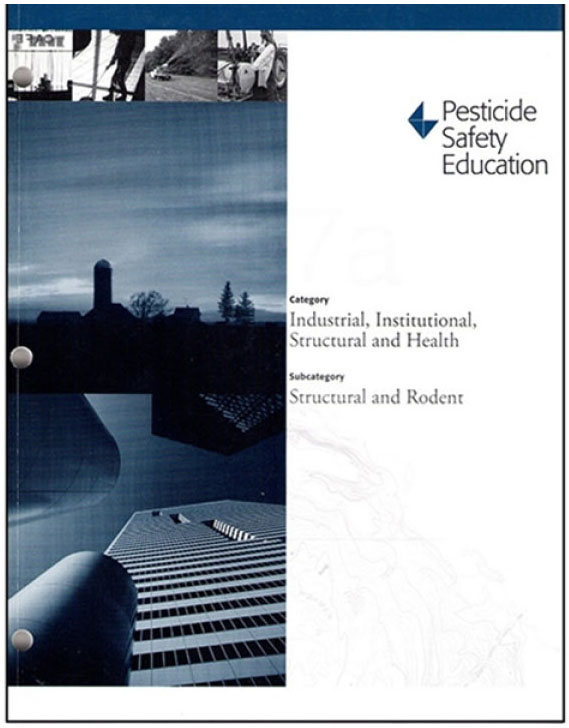
- This course is for anyone wishing a Vermont* 7A General (Structural) Pest Control pesticide applicator license: pest control operators, government or municipal employees, university employees, etc.
- This course is not intended as a substitute for study of the manual and inserts (see list below).
- This course does not provide recertification credit. Please see related Vermont Pesticide Safety Education course offerings for recertification credits.
For more information please contact Sarah Kingsley-Richards at sarah.kingsley@uvm.edu.
Presented by University of Vermont Extension Pesticide Safety Education Program and the Vermont Agency of Agriculture, Food & Markets. [Published 2020]
*NOTE: Anyone using the Category 7a Subcategory Structural and Rodent manual for other state pesticide applicator certification may also use this review. Please check with your state certifying agency for local laws, regulations, and additional required study materials.
The fee for this course is $40. To purchase and enroll in the course, click the following button:
- Teacher: Sarah Kingsley-Richards
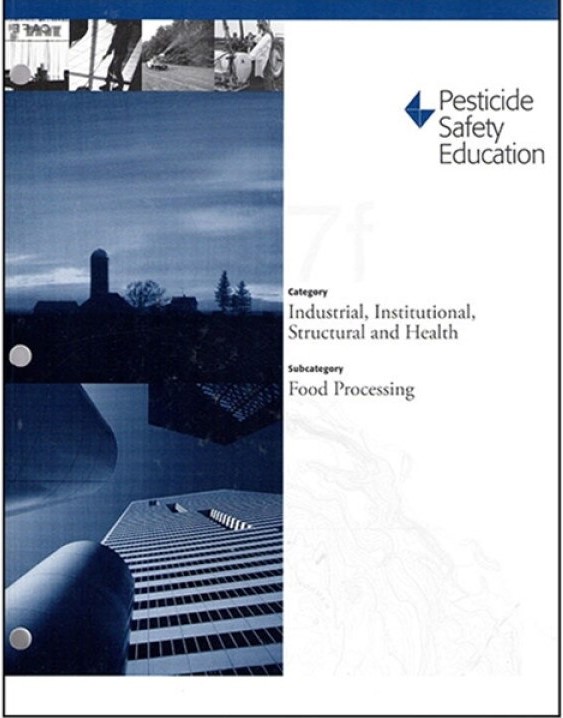
- This course is for anyone wishing a Vermont* 7C Food Processing pesticide applicator license: pest control operators and employees in bakeries, dairy product processing, canning and frozen food packing, confection manufacturing, meat product processing plants, restaurant kitchens, cafeteria kitchens, food hubs, etc.
- This course is not intended as a substitute for study of the manual and inserts (see list below).
- This course does not provide recertification credit. Please see related Vermont Pesticide Safety Education course offerings for recertification credits.
For more information please contact Sarah Kingsley-Richards at sarah.kingsley@uvm.edu.
Presented by University of Vermont Extension Pesticide Safety Education Program and the Vermont Agency of Agriculture, Food & Markets. [Published 2024]
*NOTE: Anyone using the Category 7f Subcategory Food Processing manual for other state pesticide applicator certification may also use this review. Please check with your state certifying agency for local laws, regulations, and additional required study materials.The fee for this course is $40. To purchase and enroll in the course, click the following button:
- Teacher: Sarah Kingsley-Richards
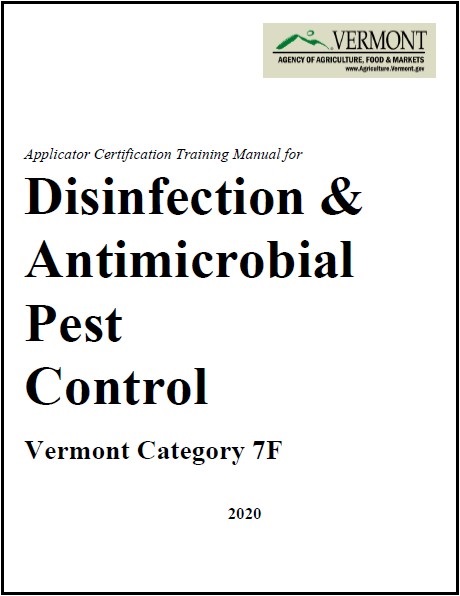
- This course is for anyone wishing a Vermont* 7F Disinfection & Antimicrobial Pest Control pesticide applicator license (required to perform disinfecting or sanitizing services to the property of others using an EPA registered pesticide): pest control operators, government or municipal employees, university employees, etc.
- This course is not intended as a substitute for study of the manual and inserts (see list below).
- This course does not provide recertification credit. Please see related Vermont Pesticide Safety Education course offerings for recertification credits.
For more information please contact Sarah Kingsley-Richards at sarah.kingsley@uvm.edu.
Presented by University of Vermont Extension Pesticide Safety Education Program and the Vermont Agency of Agriculture, Food & Markets. [Published 2022]
*NOTE: Anyone using the Vermont Category 7F Disinfection & Antimicrobial Pest Contro manual for other state pesticide applicator certification may also use this review. Please check with your state certifying agency for local laws, regulations, and additional required study materials.The fee for this course is $30. To purchase and enroll in the course, click the following button:
- Teacher: Sarah Kingsley-Richards
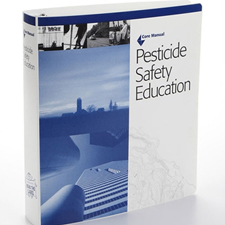
Anyone in the state of Vermont who uses, supervises, recommends, or
sells pesticides and/or trains Worker Protection Standard
handlers/workers may be required to take and pass the CORE exam and all
appropriate category exams to become certified. Certification is
administered by the Vermont Agency of Agriculture, Food & Markets to
ensure that pesticides are used in a proper and legal manner.
- This course is for anyone wishing a Vermont pesticide applicator license: nursery employees, landscapers, farmers, agricultural employers (WPS compliance), garden center employees, pest control operators, government or municipal employees, university employees, etc.
- This course is not intended as a substitute for study of the CORE manual and inserts.
- This course does not provide recertification credit. Please see related Vermont Pesticide Safety Education course offerings for recertification credits.
For more information please contact Sarah Kingsley-Richards at sarah.kingsley@uvm.edu.
Presented by University of Vermont Extension Pesticide Safety Education Program and the Vermont Agency of Agriculture, Food & Markets. [Published 2018]
NOTE: Anyone using the Northeast CORE Manual, 3rd Edition, for other state pesticide applicator certification may also use this review. Vermont-specific laws and regulations do not apply to other state certification; Vermont-specific information may be skipped over in this review. Please check with your state certifying agency for local laws, regulations, and additional required study materials.
The fee for this course is $40. To purchase and enroll in this course, click the following link:
- Teacher: Sarah Kingsley-Richards
As a result of taking this course, participants will learn about Vermont’s Required Agricultural Practices (RAPs), how to take a soil sample and interpret results, how to take a manure sample and interpret results, field by field nutrient management planning, record-keeping requirements, and how to calibrate manure spreaders. This course includes videos, resources, references, and worksheets.
For more information or to enroll contact: Lindsey Ruhl, University of Vermont Extension, lindsey.ruhl@uvm.edu.
This course has been made possible with generous funding from the Vermont Agency of Agricultural Food and Markets Clean Water Initiative Grant, "Innovative Training Tools to Help Small Farm Operations Comply with Required Agricultural Practices," grant #02200-ARM-CWF-2017-UVM.
- Teacher: Lindsey Ruhl
Washington State 4-H Volunteer Orientation is an online course designed to orient new 4-H volunteers. Participants will learn:
- Volunteer Roles & Relationships
- Positive Youth Development
- Youth/Adult Partnerships
- Safe & Inclusive Environments
- Learn by Doing
For more information contact Jana S. Ferris, Washington State University, ferrisj@wsu.edu
- Teacher: Jana Ferris
The audience for this course is:
Washington State 4-H Club Leaders
Washington State 4-H Club Treasurers
- Teacher: Jana Ferris
- Teacher: Jana Ferris
The audience for this course is: Crop producers, handlers, and anyone interested in food safety
By taking this course, students will learn:
Basic microbiology concepts, where pathogens come from and be able to explain where pathogens can be found and how they can contaminate fresh produce.
For more information or to enroll please contact:
- Teacher: Paul Goeringer
- Teacher: Jill Goedeken
The audience for this course is:
By taking this course, students will learn:
For more information or to enroll please contact:
- Teacher: Jana Ferris
